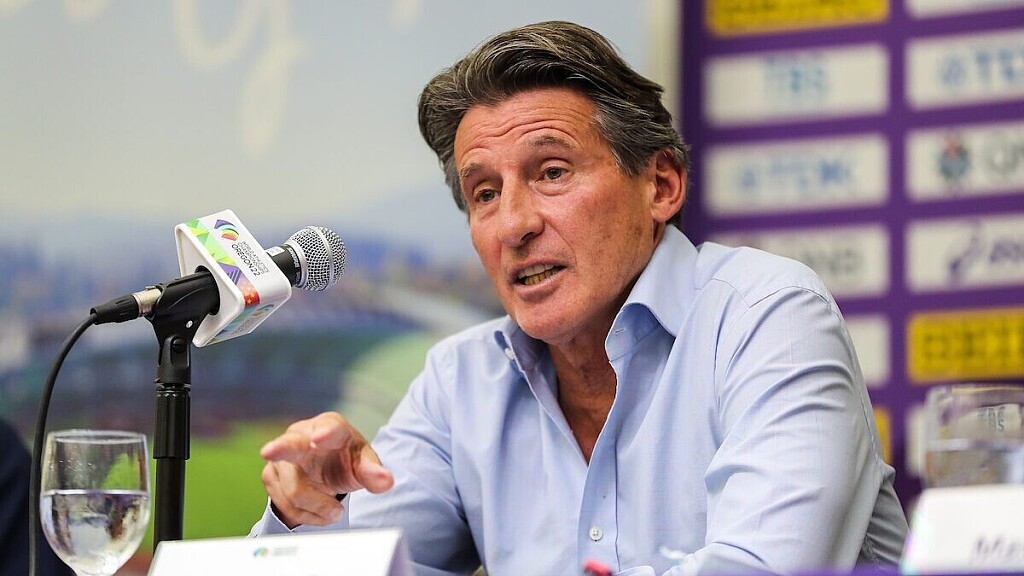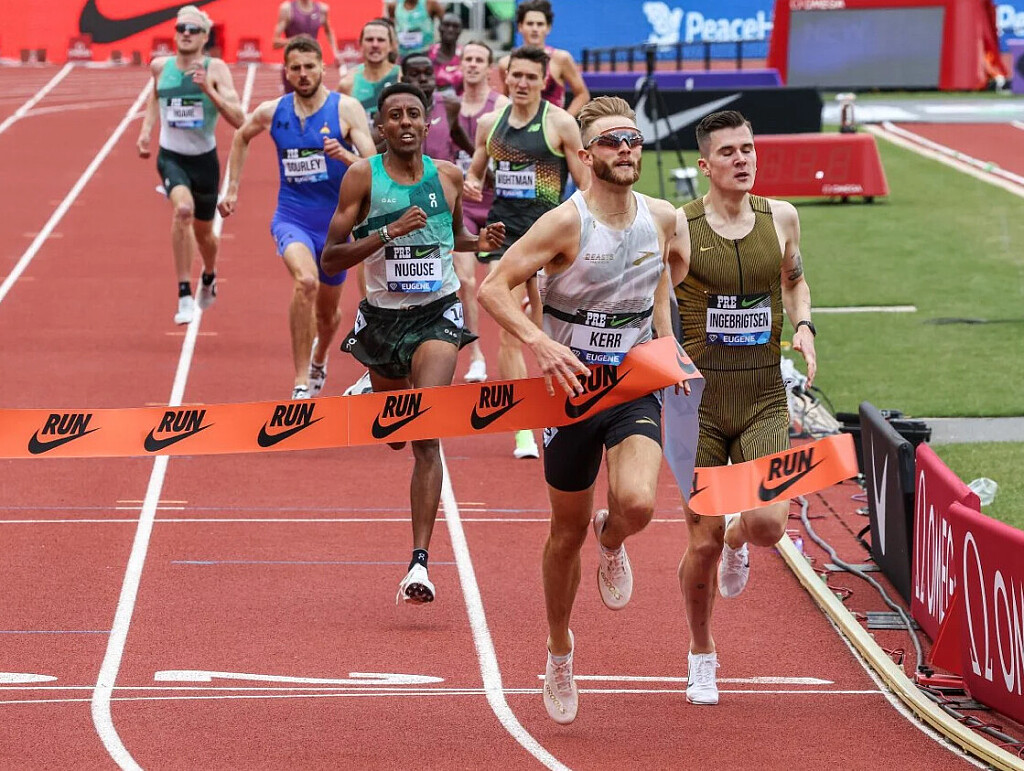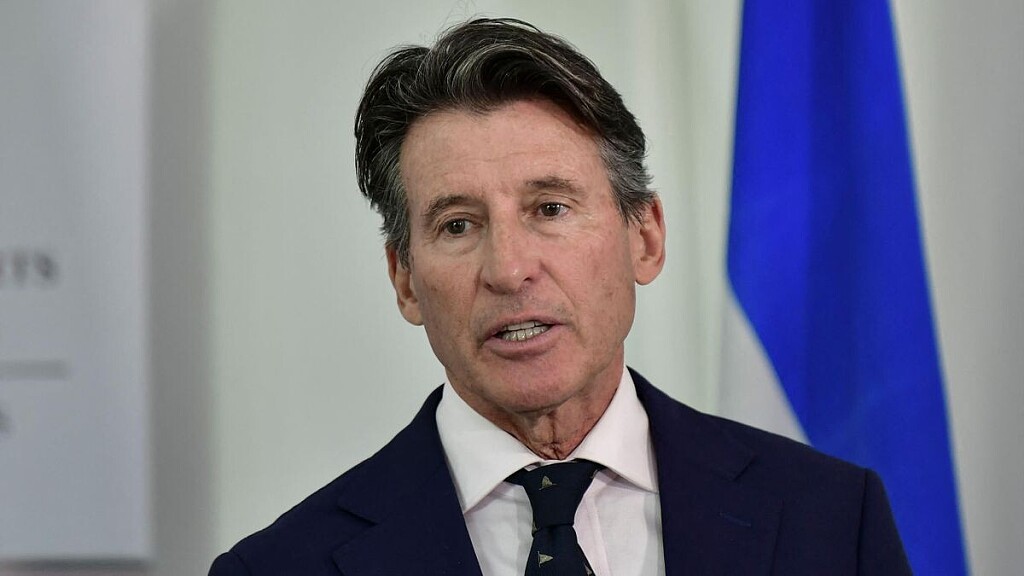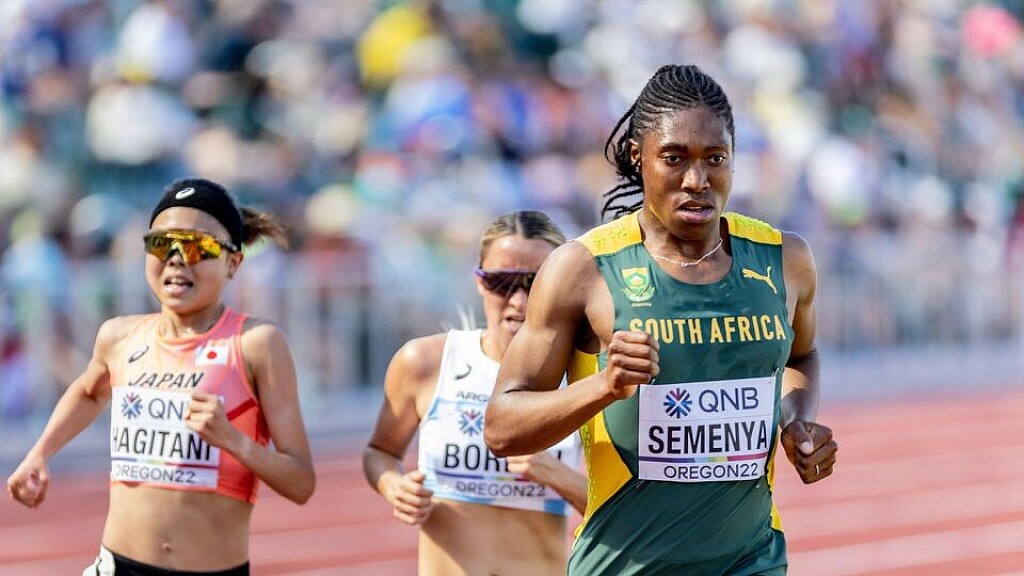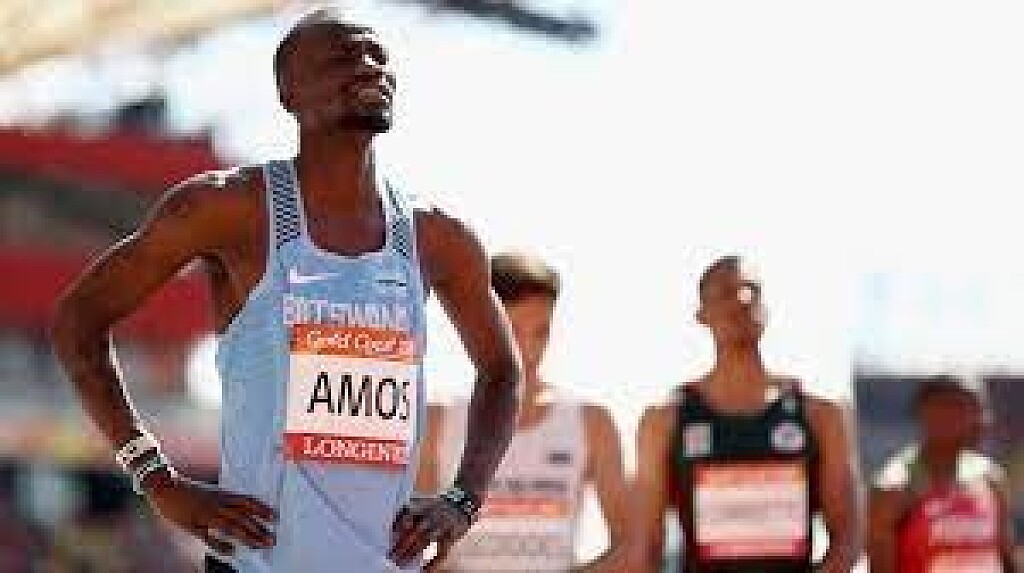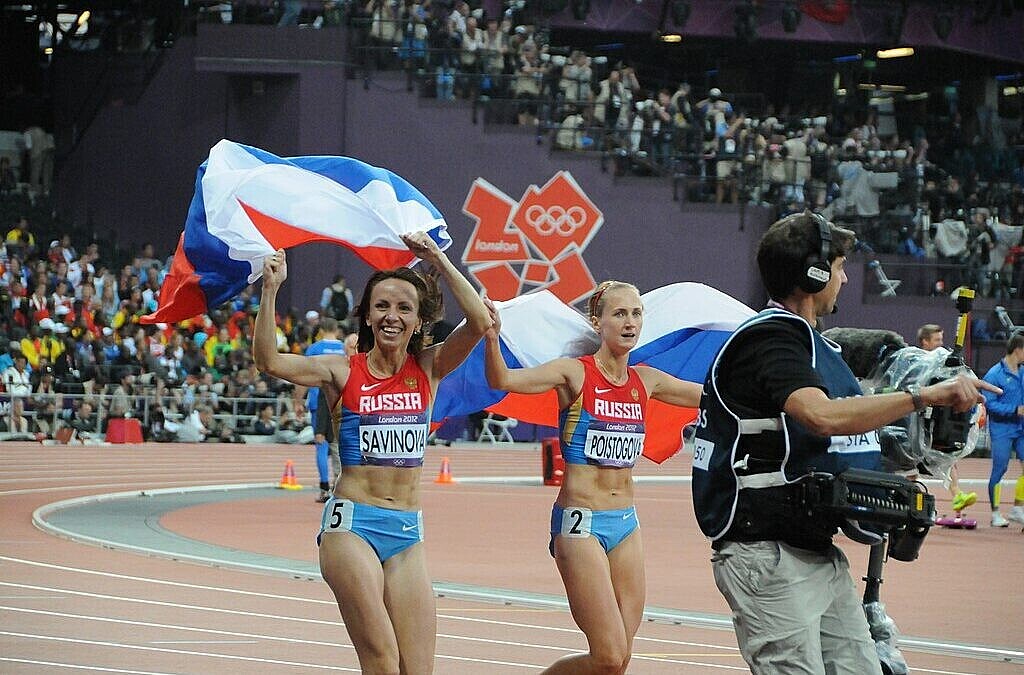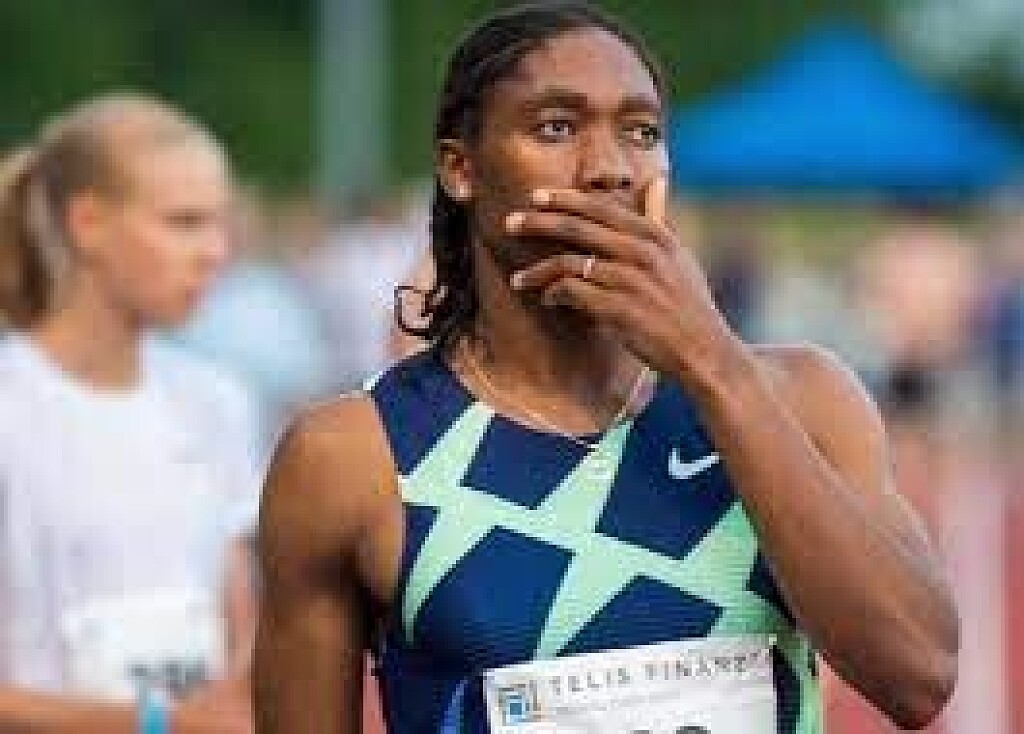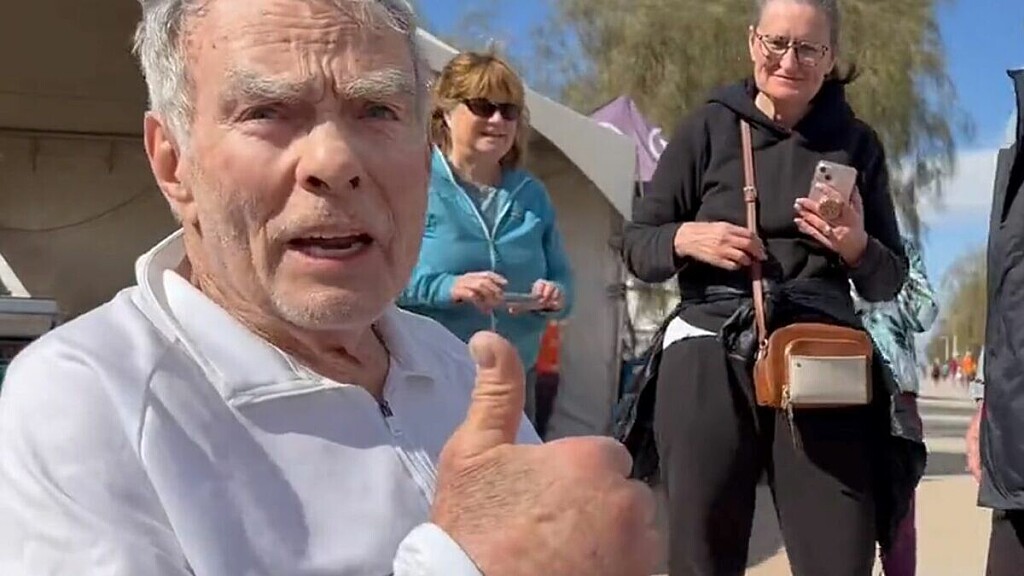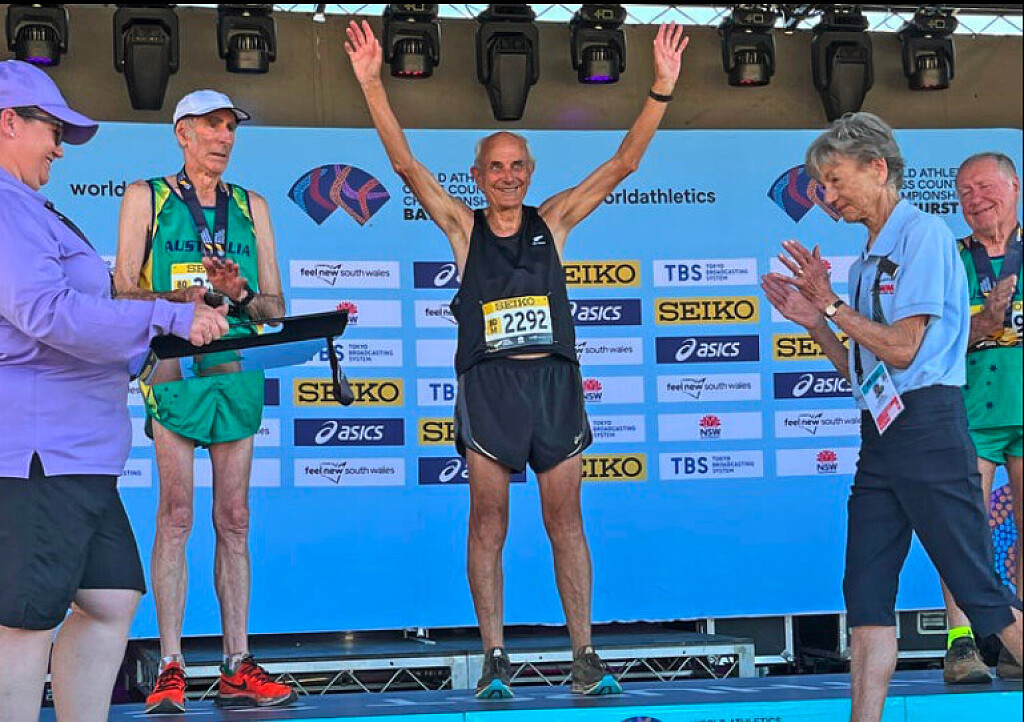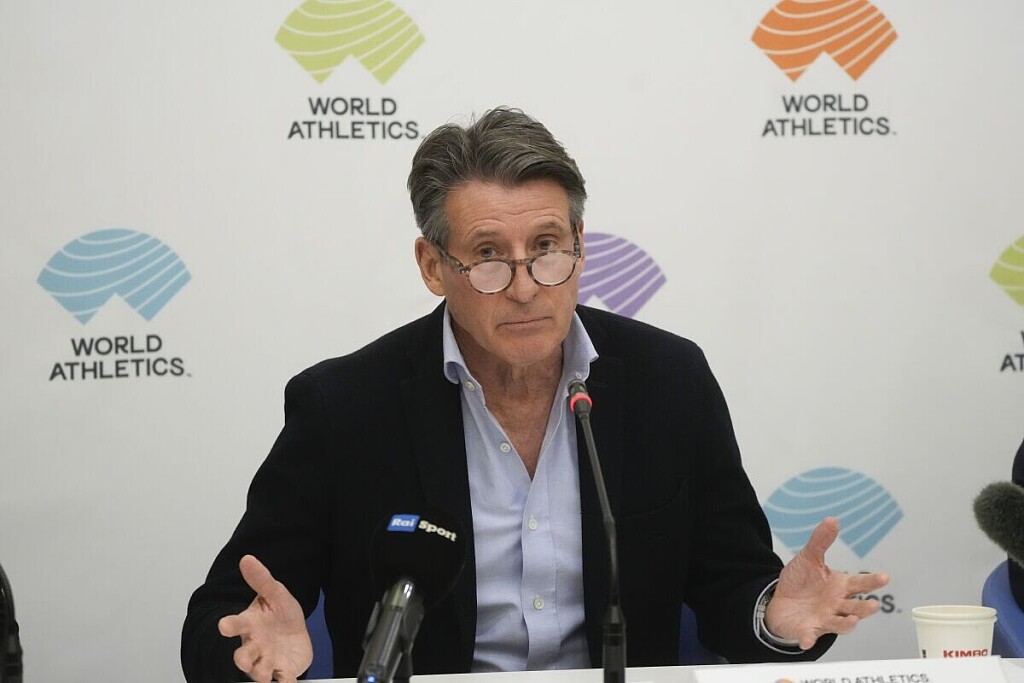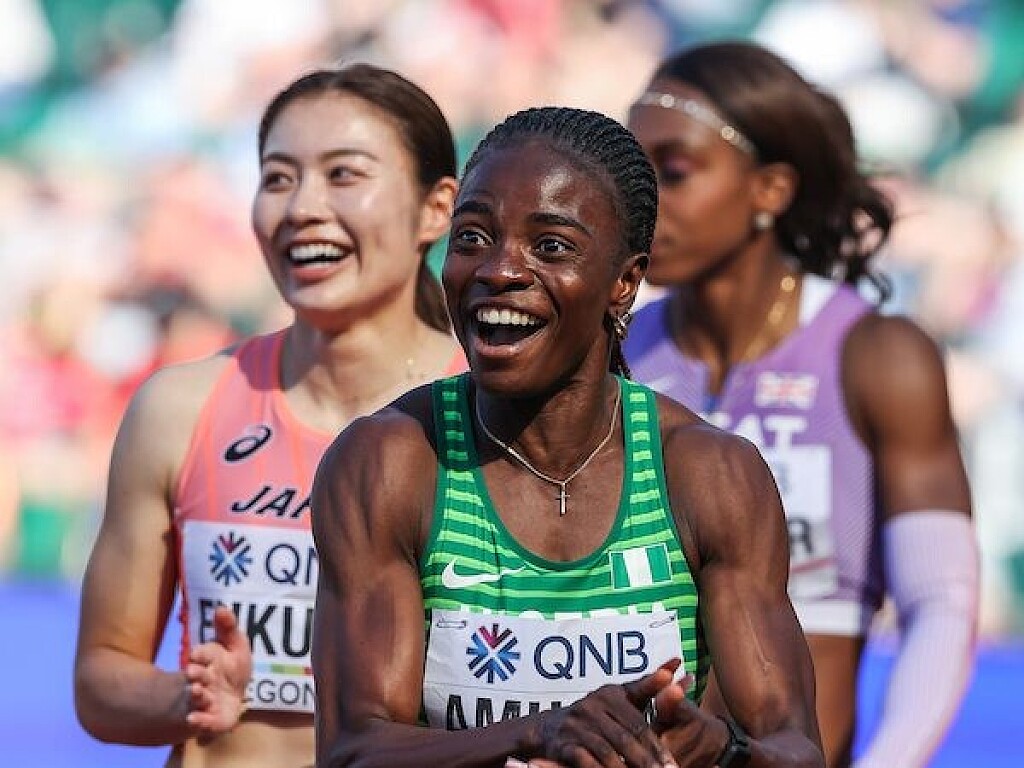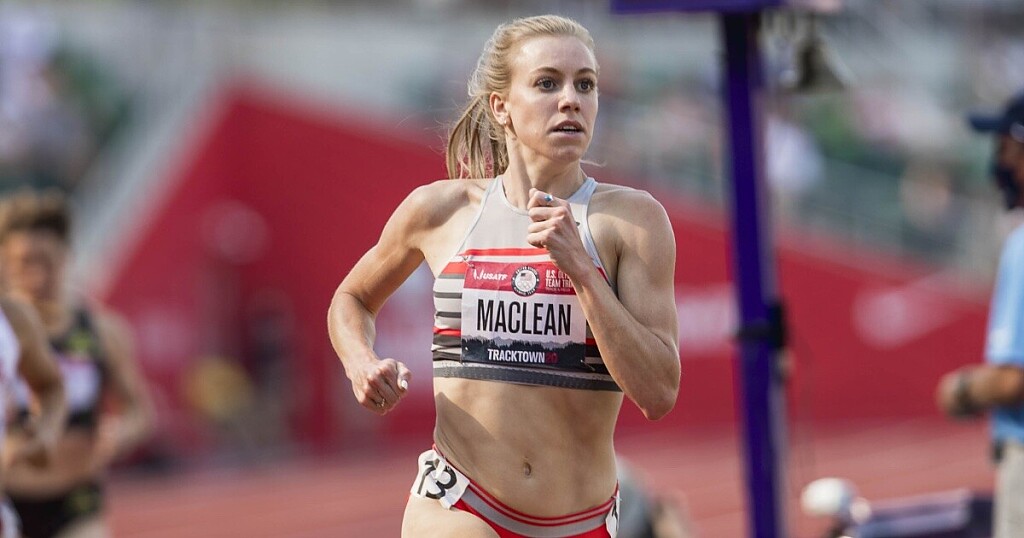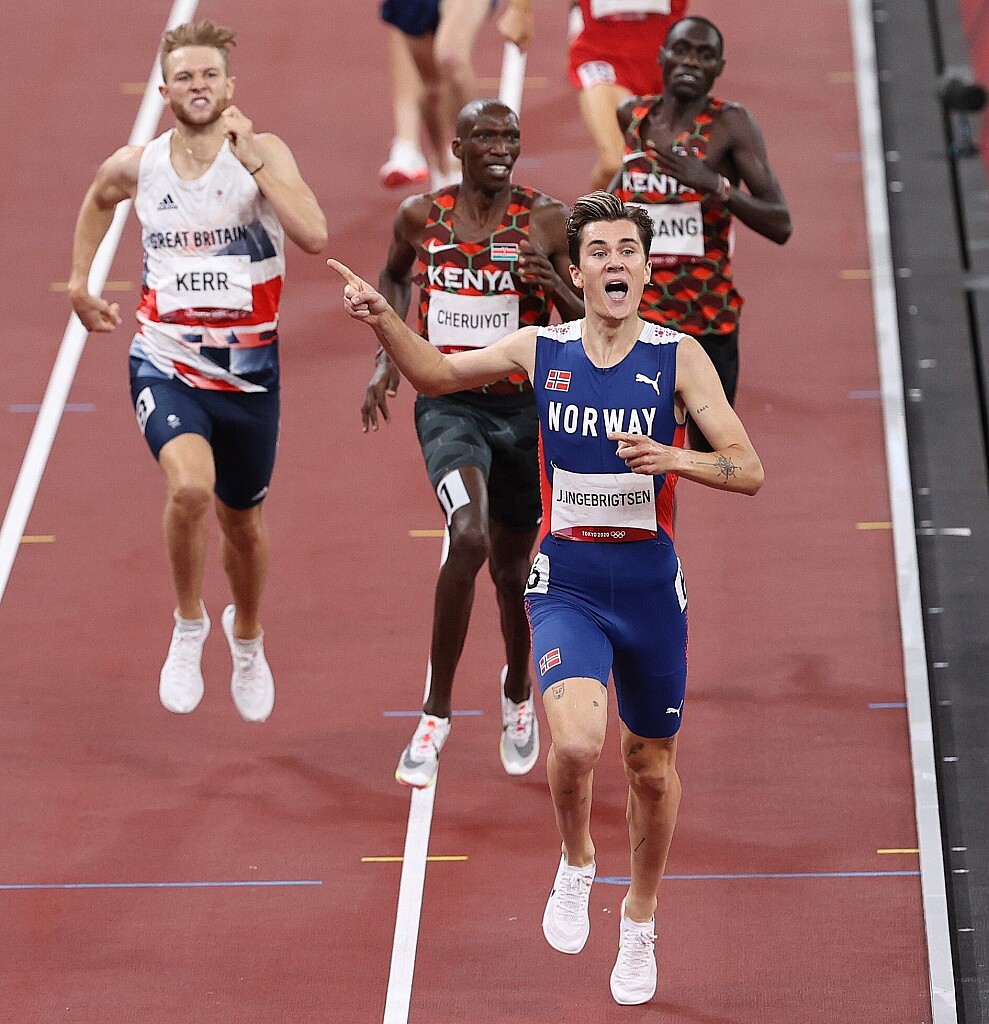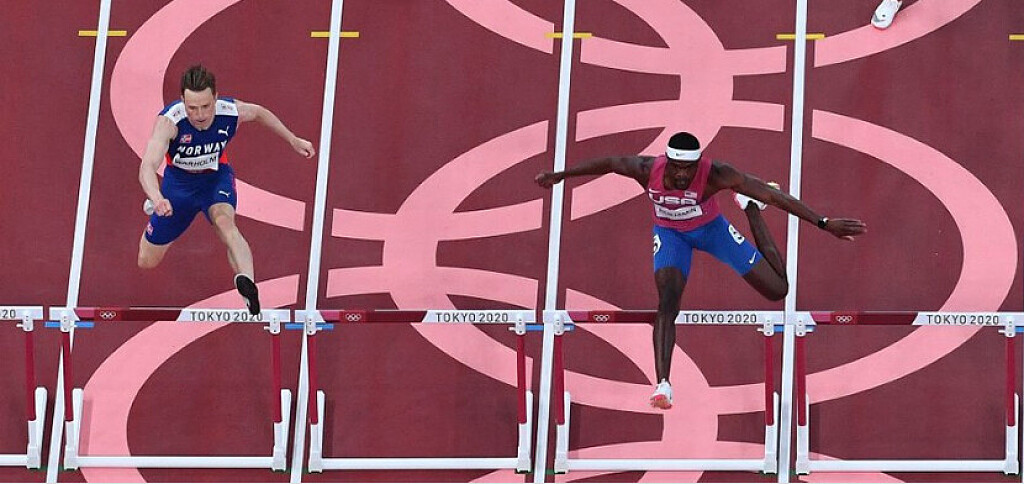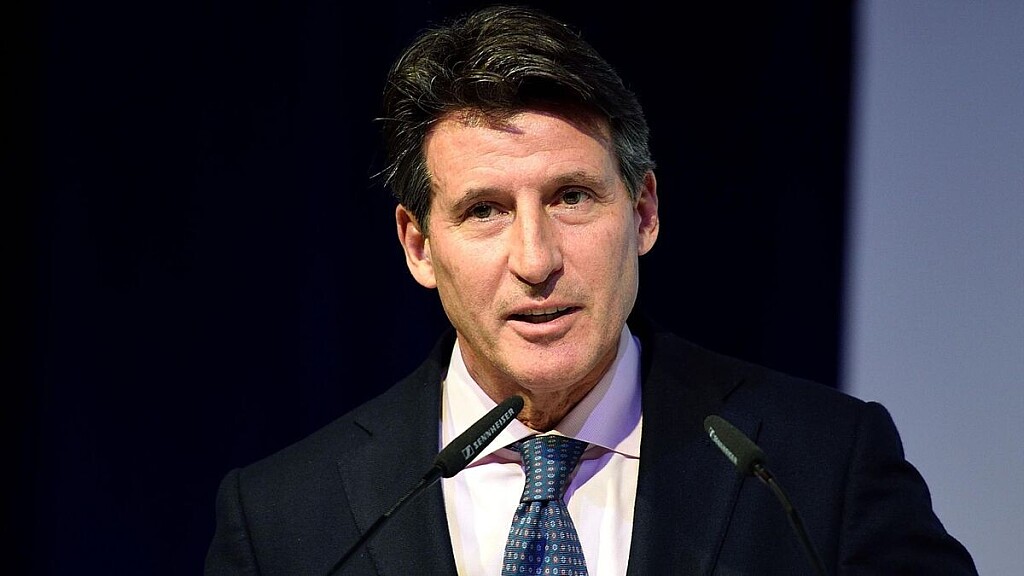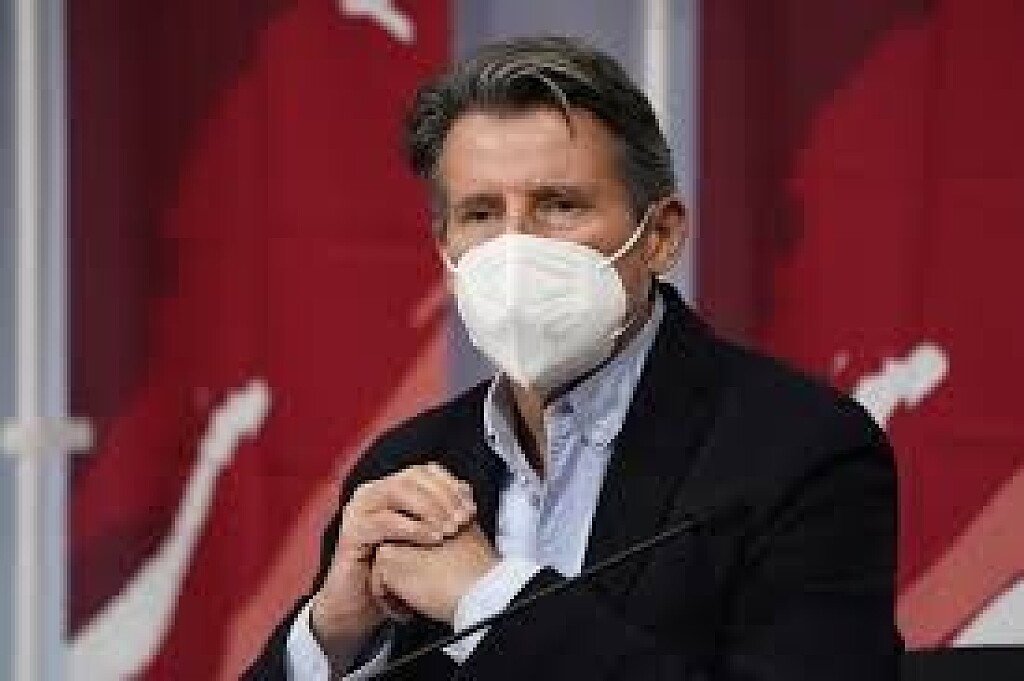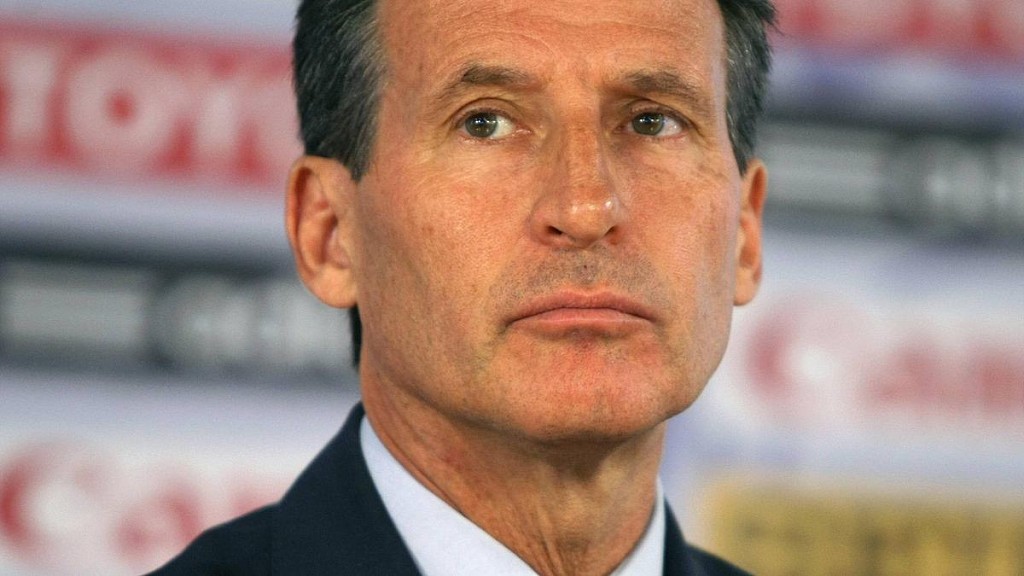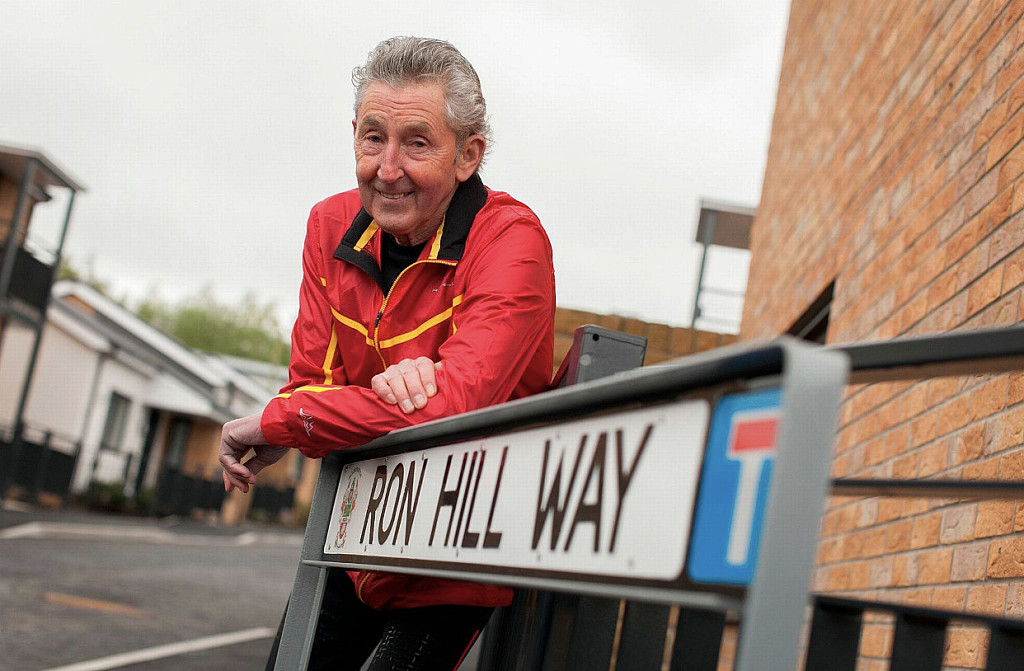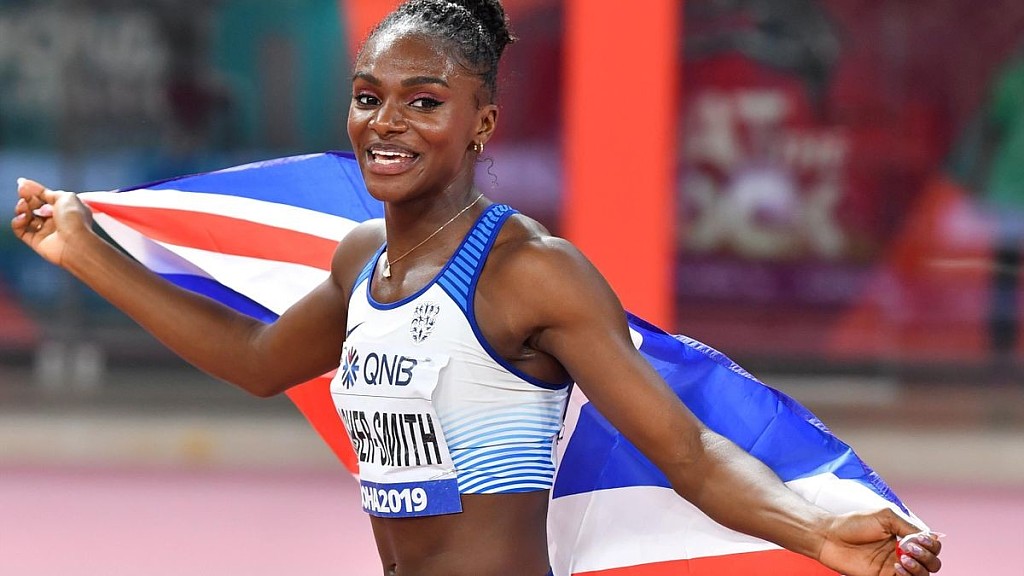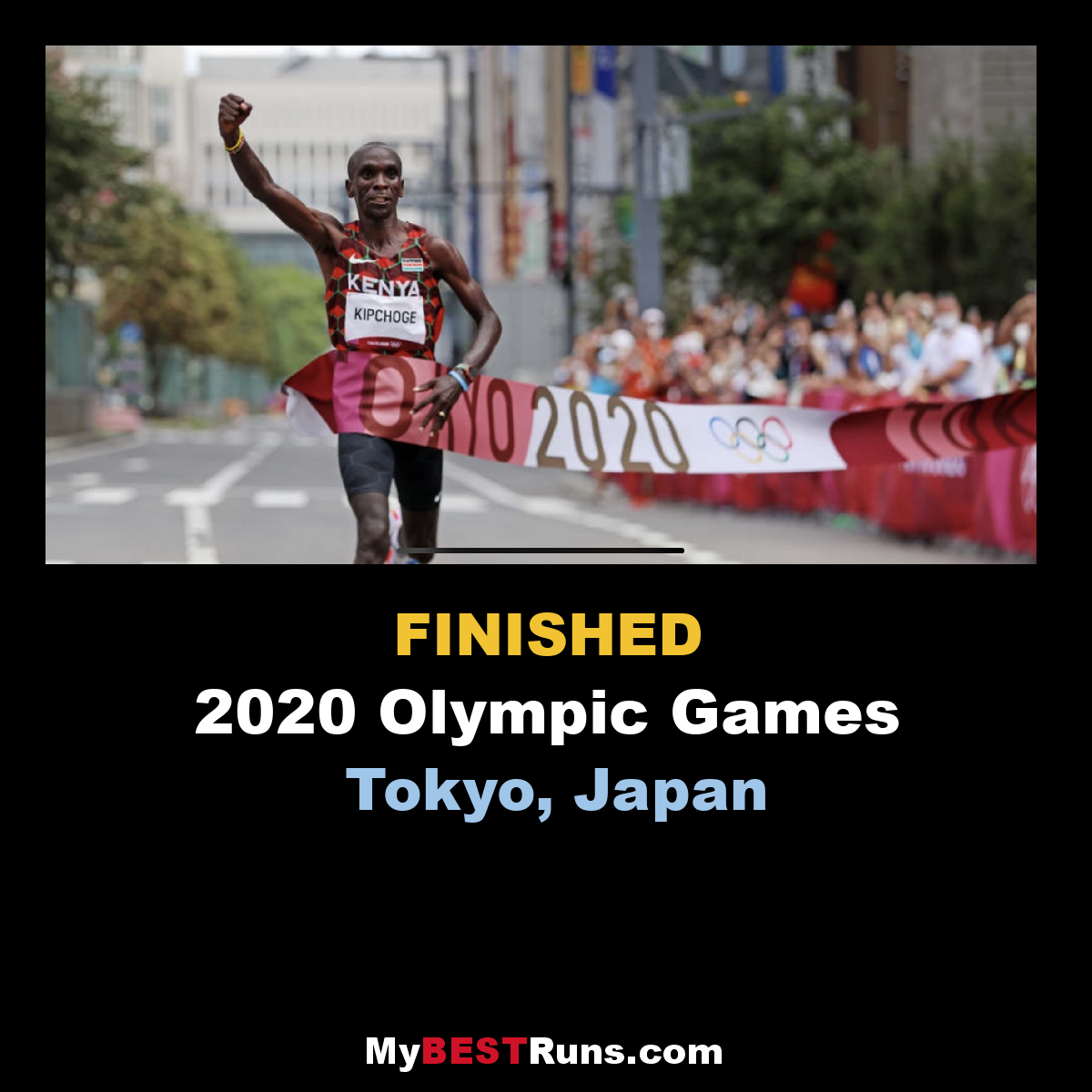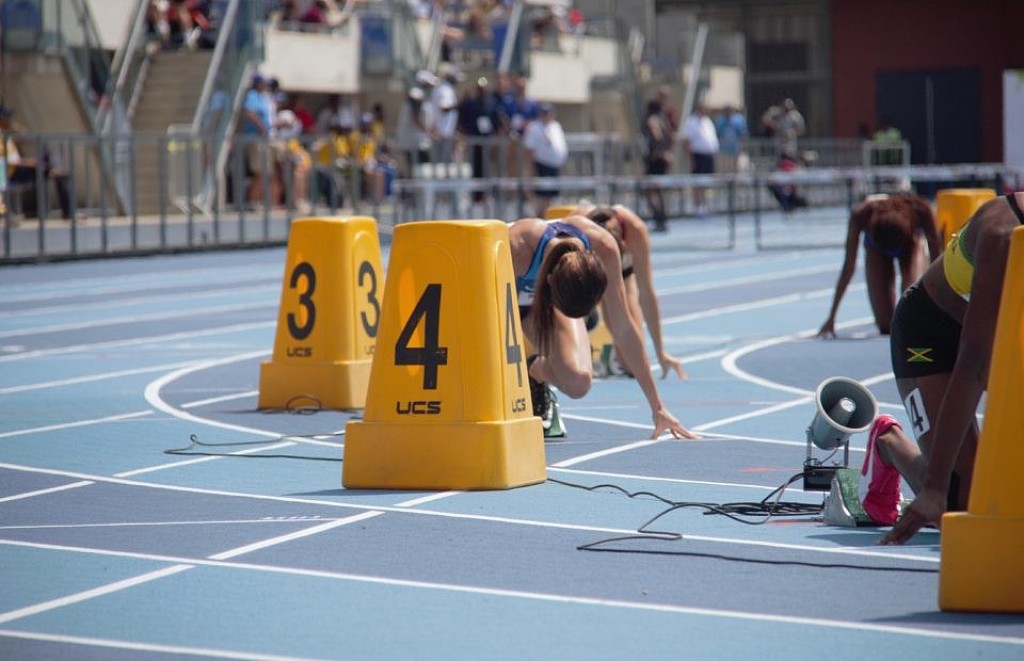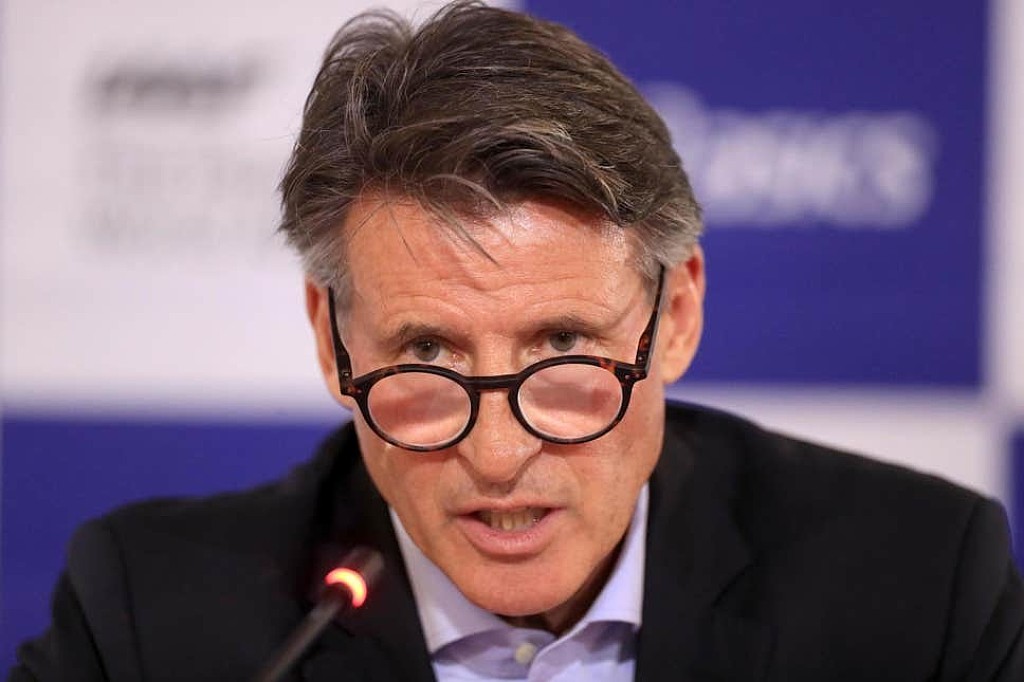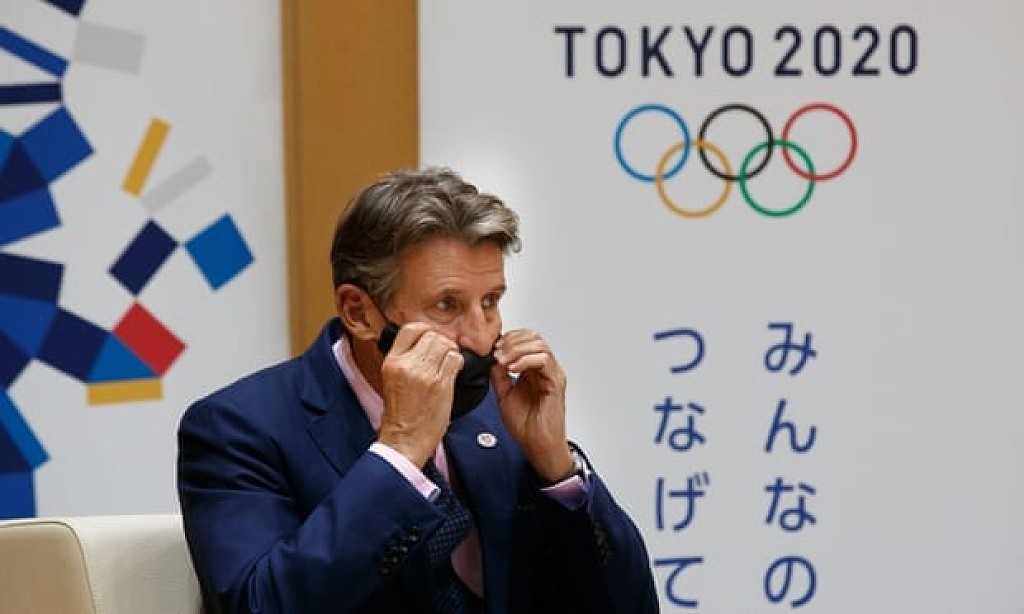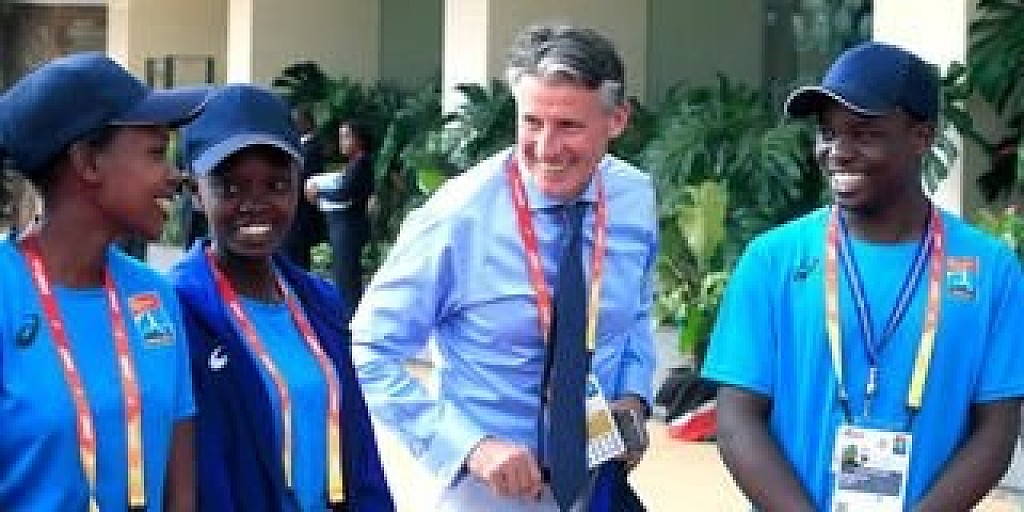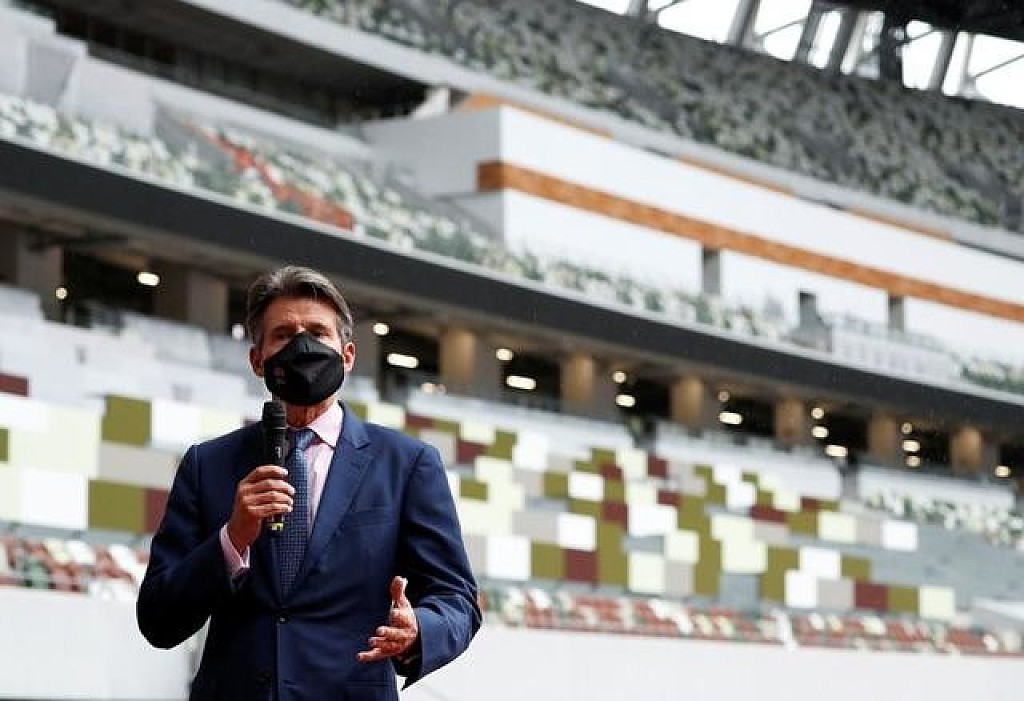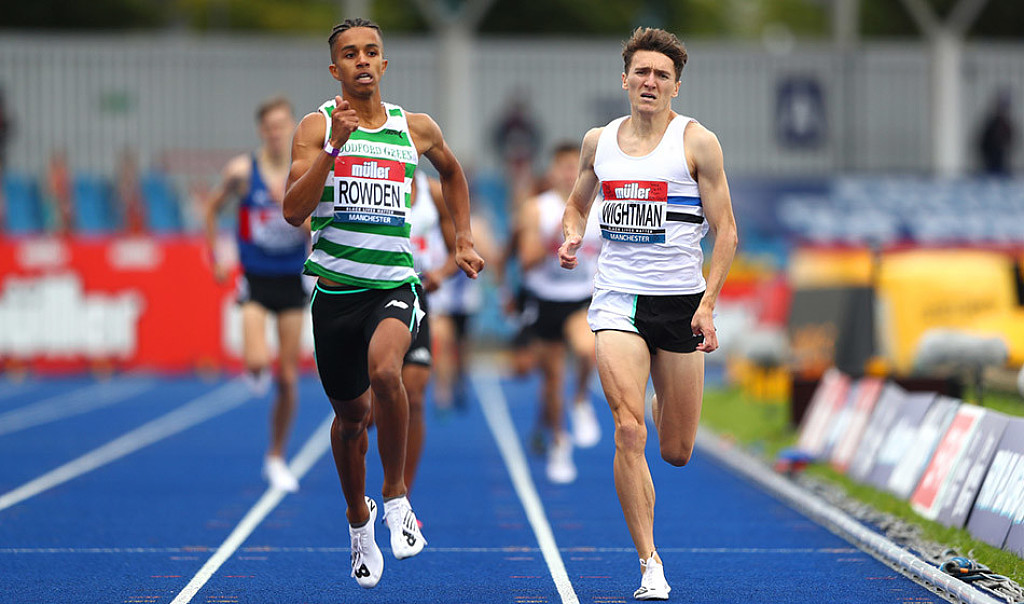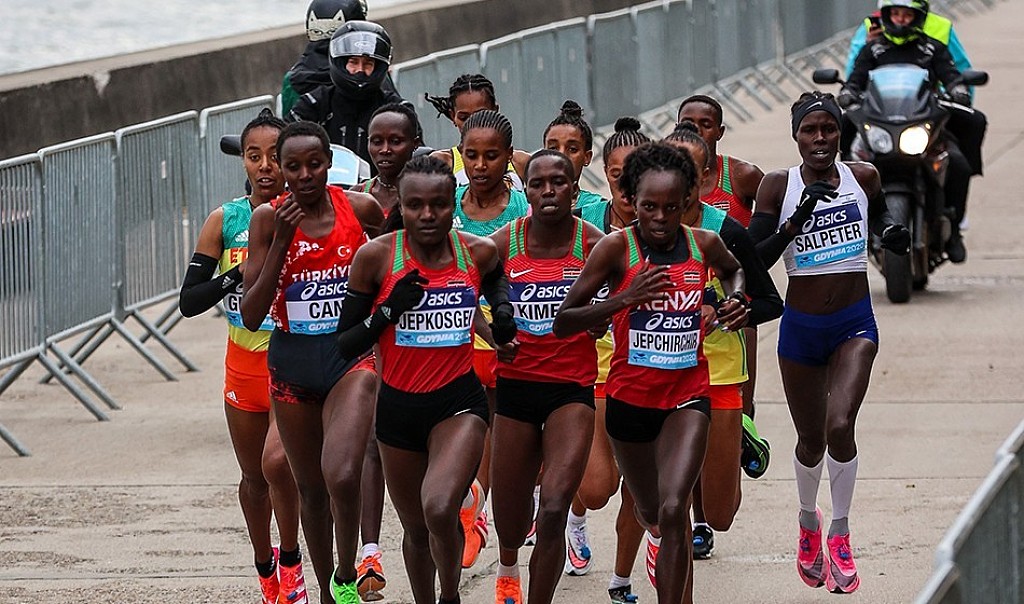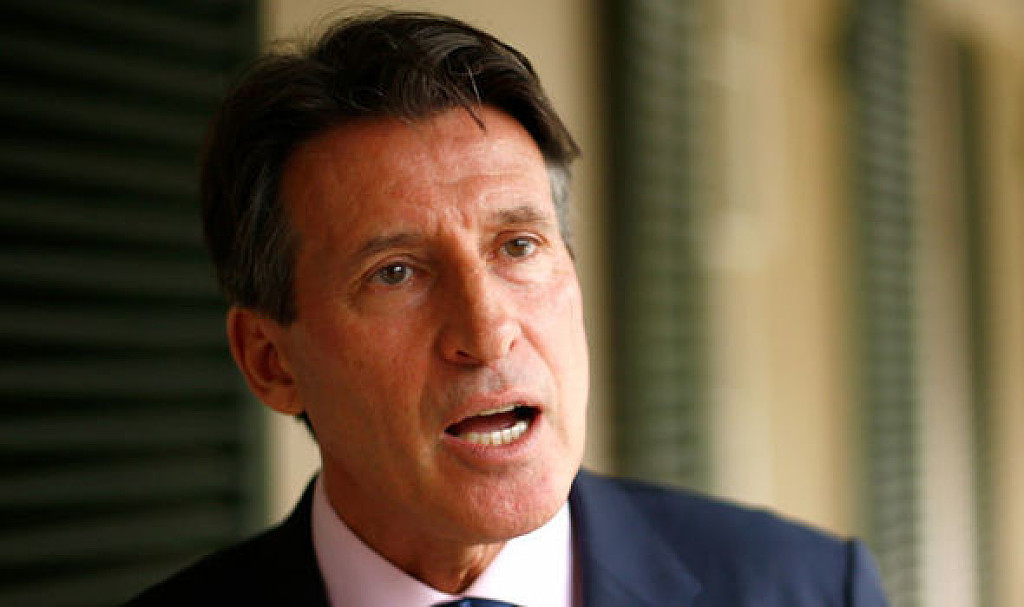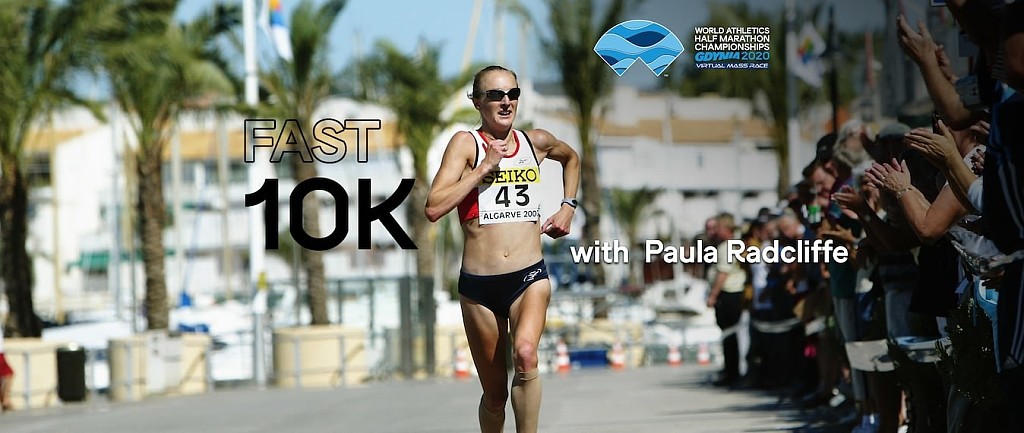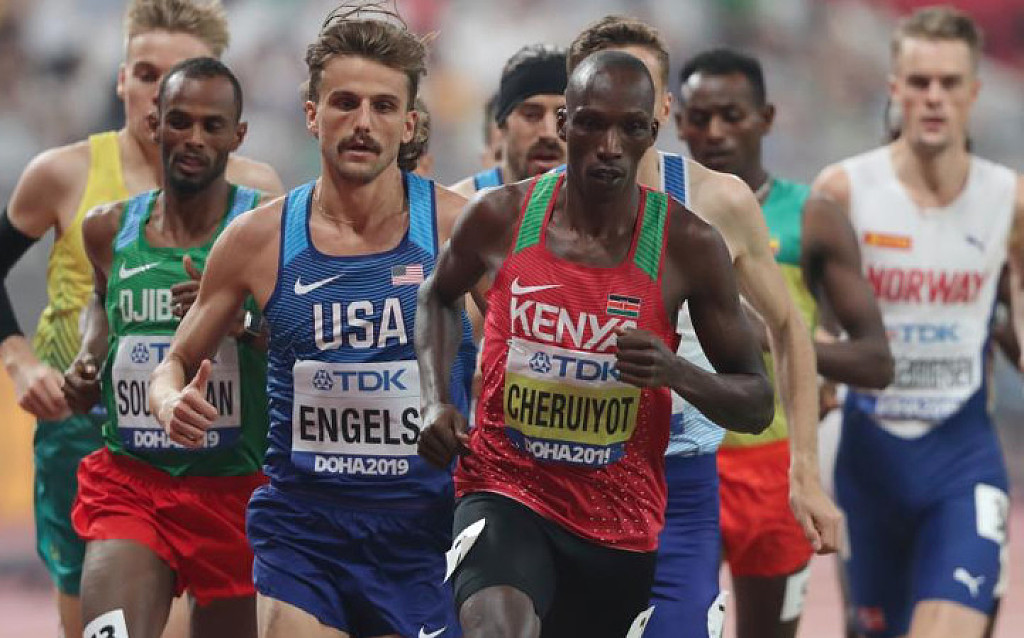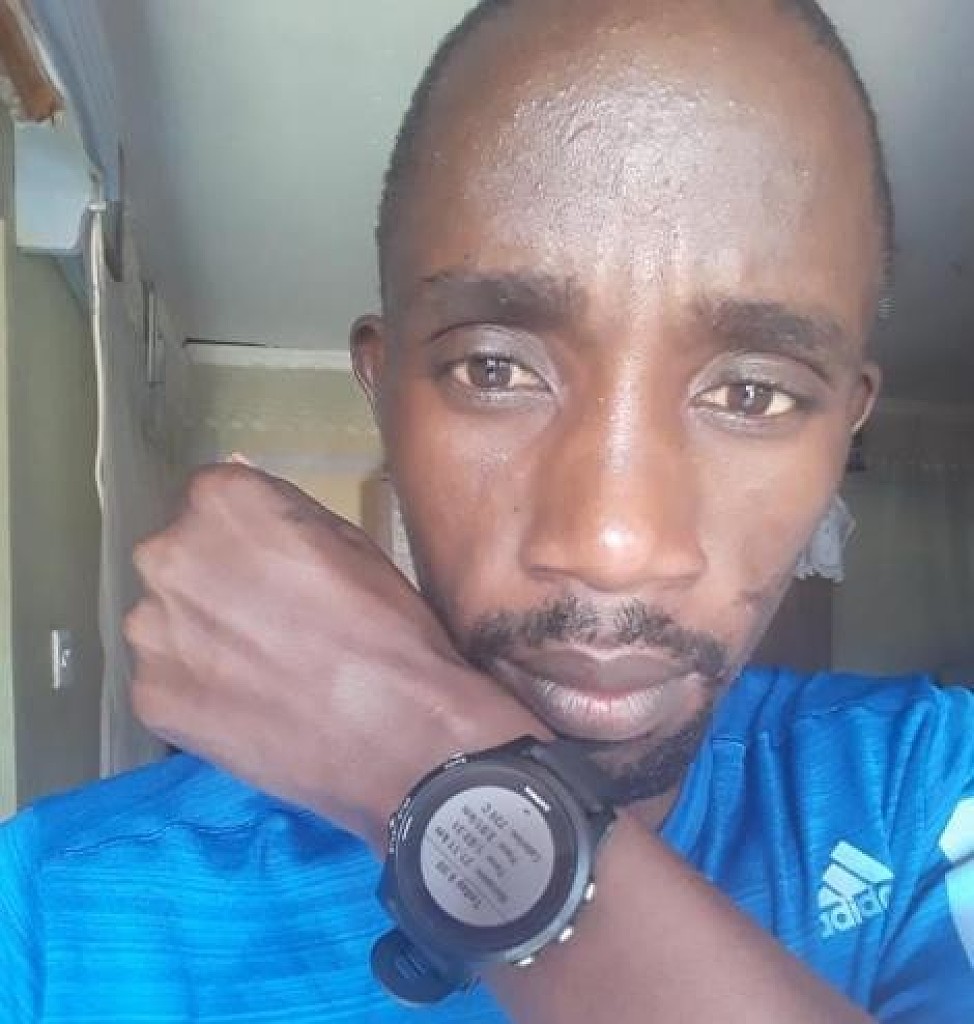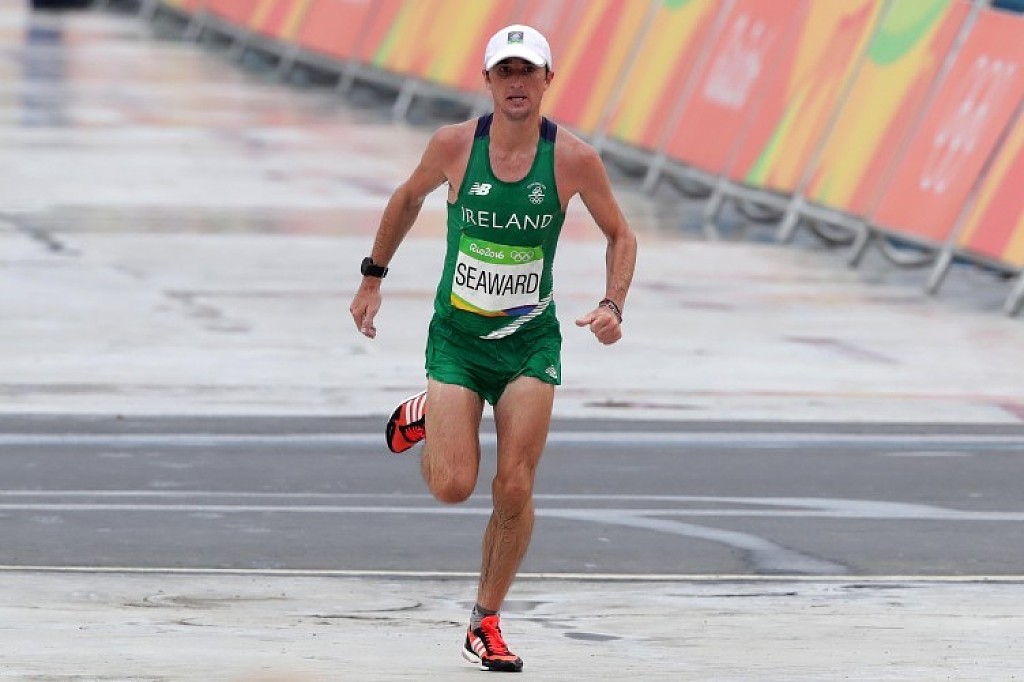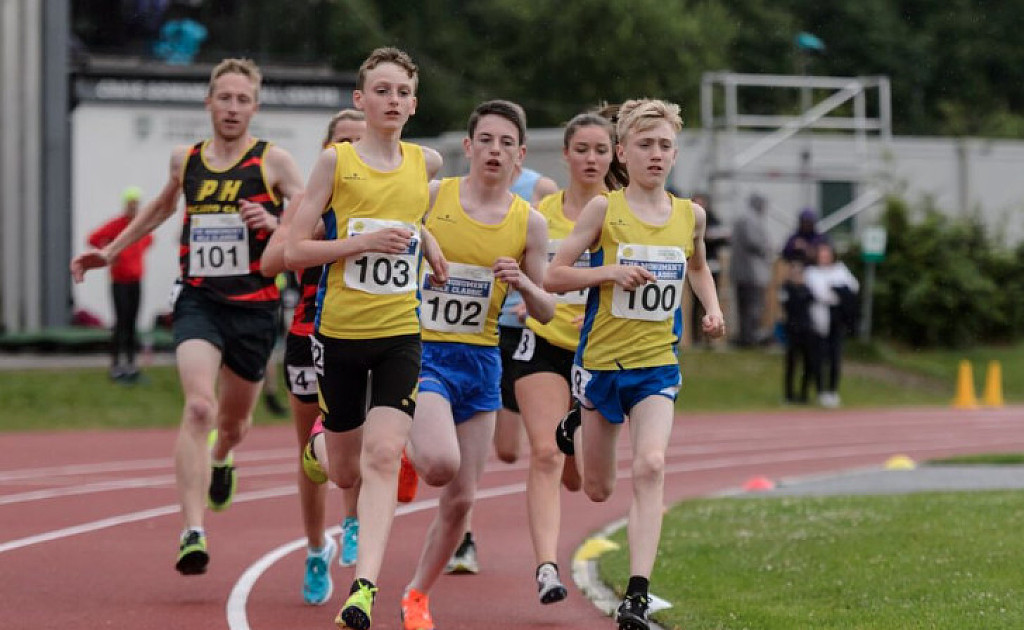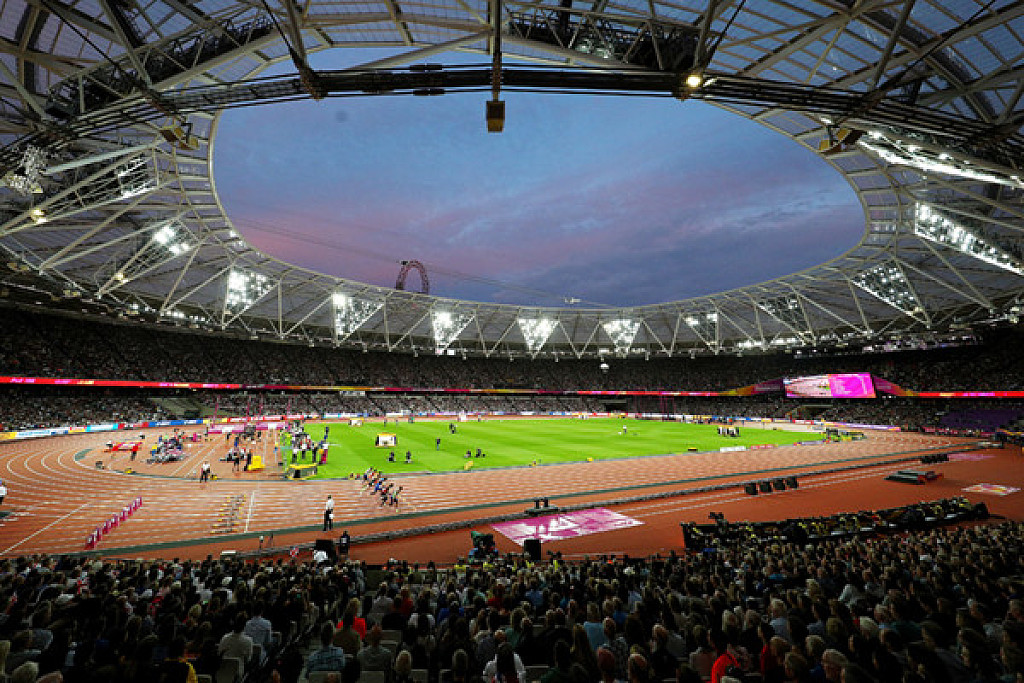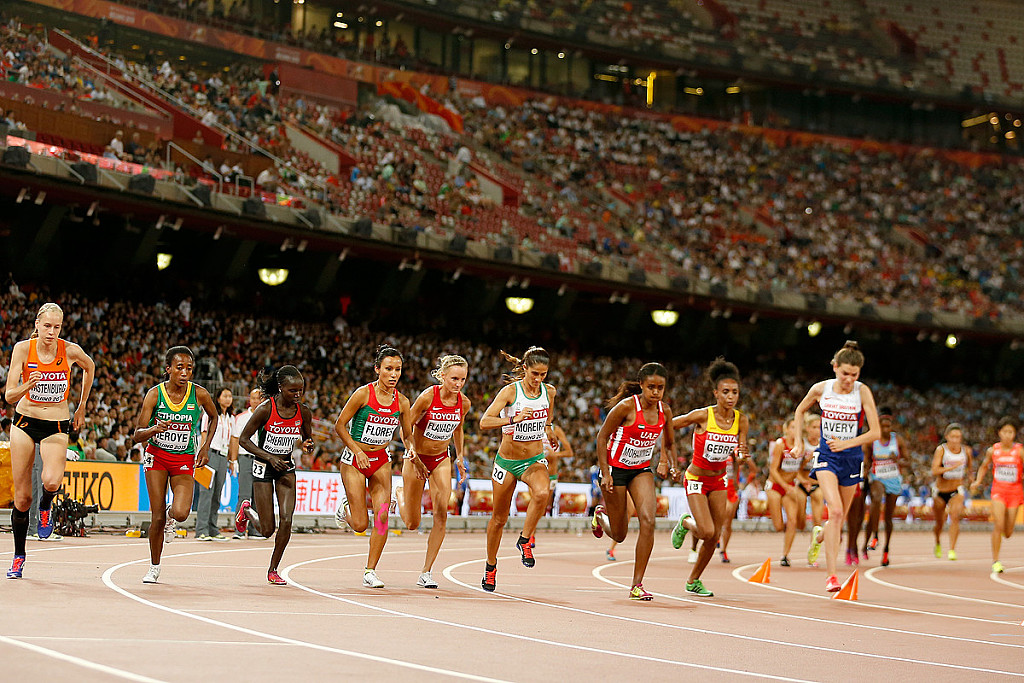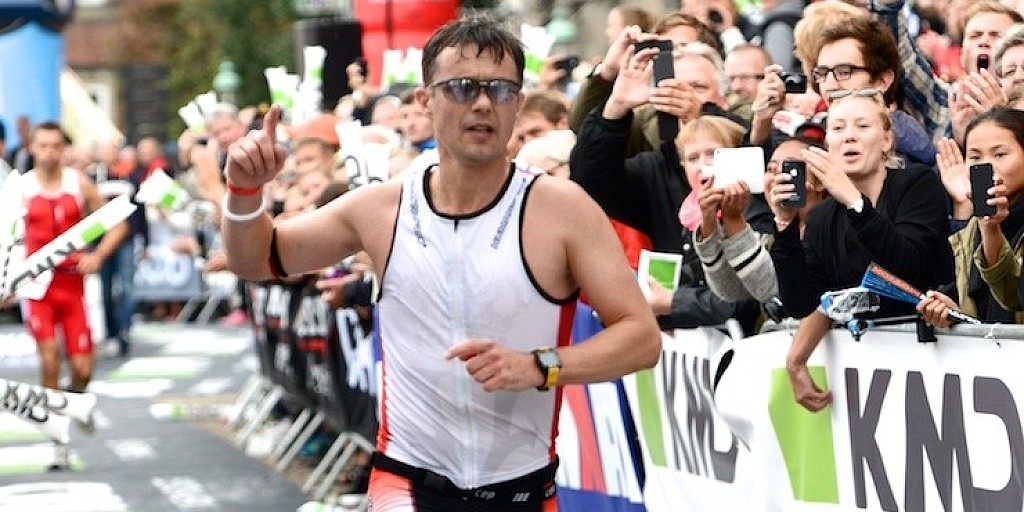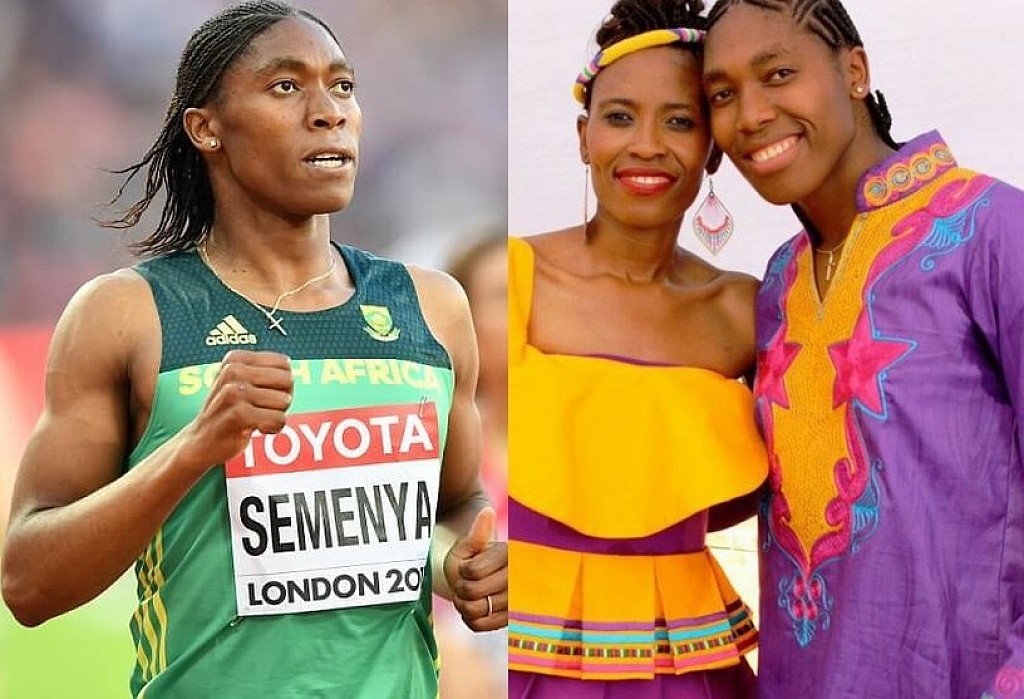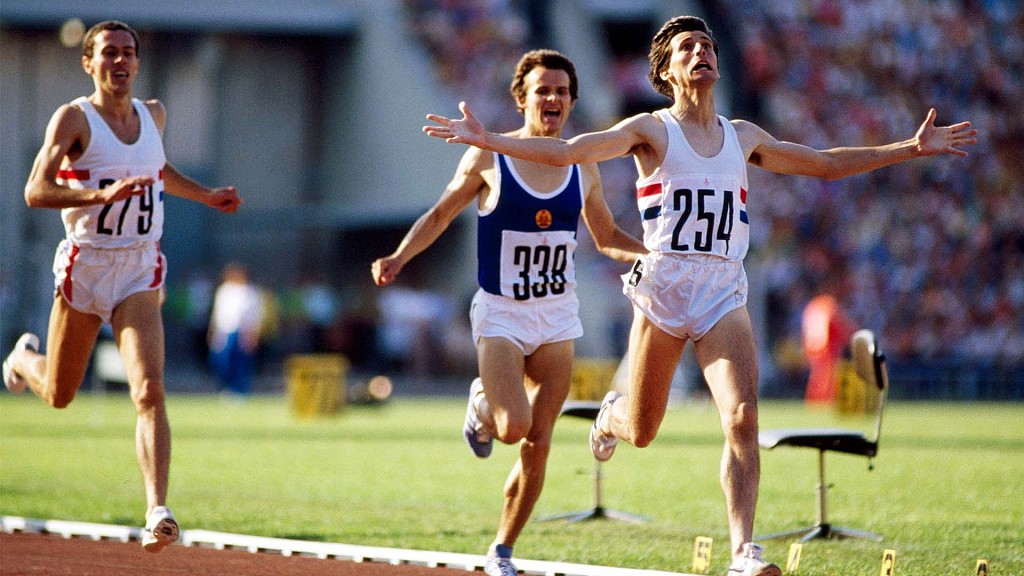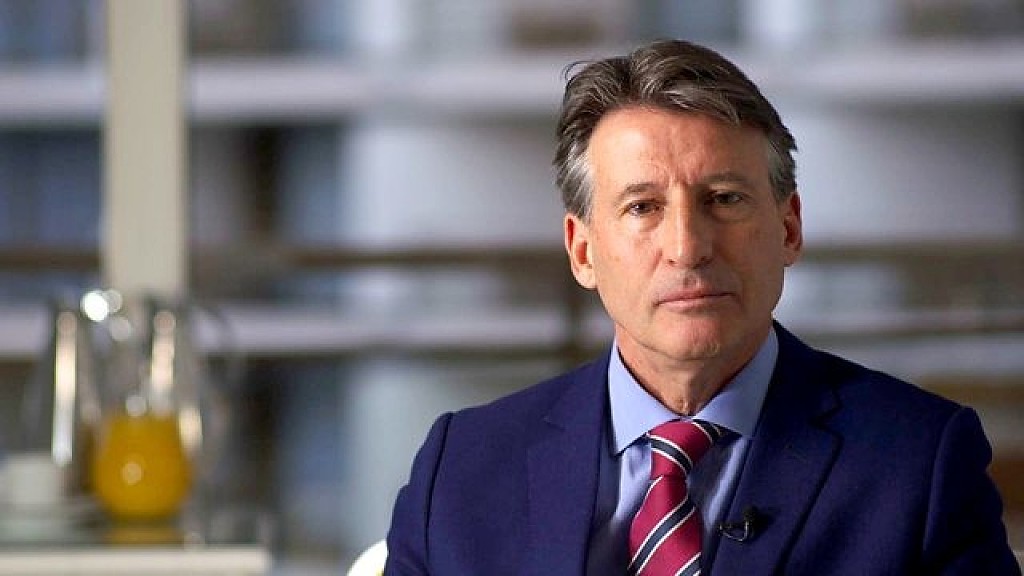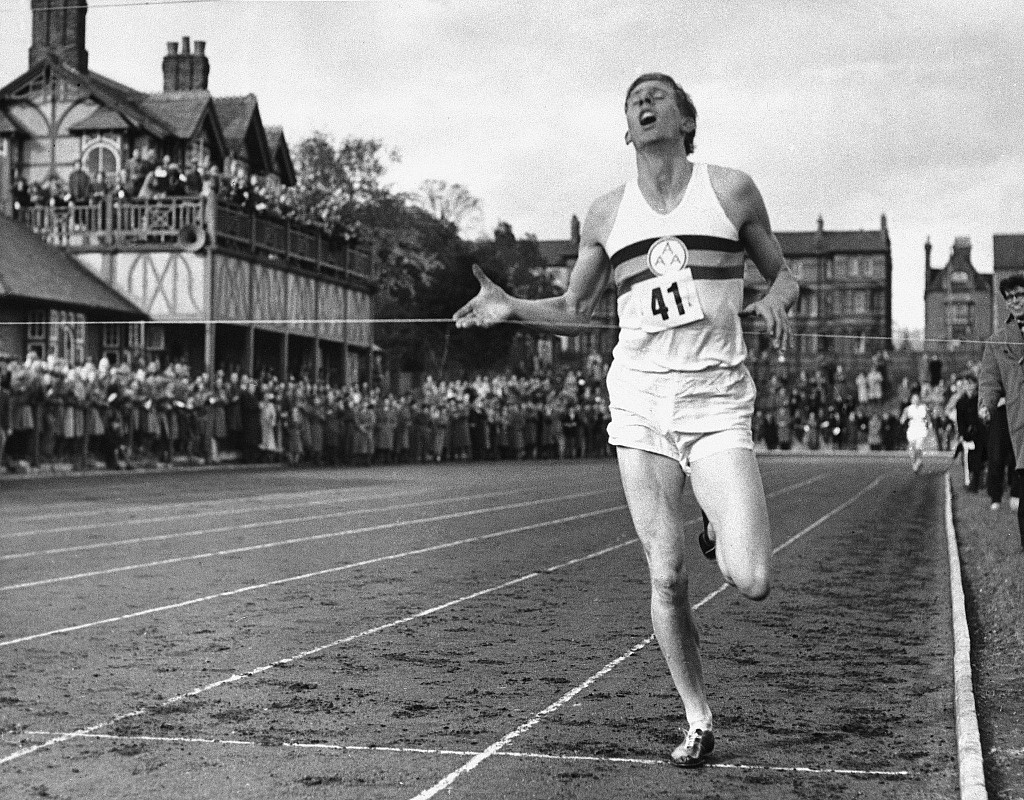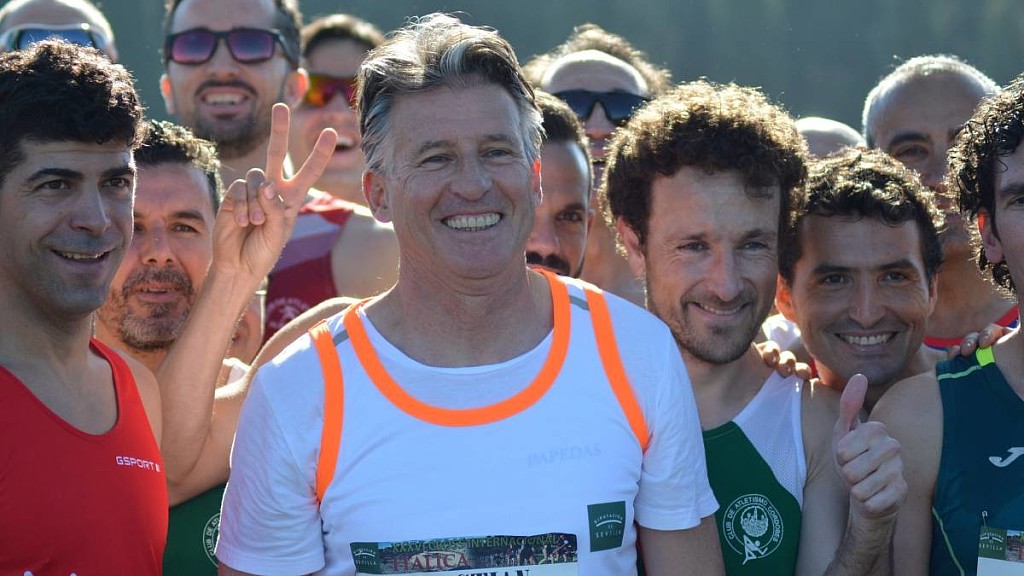Running News Daily
Running News Daily is edited by Bob Anderson. Send your news items to bob@mybestruns.com Advertising opportunities available. Train the Kenyan Way at KATA Kenya and Portugal owned and operated by Bob Anderson. Be sure to catch our movie A Long Run the movie KATA Running Camps and KATA Potato Farms - 31 now open in Kenya! https://kata.ke/
Index to Daily Posts · Sign Up For Updates · Run The World Feed
Articles tagged #Seb Coe
Today's Running News
World Athletics president pushing cross country for 2030 Olympics
It’s no secret that World Athletics president Seb Coe has ambitions to take over the International Olympic Committee (IOC) president position in the organization’s 2025 election. He looks to succeed Thomas Bach, who has served as president of the IOC for 12 years. Coe’s presidential manifesto pledges a clean and fair Olympics, and potentially the addition of some traditional summer and fall sports to the Winter program—including cross country.
During Coe’s year-end meeting with the media, he alluded to the need for the Winter Olympics to become “more accessible and open to new ideas.” The highest participation for the Winter Games was 93 countries at the 2018 Games in PyeongChang, South Korea, whereas the Paris 2024 Summer Games saw athletes from over 200 nations.
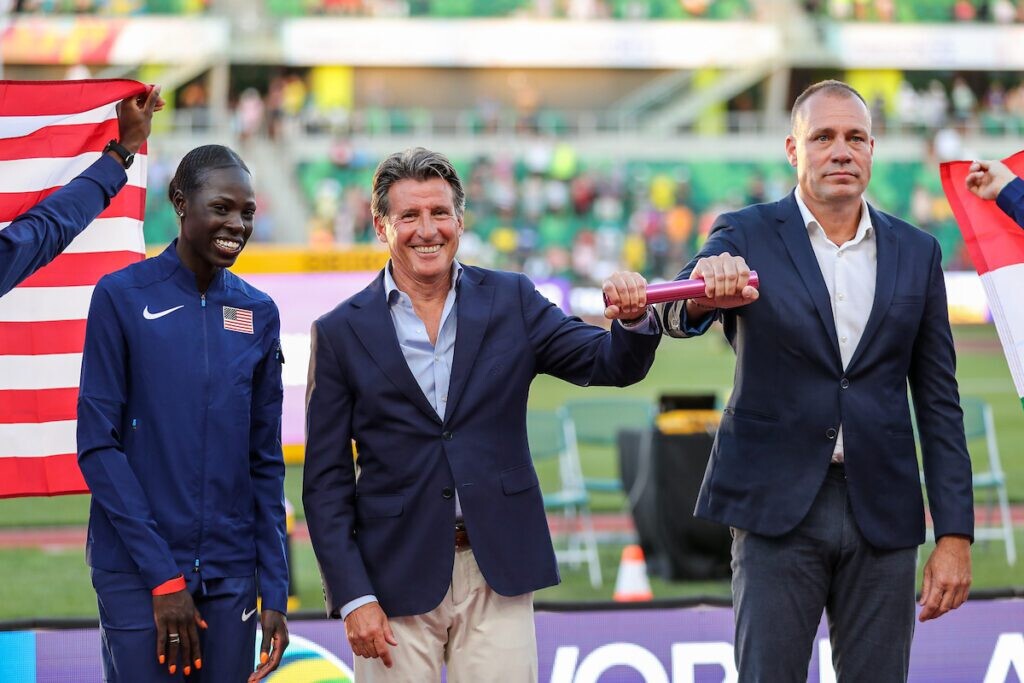
To expand the global audience, Coe believes the addition of fall or indoor sports into the Winter program could attract athletes and viewers from regions of the world that might not have snow. Cross country (running) and cyclo-cross (cycling) are at the forefront of this push, offering the opportunity to expand the Winter Games without straying too far from its profile or mission.
Cross country has faltered on the World Athletics calendar since the pandemic. The 2023 championships held in Bathurst, Australia, were too late in the season (February, two months after the cross-country season), which made it a lengthy commitment of time and travel for any athlete. The 2024 meet, originally scheduled for Croatia on Feb. 10-11, was reassigned to Serbia on March 30 when it emerged that Croatia was not ready to host. Although Serbia did all it could on six months’ notice, the event was heavily criticized for its course, spectator-friendly experience, and timing, as it was held (again) well after the cross-country season.
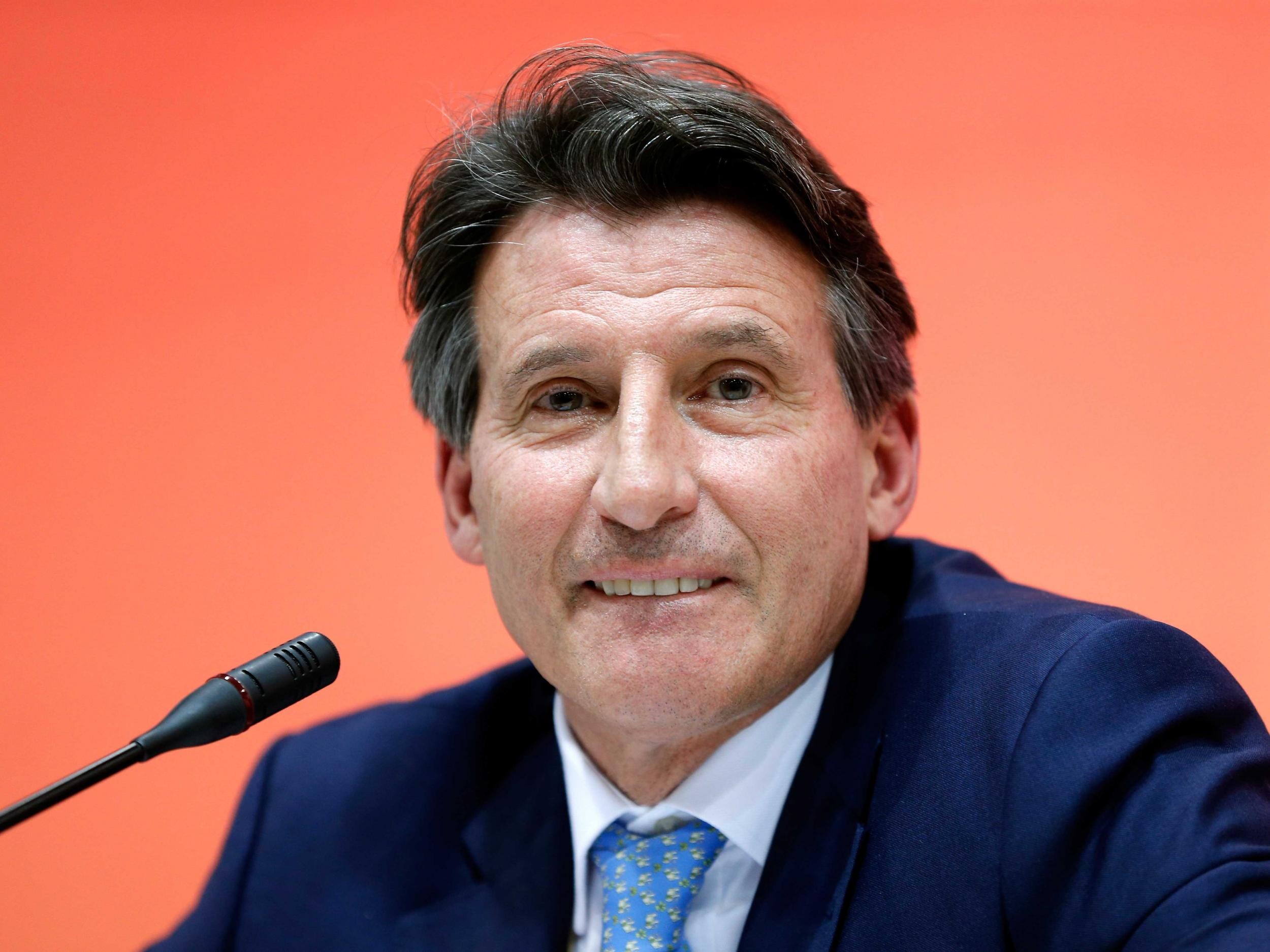
Coe has made it clear, on multiple occasions, that he believes there is a place for cross country in the professional running calendar, but there needs to be a way to make it more attractive to fans. “I’m a great adherent of cross country, and I think it’s a really important part of the endurance paradigm,” said Coe. “But it needs help… it needs space.”
The program for the 2026 Winter Olympics in Milan-Cortina D’Ampezzo, Italy is already set, but Coe is targeting the inclusion of the two sports by the 2030 and 2034 Olympics, which were awarded to the French Alps and Salt Lake City earlier this year.
If Coe is elected as the next president of the IOC in March 2025, he will vacate his current position as the head of World Athletics. The 68-year-old has served as World Athletics president since 2015 and was re-elected to a third (and final) four-year term in 2023. Coe was a two-time Olympic gold medalist during his own career and delivered the immensely popular London Olympics as chairman of the local organizing committee.
by Marley Dickinson
Login to leave a comment
Hassan and Tebogo named World Athletes of the Year
Olympic champions Sifan Hassan and Letsile Tebogo have been announced as World Athletes of the Year at the World Athletics Awards 2024 in Monaco.
Following a vote by fans, Hassan and Tebogo received top honors on an evening that saw six athletes crowned in three categories – track, field and out of stadium – before the overall two winners were revealed.
Tebogo was confirmed as men’s track athlete of the year, with Sydney McLaughlin-Levrone receiving the women’s honour. Hassan claimed the women’s out of stadium crown and Tamirat Tola the men’s, while Mondo Duplantis and Yaroslava Mahuchikh were named field athletes of the year.
This year’s Rising Stars were also celebrated, with Sembo Almayew and Mattia Furlani receiving recognition.
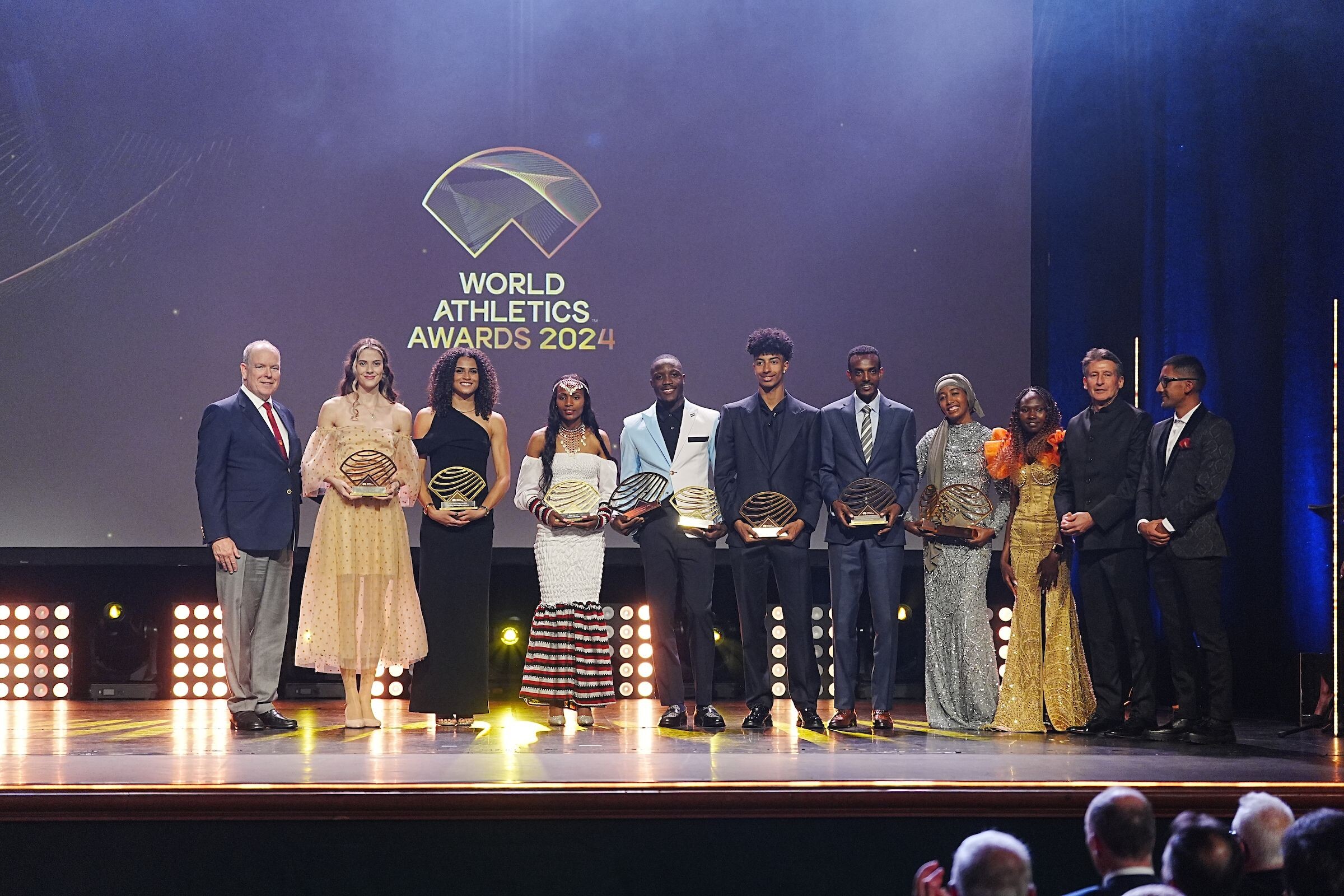
World Athletes of the Year for 2024
Women’s World Athlete of the Year: Sifan Hassan (NED)Men’s World Athlete of the Year: Letsile Tebogo (BOT)
Women’s track: Sydney McLaughlin-Levrone (USA)Women’s field: Yaroslava Mahuchikh (UKR)Women’s out of stadium: Sifan Hassan (NED)Men’s track: Letsile Tebogo (BOT)Men’s field: Mondo Duplantis (SWE)Men’s out of stadium: Tamirat Tola (ETH)
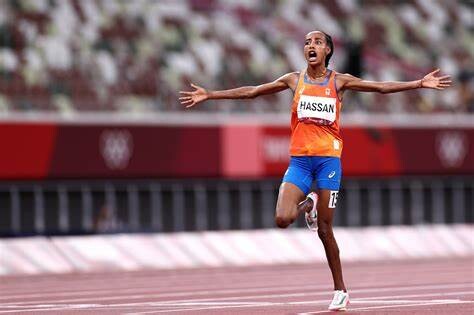
Women’s Rising Star: Sembo Almayew (ETH)Men’s Rising Star: Mattia Furlani (ITA)
“At the end of what has been a stellar year for athletics, we are delighted to reveal our list of World Athletes of the Year – both in their respective disciplines and overall,” said World Athletics President Sebastian Coe. “This group of athletes represents the very best of our sport and has this year redefined what is possible in terms of athletic performance.
“Our 2024 cohort set new standards in heights, speed and distance, including six world records and a host of Olympic and national records between them.
“I congratulate all our award winners, and all of the athletes nominated for these honors, and I thank them for inspiring us all with their performances this year.”
World Athletes of the Year Hassan and Tebogo both won gold and claimed multiple medals at the Paris 2024 Olympic Games.
Dutch star Hassan’s medal treble in Paris was capped by her winning the final athletics gold medal of the Games with her triumph in the marathon in an Olympic record of 2:22:55. That performance came just 37 hours after Hassan claimed bronze in the 10,000m, and six days after her first medal in the French capital – also bronze – in the 5000m.
As a result, she became the first woman to win medals in the 5000m, 10,000m and marathon at the same Games, and the first athlete since Emil Zatopek, who won all three men’s titles in Helsinki in 1952.
Tebogo also made history in Paris when he won the 200m, as he claimed a first ever Olympic gold medal in any sport for Botswana. He ran an African record of 19.46 – a time that moved him to fifth on the world all-time list – and that performance followed his sixth-place finish in the 100m final. He went on to form part of Botswana’s silver medal-winning men’s 4x400m team.
He dipped under 20 seconds for 200m a total of nine times in 2024, with those performances topped by his Olympic title-winning mark which remained the fastest of the year.
His fellow track athlete of the year, McLaughlin-Levrone, improved her own world 400m hurdles record twice, to 50.65 and 50.37, and claimed Olympic gold in that event as well as in the 4x400m. Tola, who joined Hassan in being named out of stadium athlete of the year, won the Olympic marathon title in Paris in an Olympic record.
World records were set by both field athletes of the year. Mahuchikh cleared 2.10m to improve the world high jump record before winning Olympic gold, while Duplantis revised his own world pole vault record three times, eventually taking it to 6.26m, and won the Olympic title.
"Thank you to the fans, to everybody who voted," said Hassan, who was in Monaco to receive her two awards. "I never thought I was going to win this one. This year was crazy. It’s not only me – all the athletes have been amazing. I’m really grateful. What more can I say?"
Standing alongside Hassan on the stage at the Theatre Princesse Grace, Tebogo said: "It feels amazing to know that the fans are always there for us athletes. It was a great year.
"This means a lot," he added. "It’s not just about the team that is around you, there are a lot of fans out there that really want us to win something great for the continent. It was a real surprise to hear my name because I didn’t expect this."
Almayew and Furlani named Rising Stars of 2024
Not only did Sembo Almayew and Mattia Furlani achieve great things as U20 athletes in 2024, they both also secured success on the senior stage.
Almayew finished fifth in the 3000m steeplechase final at the Paris Olympics, going close to her own national U20 record with her 9:00.83 performance, before she travelled to Lima where she won the world U20 title, setting a championship record in the process. With that win, the 19-year-old became the first ever Ethiopian world U20 women’s steeplechase champion.
Furlani improved the world U20 long jump record to 8.38m at the European Championships on home soil in Rome to secure silver, and he won two more senior major medals at the World Indoor Championships, where he got another silver, and the Olympic Games, where he claimed bronze.
In Glasgow – at the age of 19 years and 24 days – Furlani became the youngest athlete ever to win a world indoor medal in the horizontal jumps.
Knight wins President’s Award
The winner of the President’s Award was also announced in Monaco on Sunday (1), with Nike co-founder Phil Knight receiving the honour in recognition of his constant inspiring support for athletics and the development of the sport.
The President's Award, first awarded in 2016, recognises and honours exceptional service to athletics. Past winners of the award include the Ukrainian Athletics Association, British journalist Vikki Orvice, Swiss meeting director Andreas Brugger, Jamaican sprint superstar Usain Bolt, the Abbott World Marathon Majors, and 1968 men’s 200m medallists Tommie Smith, Peter Norman and John Carlos for their iconic moment on the podium in Mexico.
“Phil Knight’s passion for athletics is pretty much lifelong,” said Coe. “He developed an almost father-son relationship with his coach, the legendary Bill Bowerman, whose training approach was a departure from the orthodoxies of the day and who not only guided Knight’s career on the track but became a central figure when Phil took his first tentative steps in the running shoe business that became the dominant global force Nike.
“His love of athletics runs through Nike. It is a business created and driven by runners, with Phil never afraid to be the front runner.”
Knight said: “Thank you, Seb Coe, for the ultimate honour of the President’s Award, given by World Athletics. I am in great company, with Tommie Smith and John Carlos, and Usain Bolt. Obviously, I didn’t run as fast as those guys, but I am in such high company that I am thrilled by the award. Track and field has always been an important part of Nike – it has always been a central part of who Nike is.
“I do think running will continue to grow. Not only does Seb and his team do a great job promoting the sport, but it is a sport that not only is enjoyable, but it is probably the best fitness activity you can do. So, for me to win this honour, it is very meaningful.”
During the ceremony, a moment was taken to remember last year’s men’s out of stadium athlete of the year Kelvin Kiptum, the marathon world record-holder who died in a road traffic accident in February, as well as other figures from the sport who have passed away in 2024.
by World Athletics
Login to leave a comment
The wait is almost over. The men’s Olympic 1500 meters is almost upon us
The 1500 is always one of the crown jewels of the Olympic program, and the burgeoning rivalry between Olympic champion Jakob Ingebrigtsen of Norway and world champion Josh Kerr of Great Britain has sent anticipation levels through the roof in 2024. The last two global 1500-meter finals were unforgettable, and this year’s race is shaping up as an all-time classic after the two men have spent the last 12 months trading verbal barbs.
On the night of August 6 in the Stade de France, one of three things will happen:
1) Ingebrigtsen will win his second Olympic 1500-meter title at the age of 23, joining Seb Coe (1980, 1984) as the only man to repeat as champion.
2) Kerr will win gold, just as he did at last year’s World Championships, bringing Ingebrigtsen’s record in global 1500m finals to 0-4 since his triumph at the 2021 Olympics (with one being the 2022 World Indoors loss).
3) Someone else will win the title in one of the great Olympic upsets. Could it be 19-year-old phenom Niels Laros? Or perhaps two-time Olympic Trials champion Cole Hocker of the United States?
As long as the race isn’t marred by a fall — which has sadly become all too common in middle-distance races this year — it’s hard to envision a scenario in which this race is not totally awesome.
by Jonathan Gault
Login to leave a comment
Paris 2024 Olympic Games
For this historic event, the City of Light is thinking big! Visitors will be able to watch events at top sporting venues in Paris and the Paris region, as well as at emblematic monuments in the capital visited by several millions of tourists each year. The promise of exceptional moments to experience in an exceptional setting! A great way to...
more...Kelvin Kiptum death: Seb Coe, Eliud Kipchoge and Mo Farah lead tributes to marathon star after horror crash
The world of athletics has come together to pay tribute to Kelvin Kiptum after he died in a horrific car crash in Kenya.
Kiptum died alongside his coach Gervais Hakizimana, 36, on Sunday after the car he was driving came off the road and hit a tree. Police said he had "lost control [of the vehicle] and veered off-road entering into a ditch on his left side" before he “drove in the ditch for about 60 metres before hitting a big tree”. A young woman was rushed to hospital after being injured in the crash.
The 24-year-old Kenyan is the men’s marathon world record holder, having run a staggering time of two hours and 35 seconds in Chicago in October. Kiptum had only run his first marathon in 2022 yet had rapidly emerged as a world-class talent to challenge the great Eliud Kipchoge.
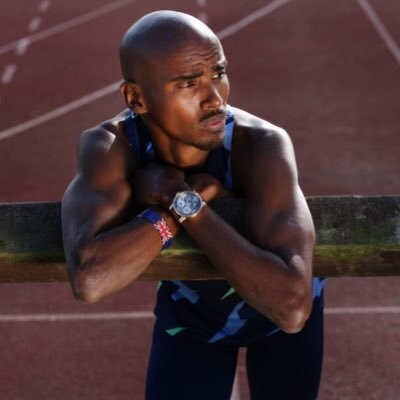
His loss has left the sport reeling and Sir Mo Farah was among those to pay tribute to the immensely gifted runner. "Kelvin was an amazingly talented athlete and had already achieved so much," Farah said.
"He truly had a special talent and I have no doubt he would have gone on to have had an incredible career. I send all my sympathies and condolences to his and Gervais' family and friends at this tragic time."
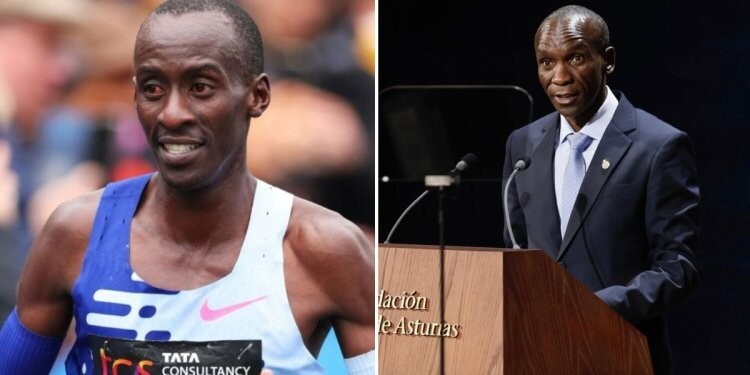
British running great and World Athletics president Seb Coe wrote on Twitter : “We are shocked and deeply saddened to learn of the devastating loss of Kelvin Kiptum and his coach, Gervais Hakizimana. On behalf of all World Athletics we send our deepest condolences to their families, friends, teammates and the Kenyan nation.
“It was only earlier this week in Chicago, the place where Kelvin set his extraordinary marathon World Record, that I was able to officially ratify his historic time. An incredible athlete leaving an incredible legacy, we will miss him dearly.”
Kipchoge is widely considered the greatest marathon runner of all time, yet Kiptum broke his world record in Chicago last year. The 39-year-old wrote: “I am deeply saddened by the tragic passing of the Marathon World record holder and rising star Kelvin Kiptum.
An athlete who had a whole life ahead of him to achieve incredible greatness. I offer my deepest condolences to his young family. May God comfort you during this trying time.”
Kiptum was a natural marathon runner and showed his talent right from the off when he ran fourth fastest time on record (2:01:53) to win the Valencia Marathon in 2022. He then set a course record of 2:01:25 at the London Marathon in April 2023 before taking a gigantic 34 seconds of Kipchoge’s world record time six months later.
London Marathon event director, Hugh Brasher, said: “Kelvin had the sport of marathon running in his feet and at his feet. He was a 'once in a generation' athlete who was set to redefine the boundaries of our sport.
“Three marathons, three wins. The fastest marathon debutant in Valencia, London's course record holder and the world record holder in Chicago, all within the space of less than 12 months. His was a flame that burned so bright and last night was tragically put out.
“As a sport we mourn for a life so tragically cut short, a talent and a work ethos that was only starting to be appreciated and a man that we had only just started to know. Our thoughts are with his family and friends and those of his coach Gervais. We hope that Sharon Chepkirui Kosgei, who was travelling with them, makes a full and speedy recovery.”
Kiptum had only recently announced his intention to run the marathon in under two hours in Rotterdam in April. Kipchoge has run a marathon in one hour 59 minutes 40 seconds, but that time does not count as an official record as it was in a specifically arranged sponsored event with pacemakers.
British marathon runner Emile Cairess said Kiptum could have become "Usain Bolt-esque" as a "figurehead of athletics". He told the BBC : "It's a massive blow because at his level, someone can really capture the attention of people outside of the sport.
"Many people thought they would never see a sub two-hour marathon in their lifetimes but since he came along, it's like it was just a given that he would do it because of his exceptional performances so far. It was almost certain that he would have done it. It's terribly sad and a real shame that we won't get to see him again or to attack that barrier."
Login to leave a comment
Caster Semenya says World Athletics president Seb Coe damaged her life
Caster Semenya has claimed that World Athletics damaged her personally and professionally through the hormone suppression medication that she had to take for six years.
In her new book, The Race to Be Myself, two-time Olympic champion Caster Semenya has revealed how World Athletics seemingly destroyed her life and she singled out President Seb Coe.
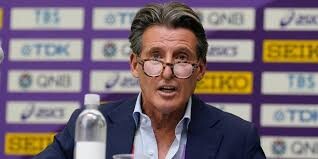
In her book, which was published on Tuesday, October 31, the South African claimed that they (World Athletics) damaged her personally and professionally through the hormone suppression medication she was required to take for six years. As reported by The Telegraph, Semenya explained how Coe had something against her.
“With me and Sebastian, it’s personal. He has something against me – that’s how I feel, and no one can change my mind,” Semenya writes.
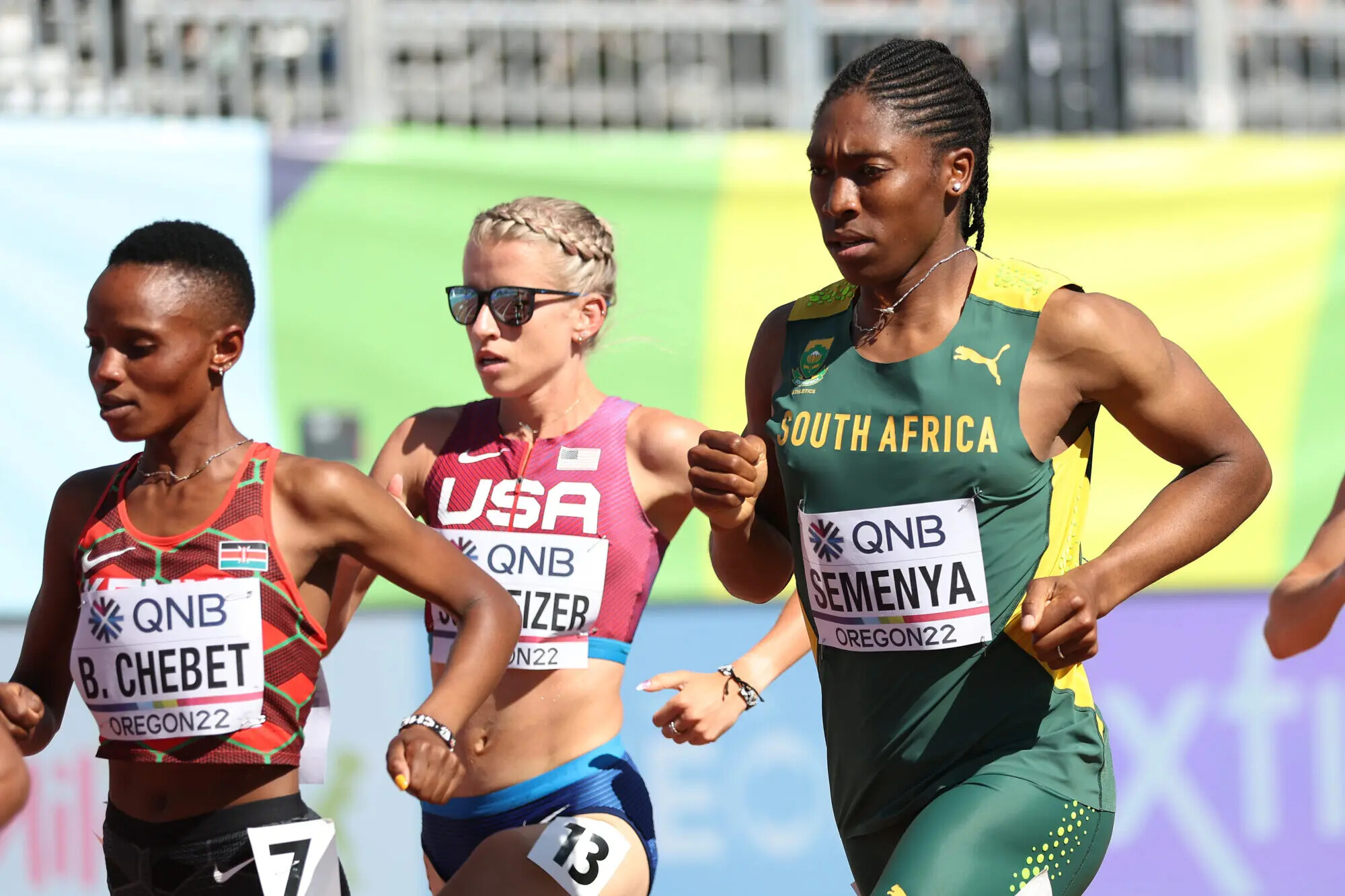
She started her professional career at 18 and her hyperandrogenism, which comes under the technical label of DSD (differences in sexual development), caused a dilemma in the world of athletics. In her book, she sets the record straight that she was born with a vagina but no womb and internal testes.
After her victory at the World Championships in 2009, World Athletics noted that she could only be allowed to compete if she suppressed her testosterone levels below 10 nmol/L.
However, the restriction was lifted in 2016 after another DSD athlete – Indian sprinter Dutee Chand – brought a legal challenge against the rule.
“The man (Coe) couldn’t help himself. Coe has always struck me as a small man, unsure of himself. He couldn’t stand being questioned about the regulations or me in particular.
He could barely say my name in interviews … My thoughts are that he should concentrate on doing the job he said he would do.
Clean up the sport … Everybody knows there is a systemic doping issue in athletics, and the IAAF has made a mess of dealing with it,” Semenya narrates.
Follow the Pulse Sports Kenya WhatsApp Channel for more news.
Meanwhile, Semenya noted that she will never again take hormone suppressants – to which she attributes side effects such as weight gain, cramps, and the weakening of bones – in order to race.
She disclosed that she did not know about her DSD condition until it was made public in 2009, soon after that first World Championship gold in Berlin.
“I found out, along with the rest of the world, that I did not have a uterus or fallopian tubes. I would say I was being treated like an animal, but I grew up tending to my family’s livestock, and we treated them with more respect than that,” she explained.
by Abigael Wuafula
Login to leave a comment
Botswana’s Nijel Amos 800m star and Olympic medalist, banned three years for doping
Botswana’s Nijel Amos, the joint-third-fastest 800m runner in history, was banned three years for doping.
The case stemmed to last June, when he tested positive for GW1516, an experimental drug which can modify the body’s metabolism but has been considered too dangerous for human use.
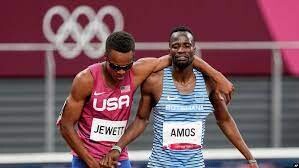
The ban was backdated to last July, when Amos was provisionally suspended pending an investigation. His ban now runs to 2025, which means the 29-year-old Amos will miss the 2024 Paris Olympics.
Amos received a one-year reduction of what would otherwise be a four-year ban because he made an early admission and acceptance of the suspension.
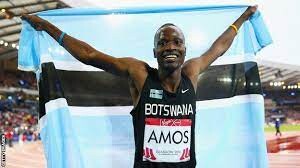
That came after he requested a supplement be tested for the presence of the drug. The test did not detect any GW1516 in opened and sealed bottles.
GW1516 was developed to help build endurance and burn fat but was found to cause cancer during tests on rodents. Anti-doping organizations have warned athletes not to use it on safety grounds.
The drug has previously been found in samples given by professional cyclists and by Olympic race walker Elena Lashmanova. The Russian served a two-year ban and was later stripped of the 20km gold medal she won at the 2012 Olympics for another doping offense.
In 2012, Amos, then 18, took silver in the 800m at the London Games in what many called the greatest Olympic race in history. Kenyan David Rudisha lowered his world record. Amos matched Seb Coe as the third-fastest man in history in the event (1:41.73). Every runner’s time was the fastest ever for that finishing placement.
Amos has not won an Olympic or world championships medal since. In July 2019, he ran 1:41.89, the world’s best time since that London Olympic final.
At the Tokyo Olympics, Amos and American Isaiah Jewett got tangled in the final lap of their semifinal. In an act of good sportsmanship, the runners helped each other up and later jogged across the finish line together in the last two places. Amos was granted a place in the final and finished eighth.
by OlympicTalk
Login to leave a comment
Russian doping ban lifted, but Ukraine war keeps athletes out
Russia and its athletes will remain banned from competition due to the ongoing invasion of Ukraine.
On Thursday afternoon, the World Athletics Council announced the reinstatement of the Russian Athletics Federation (RusAF) following a seven-year doping suspension. Despite their reinstatement into the sport, however, Russia will remain banned from competition due to its ongoing invasion of Ukraine.
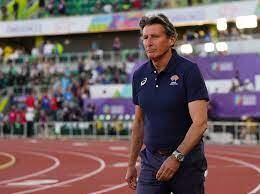
“Athletes and officials for Russia and Belarus are still excluded for the foreseeable future due to the invasion of Ukraine,” said World Athletics president Seb Coe.
In the case that Russia decides to leave Ukraine, Coe says his instinct is that the ban would be reversed, allowing Russian and Belarusian athletes to participate in all World Athletics events.
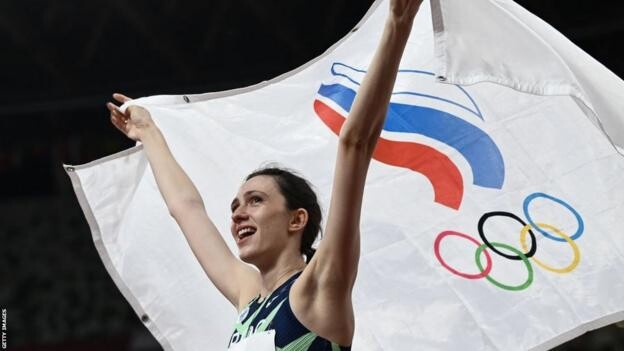
According to Rune Andersen, who served as the head of the World Athletics Task Force around reinstating the RusAF, told the WA Council that all required conditions have ultimately been met. RusAF has also accepted the ruling stating that there must be no backsliding from the new position.
“I believe RusAF still has a lot of progress to be made,” said Coe. RusAF has to follow 35 “special conditions” intended to ensure that anti-doping reforms remain in place, and continue to operate effectively. These special conditions will continue to be reviewed over the next three years.
The RusAF has been suspended from competing in World Athletics events since 2015 due to multiple doping violations. They are currently not eligible to host World Athletics events or send teams to international championships due to the World Athletics sanctions for the invasion of Ukraine.
“The integrity of our major international competitions has already been substantially damaged by the actions of the Russian and Belarusian governments through the hardship inflicted on Ukrainian athletes and the destruction of Ukraine’s sports systems,” said Coe in a press release. “Russian and Belarusian athletes, many of whom have military affiliations, should not be beneficiaries of these actions.”
The World Athletics stance on Russia continues to contrast with that of the International Olympic Committee (IOC), which is working to allow Russian and Belarusian competitors to participate in international competition and the Paris 2024 Games, as neutral athletes.
The reinstatement of RusAF was one of four noteworthy announcements to come from the 2023 World Athletics Council meetings.
by Running Magazine
Login to leave a comment
World Athletics bans transgender athletes from female category
On March 23, World Athletics announced a complete ban on transgender athletes competing in the female category. No athletes who have been through male puberty will be allowed to participate in women’s events from March 31st onward.
“Transgender athletes should not be competing in the female category,” said World Athletics president Seb Coe. “Science may be insufficient, but the council agrees it must be guided by our overarching principle to protect all biological females in our sport.”
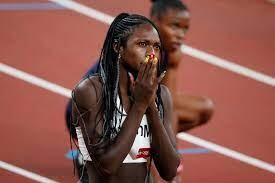
“This has not been an easy decision,” said Coe. “We entered a consultation months ago, we wanted to hear from all stakeholders, and the judgment we took was in the best interest of our sport.”
World Athletics will soon establish a transgender working group to bring data and science to the council meetings. The working group will give the World Athletics Council a better understanding of transgender athletes in our sport. Coe said he intended to appoint a trans female athlete as chair of this group.
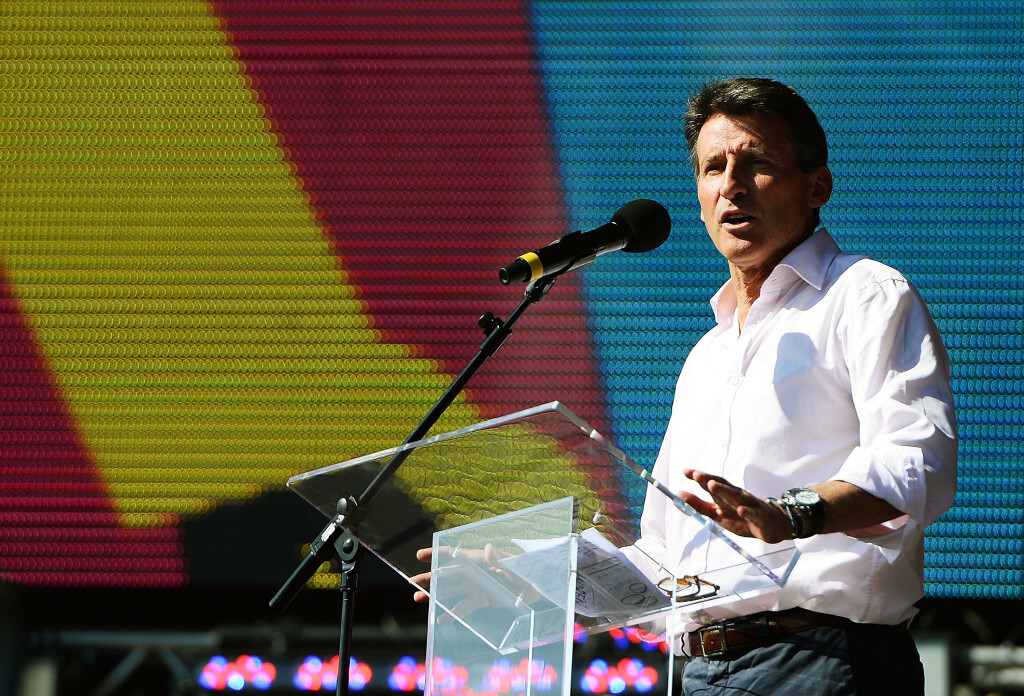
The previous World Athletics transgender policy stated to be eligible for female competition, athletes had to keep their testosterone levels below 5 nmol/L for a 12-month period. The new ruling will bar all transgender athletes from the female category.
“It was impossible to maintain the transgender regulations for what they were,” said Coe. “A full ban on transgender athletes in the women’s category is the right approach.”
The press conference also dealt with athletes in the DSD category. More information to come.
by Marley Dickinson
Login to leave a comment
80-year-old runs wild time at USATF 100 Mile Championships
The USATF 100-mile road national championships were held in Henderson, Nev. on Friday and Saturday at the Jackpot Ultra Running Festival, and while the elite men and women produced impressive results, the performance of the weekend has to go to David Blaylock, an 80-year-old athlete from Salt Lake City, Utah. Blaylock finished the race in a fantastic time of 29 hours, 47 minutes and 29 seconds, and he was followed by three other men in the 80-plus age division, each of whom finished the race.
80-plus division
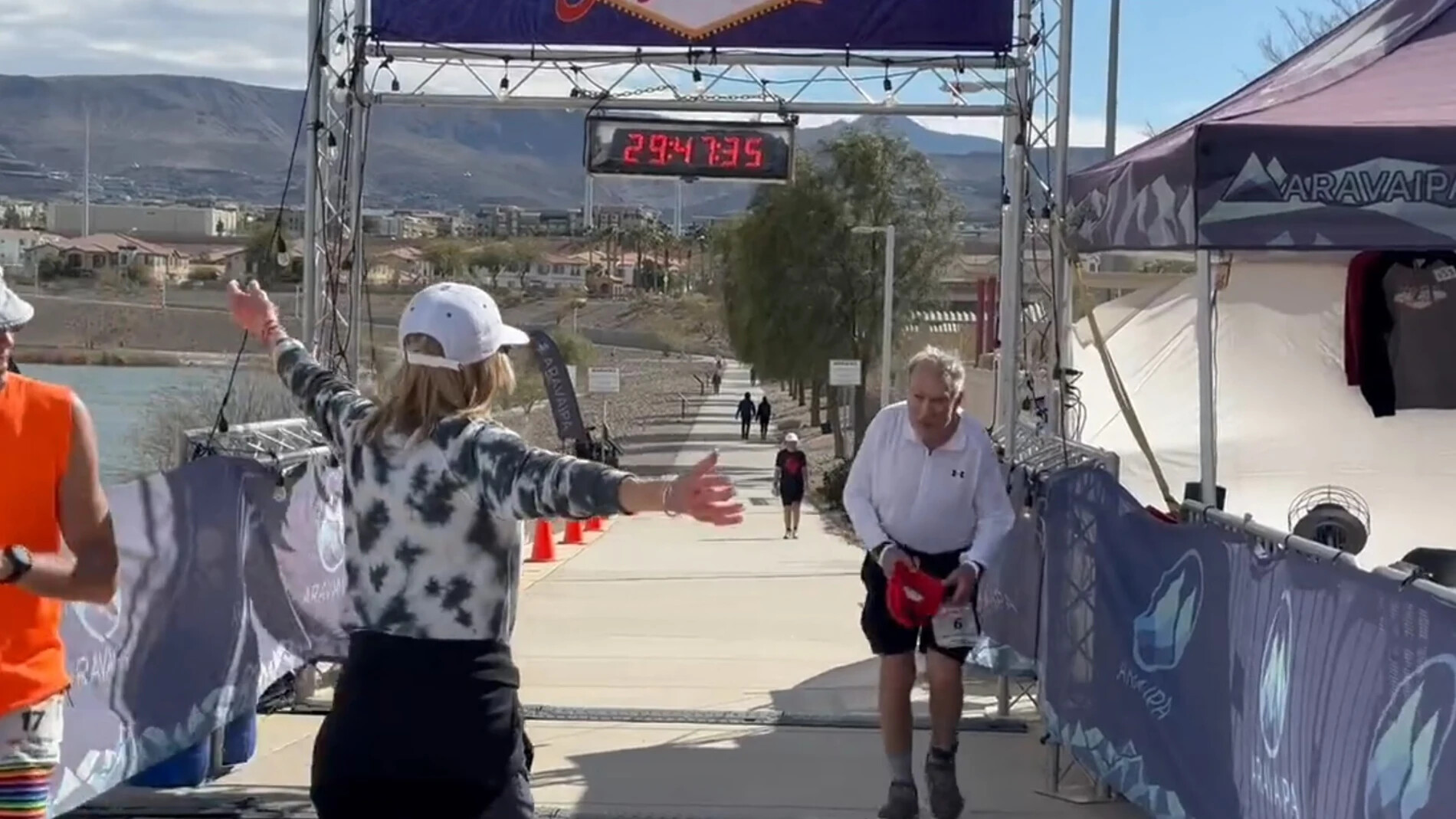
Before this year’s race, Blaylock had already raced the Jackpot 100 several times, and he had managed to break 30 hours on multiple occasions. In 2022, the final year of his 70s, he ran 31:56:28 at the event. While this was still a great result, it wouldn’t have been a surprise if Blaylock, now in the M80 division, didn’t break 30 hours again over 100 miles, but he did just that on Saturday, crossing the finish line with 12 and a half minutes to spare.
The fact that Blaylock ran 100 miles at the age of 80 is impressive enough, but his sub-30-hour result makes the achievement all the more amazing. His average pace was just over 11 minutes per kilometre for the 160K race. Although it’s unclear where Blaylock’s result ranks all-time among Americans, based on the USATF record books, his 29:47 sits near the top. The current M80 American record over 100 miles belongs to Maurice Robinson, who posted a time of 29:03:21 at a race in Kansas in March 2022.
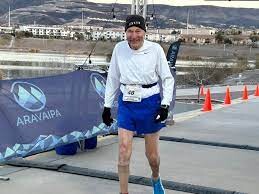
While Blaylock ultimately won the M80 race by more than 20 minutes, his victory was far from a lock. He had to chase 83-year-old Edward Rousseau for most of the run, and for a long stretch, he was an hour back of first place. It wasn’t until the 95th mile that Blaylock made the pass on Rousseau, and from that point on, his lead only grew.
Rousseau ended up crossing the line in a fantastic time of 30:09:08, and 80-year-olds Ian Maddieson and Denis Trafecanty finished third and fourth, respectively, in times of 37:15:39 and 37:59:42.
The elite races
San Francisco‘s Jonah Backstrom, 49, took home the men’s national 100-mile title with a winning time of 14:11:03. He won the race by more than 30 minutes over second-place finisher Zach Merrin, who finished in 14:48:59. Third place went to Pete Kostelnick, who stopped the clock almost an hour later in 15:47:24. In the women’s race, Nevada local Sierra DeGroff won in 15:59:56, just eking out a sub-16-hour result. She finished close to an hour ahead of second-place Lisa Cabiles, who completed the race in 16:42:54. Heather Huggins finished third in a time of 17:09:29.
by Ben Snider-McGrath
Login to leave a comment
Lattelecom Riga Marathon
If you have never been to Riga then, running a marathon or half-marathon could be a good reason to visit one of the most beautiful cities on the Baltic Sea coast. Marathon running has a long history in Riga City and after 27 years it has grown to welcome 33,000 runners from 70 countries offering five race courses and...
more...How I Won the World Cross-Country Championship at Age 83
Seventy years after his first cross-country race and 46 years after competing as an elite runner, the author competes—and triumphs—on a tough Australian course
Last weekend, in Bathurst, Australia, I did something I thought I would never do again: I ran once more in the World Cross-Country Championship. Not the main men’s open race, in which I competed for England in 1966 and New Zealand in 1977. Not at age 83. But for the first time, the World Athletics federation added Masters championships, and—almost like a dream—I not only participated again, but raced at the front of the M80 field and managed to outlast a stubborn Australian for the win.
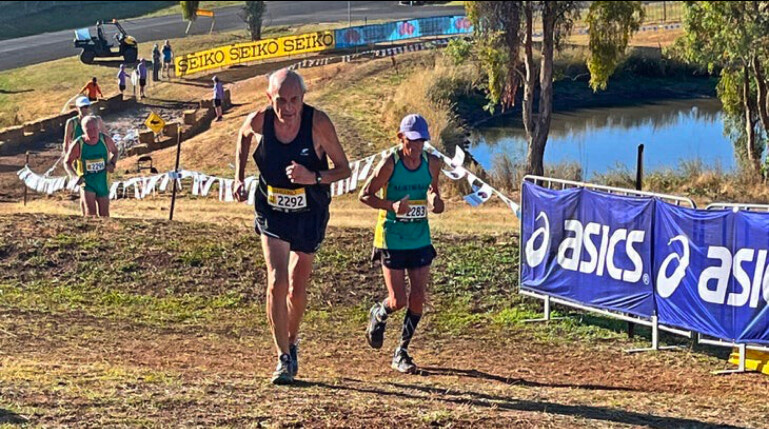
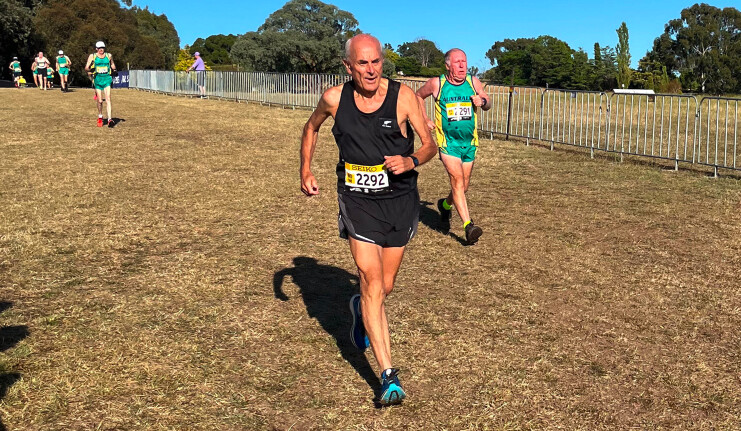
If you believe that running after eighty is about leisurely slow toddling, wait till you’re up there, racing to your limit, and you make the sharp u-turn at halfway and see that you are being closely stalked by a lean lanky Aussie with M80 on his bib and a threatening scowl like Mel Gibson in Lethal Weapon.
He is called James Harrison, and he made me work for it. I have won and lost many hard races over the years, and this was one of the hardest. The only possible tactic was unrelieved pressure. I finally broke him three-quarters through the four-kilometer distance, on the second two-kilometer lap, as we gasped up a big steep rough-surfaced hill that broke many hearts that weekend. At last, I sensed him drop. It took tenacity, months of focused training (including hill repeats), and years of learning the wiles that true cross-country demands.
This was a course where every decision counted about where you placed your next stride. Every sharp oxygen-draining uphill demanded that you keep momentum over the crest, every downhill was there for attack, not recovery, every tight turn required poise and pace. Those things don’t come easily after age eighty (and on two replaced knees in my case), but it was a World Championship of cross-country running, and we were there to take those tests.
I won’t claim the sheer thrill of winning the race was the same as ever. But it was real, and it had a private significance. I ran below my best in the senior world championship in the past. Nothing can change those results, but it felt good this time to get it right. And the sense of achievement is something that few things in the last years of life are ever likely to equal.
World Athletics, under President Seb Coe (who learned cross-country in England in his early teens), has grown tired of holding its cross-country championships on boring flat safe horse-race circuits, like those I encountered in my days in the main race. They decided to take some security risks to revitalize the sport. American senior administrator David Katz now acts as course consultant for each World Cross-Country, and insists on the real thing.
“Cross-country has one distinctive thing, the course. That has to be the talking point, and each one must be unique as the race moves around the world. The media and the public need to understand that cross-country is special in its challenges, not just another long race,” Katz said in Bathurst.
The previous championships in 2019 in Aarhus, Denmark, set the world chattering about a course that included loops over the steeply-sloping grassed roof of the Moesgaard Museum. This time (after several Covid-related postponements) the Aussies gave us a course that was a raw slice of the Australian outback. On the side of Mount Panorama, it was broken and unpredictable, rusty dirt, grey raggedy scrub grass, and diabolical hills. Scattered blue gum trees provided the only shade. Each morning, you could find fresh kangaroo poop.
They added some challenges to make it even more uniquely Australian. There was a “billabong,” of treacherous ankle-deep wet mud that caused many runners to skid and flop to a slimy downfall. (Some of the slower kids in the scholastic races lay down and daubed themselves heroically.) There was a dash through the straight vines of a winery, followed by tight turns, and, in honor of Bathurst’s motor-race circuit, a “chicane” where you had to steer through a forest of car tires.
High on a dry hillside there was a stretch named “Bondi Beach,” deep shifting sand decorated with lifeguard flags and “Beware of Sharks” signs. An Aussie joke, yet for the runners, another testing change of racing rhythm, another response to the challenge of contours and terrain. No other kind of running does that. Cross-country is the closest our sport gets to true interaction with the earth.
Added to all that was the Outback summer heat, 95 degrees for the main races on the Saturday late afternoon. In the different races, several runners were taken to hospital, and at least four passed out during the race, including, it seemed, the women’s favorite and race leader, Letesenbet Gidey (Ethiopia), who collapsed dramatically and glazy-eyed as she was passed by Beatrice Chebet (Kenya) within strides of the finish.
As a serious evening storm approached, its clouds like dark riders, the men’s race was hastily moved forward, and 22-year-old Ugandan Jacob Kiplimo had to win his first major title while lightning flashed behind the mountain and brutal wind gusts sent runners staggering. Slower runners were caught in torrential rain. Australia does nothing by half measures.
For me and many others, Australia was an unexpected opportunity. Three months before the race, World Athletics and World Masters Athletics announced that they were combining to add masters championships, part of a new and excellent policy to make the event a full cross-country festival, as well as the world’s elite team and individual championships. Hundreds of spectators doubled as competitors. I met so many old friends out there, it was like a global runners’ reunion.
In addition to the usual competitors from Europe, North America and Africa, there were teams from Fiji, Papua New Guinea, Tonga, and other Pacific nations, none of them obvious participants in a sport that is essentially one of cold winter.
I guess an 83-year-old who last ran the World Cross-Country in 1977 was another less-than-obvious participant. I never imagined it. I gave up cross-country for good, I believed, when my orthopedic surgeon confessed, after he watched me and the knee he had implanted struggle over a muddy course, that it gave him nightmares for weeks.
But a lifetime of racing has taught me that you have to seize the moment. Before committing, I watched videos of the course, which like a good actor came across looking much more attractive than it was. When I actually saw the steep downhills, I thought I was out of my mind. But another thing I have learned is that in running, only one thing is absolutely certain—you won’t run well if you’re not in the race.
I registered. I did the work. I seized my moment. I got the sheer thrill of winning a race. I was lucky in that the course’s surface proved (mostly) not too lumpy or too soft, and I was lucky in some top Europeans and South Americans not making the journey. In every race, you can only compete against those who show up.
Young readers, please note. In January 1953, aged 13, I ran my first cross-country race, in my high school’s inter-house league, well back in the field. Seventy years a runner. You never know what a high school race might lead to.
Being called world champion at 83 is a nice way to celebrate that small private anniversary—and at this age, I can surely be forgiven a memory lapse, if sometimes I forget to add “over-80.” It could also be a nice way to round off seventy years of running. Round off, except for the next race, that is.
(Roger Robinson ran the world cross-country championship for England and later New Zealand, and set a Masters record of 2:20:15 at the Boston Marathon. He is regarded as the outstanding historical writer on running. He recaptures history from personal observation in When Running Made History (Syracuse University Press) and he researches vivid and accurate accounts of the sport’s best stories in his new book, Running Throughout Time: the Greatest Running Stories Ever Told (Meyer & Meyer). Available through Amazon and all online outlets and bookstores.)
by Outside (Roger Robinson)
Login to leave a comment
No ban for Kenya, says World Athletics president sebastian Coe
World Athletics president confirms east African nation will not receive a global suspension from the sport despite an alarming spate of drugs positives.
Speculation that Athletics Kenya will be barred from international competition was proved unfounded on Wednesday (Nov 30) when World Athletics president Seb Coe said the country has escaped a ban but will continue to sit on an anti-doping ‘watch list’.
Speaking at a World Athletics council press conference in Rome, Coe said the large number of top Kenyan athletes to test positive for drugs was “concerning” but the nation will not receive a Russian-style suspension due to, among other things, a pledge by the Kenyan government to plough $5 million per year into anti-doping efforts over the next five years.
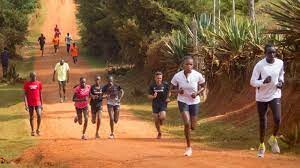
“World Athletics has been concerned,” said Coe. “Kenya has been on the watch list for a few years already.
“In one year 40% of all the positive tests in global athletics have been in Kenya and this is not a situation that World Athletics was prepared to sit and watch develop.”
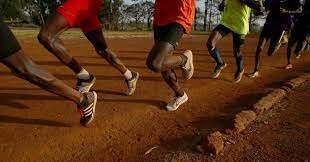
Coe added that there has been “a lot of recent reportage, some of which has been correct and some not. But we have made real progress.”
As well as the Kenyan government funding, Coe said the Athletics Integrity Unit (AIU) will continue to work closely with Kenya to implement the plan.
He added: “All stakeholders internationally and domestically are now aligned to resolve this situation and I am pleased we have a united response. But my instinct tells me it will be a long journey.
“This has to be collectively driven through all the stakeholders, internationally and domestically, who have a role and responsibility to solve this as quickly as possible.”
Coe said money would be spent on anti-doping education and “a deeper dive into the entourage of some of the people who surround the athletes”.
This, he said, “allows us more horsepower to challenge some of these issues”.
Kenya aside, an update on the ongoing Russian ban was tackled by Coe and Rune Andersen, head of the World Athletics taskforce on restoring Russia to global competition.
Coe emphasised that two separate sanctions exist – the anti-doping related ban and the sanction relating to the Russian invasion of Ukraine.
With regards anti-doping, good progress and cultural change has been made and Russia’s possible reinstatement into competition will be discussed again in March 2023.
Related to this, the Ukrainian Athletic Association was awarded the ‘president’s award’ as part of the World Athletics awards with Coe presenting Ukrainian AA president Yevhen Pronin with the honor during the press conference.
“I couldn’t think of anyone worthier than this for this year’s award,” said Coe. “What the Ukrainian Athletics Federation president, the coaches, and the athletes have done is just worthy of everyone’s respect and recognition.”
Elsewhere, Coe spoke about 2022 being “an immensely strong year for athletics” with four World Athletics Series events involving more than 4000 competitors from 180 countries with 554 national records and a television audience of more than one billion people.
The World Indoor Championships in Belgrade had an economic impact of $43m with the World Championships in Oregon having an impact of $273m.
The Continental Tour, meanwhile, saw 162 events with 12,000 athletes across 159 nations with 118 national records and 2400 PBs. Diamond League figures, Coe added, were not yet available for 2022.
Further council decisions included awarding the World Relays to Bahamas in 2024 as a qualifying event for the Paris Olympics. The road mile will become an official world record event from January. And the World Road Running Championships will switch from a biennial event to annual from 2025.
by Jason Henderson
Login to leave a comment
Tobi Amusan, Alison Dos Santos headline World Athletics climate change initiative
World Athletics (WA) announced the inaugural group of ‘Champions for a Better World’ on Thursday. Nine athletes, including three runners and six field athletes representing the six continental areas will lend their voices toward advocating for sustainable practices in sport and encourage other athletes to take a more active role in addressing environmental concerns. The athletes have been recruited to support WA’s efforts to reduce the sport’s environmental impact in alignment with the World Athletics Sustainability Strategy.
The Champions for a Better World group is announced as world leaders gather at the COP27 UN Climate Change Conference, and alongside new data from a survey carried out at four different WA championship events in 2022, with 737 athletes across 122 countries giving responses.
More than 76 per cent of athletes are seriously concerned or very concerned about climate change, with over 66 per cent feeling impacted directly by its effects. Seven in ten athletes believe climate change has already impacted athletics directly, and 90 per cent said that WA has a role to play in addressing sustainability in the sport.
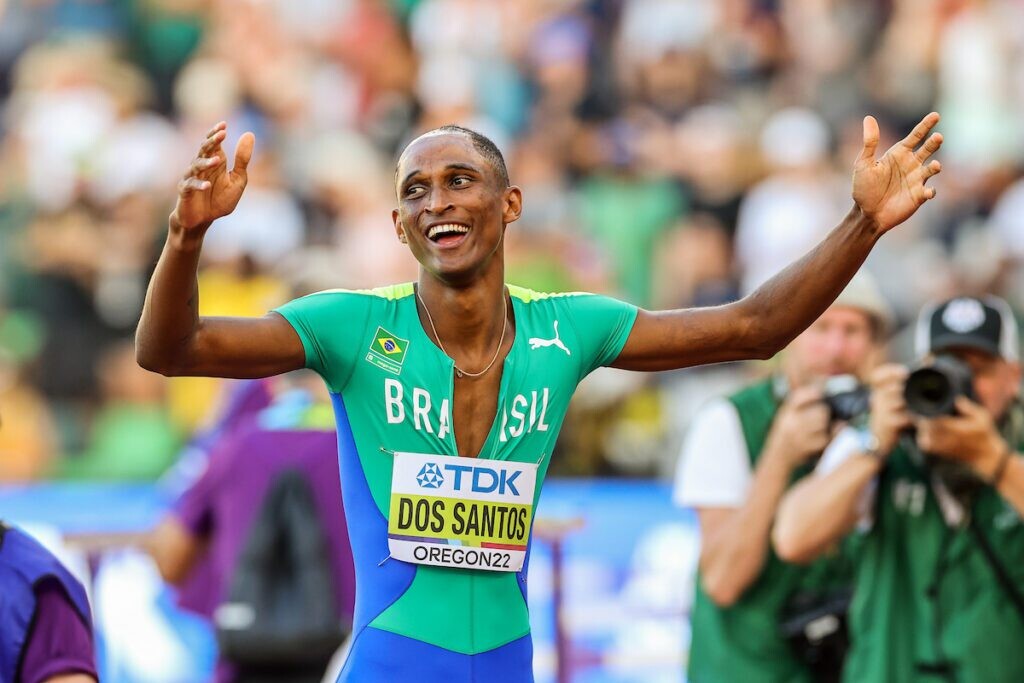
“It’s clear that an overwhelming majority of our athletes are very concerned about the impacts that climate change is having on their lives and on our sport,” said WA president Seb Coe. “It’s critical for us to act on those concerns, to put practical applications in place where we can, and to drive the sport forward with the advocacy and the high-profile voices that athletes can bring.”
Brazil’s 400m hurdle world champion Alison Dos Santos shared that he believes athletes have a platform to raise awareness: “As athletes, we have the important mission of raising awareness about the need to take care of the environment, both at social and economic level. Being able to influence others is very gratifying to me. I am very happy and enthusiastic about embracing this challenge.”
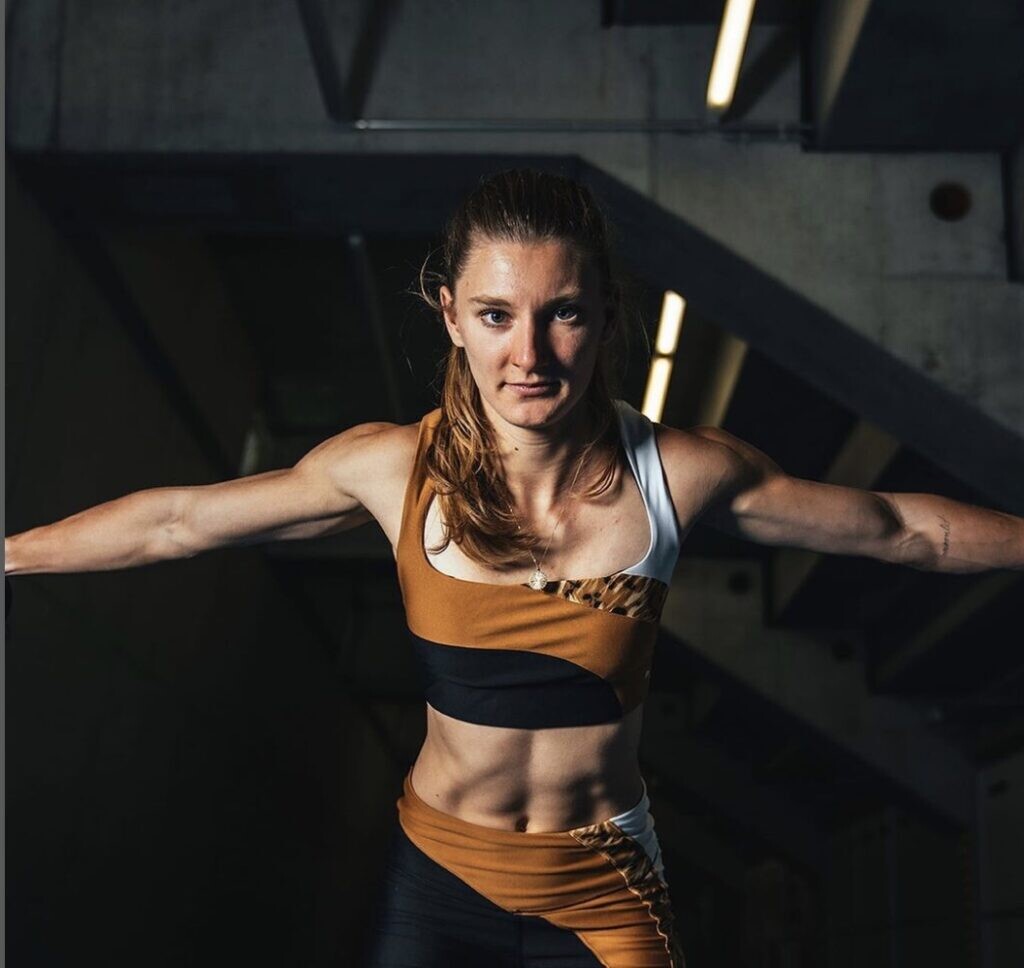
2022 Champions for a Better World
Track athletes
Tobi Amusan (NIG)100m hurdles world record holder, 2022 world champion
Ajla Del Ponte (SWI)sprints, 2021 European indoor 60m champion, 2022 Olympic 100m finalist
Alison Dos Santos (BRA)400m hurdles, 2022 world champion, 2021 Olympic bronze medalist
Field athletes
Kelsey-Lee Barber (AUS)javelin, 2019 and 2022 world champion
Sam Mattis (USA)discus, 2021 Olympic and 2022 World Championships finalist
Eliza McCartney (NZL)pole vault, 2016 Olympic bronze medallist
Ernest John Obiena (PHL)pole vault, 2022 world bronze medalist
Elena Vallortigara (ITA)high jump, 2022 world bronze medalist
Hugues Fabrice Zango (BFA)triple jump, world indoor record-holder, 2022 world silver medallist, 2021 Olympic bronze medalist
Video messages from each athlete will be shared on WA social media channels over the next two weeks.
by Keeley Milne
Login to leave a comment
America's Heather MacLean runs sub four minute 1500m in Monaco
Heather MacLean became the 12th American woman ever to break 4:00 in the 1500m today in Monaco, running 3:58.89. When she finished out her collegiate eligibility at UMass in 2018, she was a 4:19.19 1500m runner.
The Monaco track is known for its speedy middle-distance performances and in the women’s 1500m Faith Kipyegon came within three tenths of a second of breaking Genzebe Dibaba’s world record with 3:50.37.
Allie Wilson led through 400m in 59.89 and 800m in 2:01.64 before Adelle Tracey took over to keep the pace as hard as possible. Kipyegon hit the front with 600m to go and despite hammering the final lap she fell agonisingly short of the mark but still went No.2 on the all-time rankings.
America's Heather Maclean (3:58.89) and Elise Cranny (3:59.06) were second and third with sub-four performances.
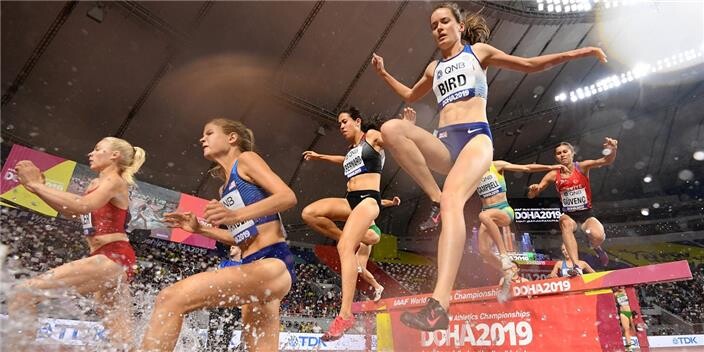
“I have been chasing the time for quite some time but I am happy with the personal best,” the Olympic and world champion said. “I knew this was the best place to get the world record but I am so disappointed I lost it in the last metres. I hope for the best next time. We will see when.
“I was definitely ready for it today. I am heading home now and want to get a good Diamond League final in Zurich.”
It was a first class track meet. World champion returns to winning ways at the Diamond League while fellow Brit Lizzie Bird smashes the national 3000m steeplechase record
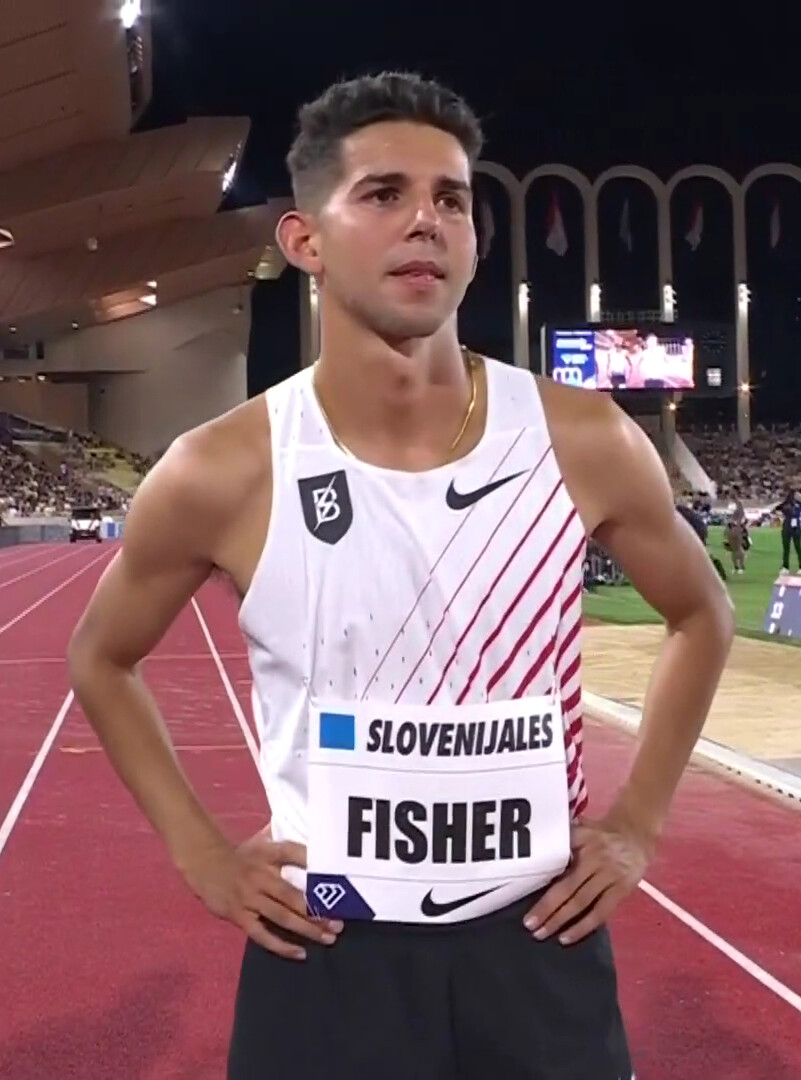
Jake Wightman bounced back to form after his defeat at the Commonwealth Games by taking the 1000m at the Diamond League in Monaco on Wednesday (Aug 10).
The world 1500m champion destroyed many of the world’s top 800m runners over the neutral distance of one kilometre as he improved his Scottish record from 2:16.27 to 2:13.88 to go No.3 on the UK all-time rankings and No.9 on the world all-time lists.
Seb Coe’s long-standing UK record of 2:12.18 remains an elusive target and Steve Cram is No.2 all-time with 2:12.88 but Wightman has now overtaken Steve Ovett and James McIlroy on the rankings.
In Monaco the pacemaker Erik Sowinski led through 400m in 51.02 and Marco Arop was in pole position through 800m in 1:45.46, but Wightman, who spent much of the race running alone in no man’s land a few metres ahead of the main pack, finished strongly to pass Arop in the final metres as Clayton Murphy was third, Commonwealth 800m champion Wycliffe Kinyamal fourth and the Olympic and world 800m champion Emmanuel Korir 12th.
“I did not really know I was in shape to do this today. It was just very, very hard as I had run on my own,” said Wightman. “I knew Arop is a little bit quicker on the home straight so I had to judge the right moment. I had to stay strong to be able to catch him.”
Wightman steps down to the 800m at the European Championships next week and said: “This is a really nice step towards Munich. The main difference between the 1500m and 1000m is just the speed of the first couple of laps. You go from running 55s to 52.”
Lizzie Bird smashed the British record for 3000m steeplechase as she improved Aimee Pratt’s national mark by almost eight seconds to 9:07.87.
Pratt set a British record twice at the World Championships last month as she ran 9:18.91 in her heat and 9:15.64 to place seventh in the final. But Bird ran 9:17.79 to take silver at the Commonwealth Games and here in Monaco swiped a further 10 seconds off her best as she pipped former world champion Emma Coburn at the finish to place third behind Ethiopia duo Workua Getachew and Zerfe Wondemagegn.
Bird, 27, was encouraged to try the steeplechase while studying at Princeton in the United States. She was a reluctant steeplechaser at first and suffered injuries from 2016-18 but set a UK record of 9:19.68 when placing ninth in the Olympics last year and the Shaftesbury Barnet athlete is now closing in on the nine-minute barrier while combining athletics with a career in immigration law based in Colorado.
There is more: Distance runner Grant Fisher’s record-breaking 2022 season continued tonight at the Herculis meeting in Monaco where he ran 7:28.48 for 3000 meters, finishing 3rd, to break Bernard Lagat’s 7:29.00 American record which had stood since 2010.
Fisher’s 3000 record is his third American record of the year as in February he set the indoor 5000 record (12:53.73) and outdoors he set the American 10,000 mark in March(26:33.84).
Login to leave a comment
Josh Kerr hopes to make history at Hayward Field
Josh Kerr knows the history, that long line of British middle-distance greats who all but monopolised the men’s 1500m back in the 1980s. Those names – Seb Coe, Cram, Ovett, Elliott – conjure up memories of grainy footage, the kind Kerr has watched countless times on YouTube.
Now that he’s run faster than them all – his PB of 3:29.05 is behind only Mo Farah on the British all-time list – Kerr feels part of that lineage, especially after winning an Olympic bronze medal last year.
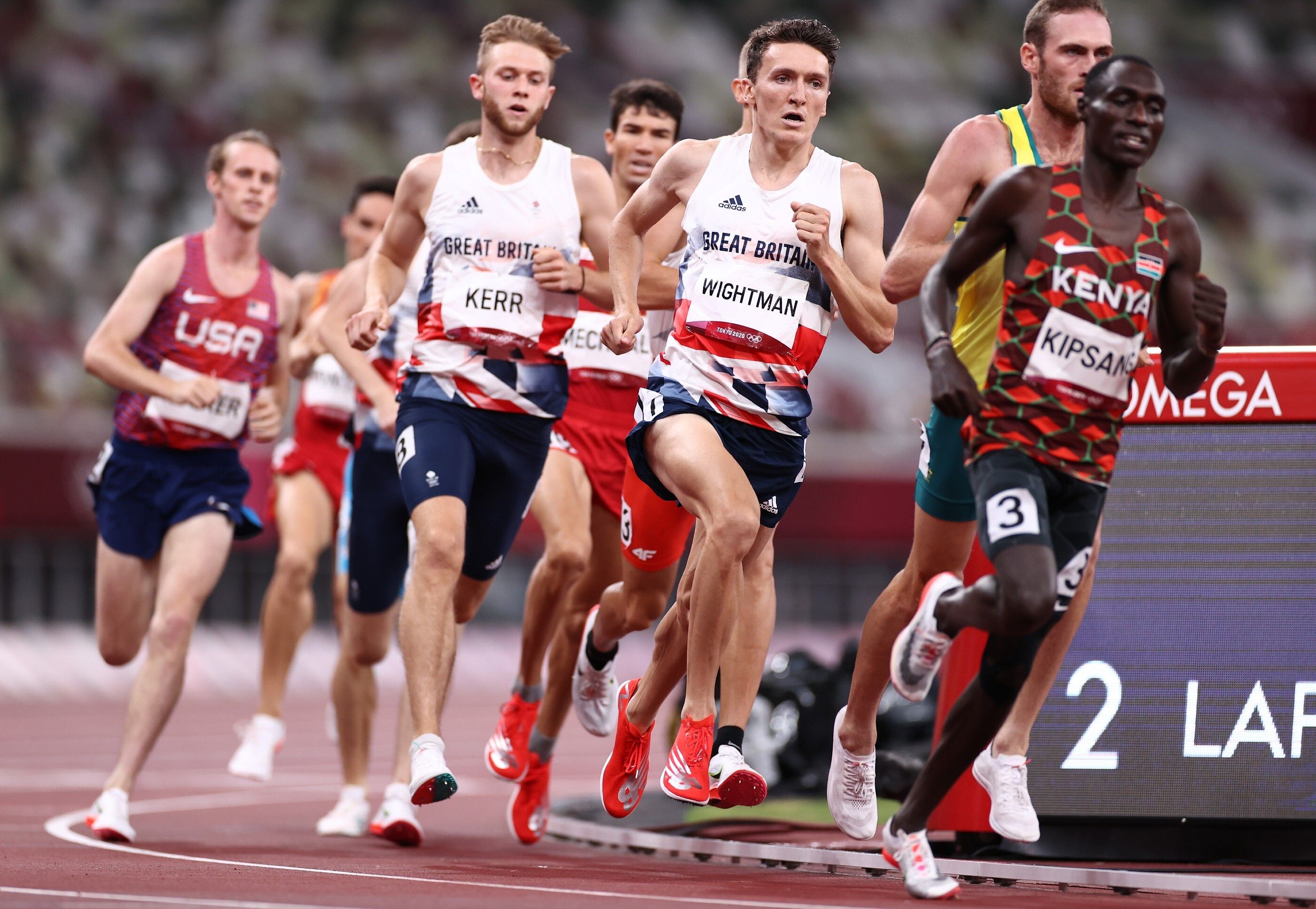
But as much as he appreciates the achievements of past generations, the 24-year-old Scot is keen to kickstart a new golden era.
“Myself and (Jake) Wightman, we’ve run faster than all those guys but they’re not known for how fast they ran, they’re known for what medals they won and what colours they are,” says Kerr. “We hadn’t won an Olympic medal in 33 years and hopefully we’re moving back into an era people will remember as the Kerr-Wightman era. I want to leave a stamp on the 1500 and grab that British record as an extra.
“But,” he adds, “it’s mostly about medals.”
The game is changing these days. In the decade preceding the 2019 World Championships, the quickest winning time in a global 1500m final was 3:33.61, and in just two out of seven championships did the winner come home in under 3:35.
Then there was Doha, where Timothy Cheruiyot blitzed a solo 3:29.26 to take gold. Two years later in Tokyo, Jakob Ingebrigtsen outkicked and outlasted Cheruiyot to set an Olympic record of 3:28.32.
Cheruiyot is 26, Ingebrigtsen is 21. Neither is going anywhere any time soon, and both are at their best when the pace is hard from the gun, which means that when it comes to global finals, the future is almost certainly fast.
Kerr knows this, and he prepares accordingly.
“The 1500 has evolved over the last two or three years,” he says. “We have to be strong and we train like a 5km athlete. That helps, knowing I’m going to get better round by round. It’s exciting for people to watch and it’s really hard for us racing, but that’s what we’re there for: to find the best.
“I do believe the world and Olympic champions over the next three or four years will be true champions – who are the best at the distance. Jakob last year was the best and he showed that in the final and Cheruiyot was second and I was third: those are honest, clear-cut, black-and-white results, and you can’t ask for anything more.”
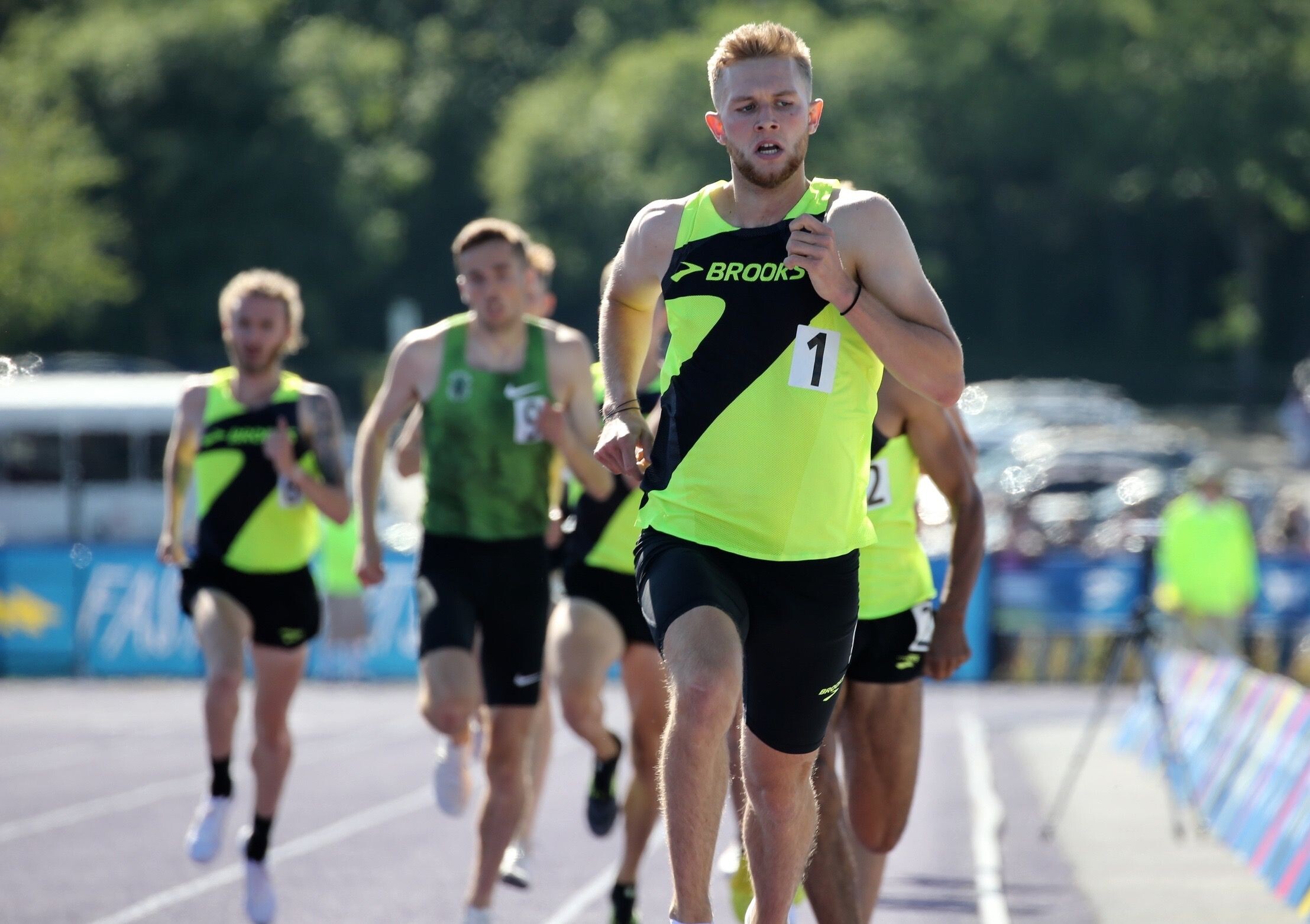
Kerr prepared for Tokyo in his typical manner, racking up 65-70 miles (104-112km) a week in training, along with two gym sessions. It’s been his approach since 2018, when he joined the Brooks Beasts in Seattle and began training with coach Danny Mackey.
Being a three-time NCAA champion for the University of New Mexico, the Scottish athlete had a wealth of options in the professional ranks. Why did he choose the Brooks Beasts? It came down to his trust in Mackey.
“I’ve had the most amazing, honest conversations with him,” says Kerr. “He knows me very well, I know him very well. He said, ‘this is the coach I am, we’re not the flashiest group but you come here, you’ll get better.’ He stayed true to that promise. I’ve got six seconds quicker since I’ve gone there.
“The training isn’t massively intense but what I do really well: my injury rate is really low and I’m able to stack a bunch of days together and it ends up being a phenomenal fitness level.”
That was exactly what Kerr carried to Tokyo, and while his 1500m PB of 3:31.55 had many underrating him at the time, his workouts convinced him he was ready to run 3:28.
“I thought, ‘you know what, the best way to run that is evenly,’” says Kerr. “I wasn’t planning on being so far at the back after the first lap but it was just so fast.”
Kerr narrowly avoided disaster in the heats, scraping through as a non-automatic qualifier, but he was far more convincing in the semifinal, finishing a close third.
After the first lap of the final, with Ingebrigtsen pouring it on from the outset, Kerr was 10th, splitting 57.3 seconds. By 800m he’d moved up to seventh. By 1200m, he was fourth, and ready to take aim at the big two out front – Ingebrigtsen and Cheruiyot – along with Abel Kipsang of Kenya. Kerr waited until the home straight before going for broke, overtaking Kipsang and finishing just 0.04 behind Cheruiyot.
“I was hoping for a better medal than the one I got,” he says now.
After the Games, he went to Albuquerque, USA, to spend time with his fiancee and a few weeks later he returned to Scotland. The last six months have been a “whirlwind”, but after a few weeks off Kerr was back into base training to prepare for better things again in 2022.
“It’s about building the motivation back up, climbing back up the hill with fitness and trying to show some better performances,” he says. “And hopefully better colour of medals.”
He had just one race set in stone for the indoor season: the Wanamaker Mile at last month's Millrose Games, a World Athletics Indoor Tour Gold event. After biding his time for seven laps, Kerr powered to the lead at the bell, but couldn’t hold off the vicious surge of longtime rival Ollie Hoare, who won in 3:50.83 with Kerr second in 3:52.27, just shy of Peter Elliott’s British record of 3:52.02.
“First one of the season is always going to be a bit rocky but I told myself I’d be aggressive, I’d push,” says Kerr. “I may have pushed a little bit too early, but I gave it my all. I like to press a little bit and see who falls apart, and it might be me. I’m not scared of anyone or any distance or any race.”
That may be Kerr’s only race of the indoor season. With an outdoor season overflowing with medal opportunities, he’s giving that his prime focus.
His main targets are the World Athletics Championships Oregon22 in July and the Commonwealth Games in Birmingham. Only after that will he make a decision on the European Championships in Munich.
“Because that’s enough for my brain to explode,” he says. “We’ll take it step by step.”
When he speaks of such championships, Kerr does so with a calm but resolute confidence that he can beat whoever he faces. It’s not surprising, given he has a habit of toppling favourites.
When he lined up in the mile at the 2017 NCAA Indoor Championships, he was a 19-year-old with a 1500m personal best of 3:41.08 – an athlete no one expected to challenge the all-conquering Ed Cheserek.
When Kerr surged past Cheserek with two laps to run, the ESPN commentator all but dismissed his chances: “That’s Josh Kerr, the New Mexico freshman, and that may just be a freshman move.”
But it wasn’t. Kerr ran Cheserek into the ground during the final lap, coming home a distant winner. He added the NCAA title outdoors that year – winning the 1500m at Hayward Field in Eugene, Oregon – and repeated his indoor win in 2018. Those successes taught him he could contend at global level.
“You have that mindset of wanting to be the champ, to go after the fastest guys,” he says. “You don’t care who anyone is, and if you have that fearless mentality you’re going to be fine in the pros. But if you always look at stats and look up to these guys, you’re going to find it hard to toe the line against them.”
Does he believe he can match Ingebrigtsen and Cheruiyot this summer?
“Yeah, definitely,” he says. “It’s quite funny, but people were saying, ‘any other Olympics you’d have won with the times,’ but they’re different races. The 1500m is exploding because of the way we’re running these races. Those guys are doing great things for the sport.”
Kerr knows those two will likely be the men to beat again in Eugene this summer. He’s not yet raced in the new-and-improved Hayward Field, but is relishing the chance to do so.
“It’s over the top,” he laughs. “It’s a phenomenal facility and I’m excited to go there and run fast. It’s built for fast times and for history to be made, and that’s what’s going to happen this year.”
He knows his sport’s history, but he also knows his own, and Kerr can extrapolate plenty from it about what might lie ahead.
“I was 37th (at the World Championships) in 2017, sixth in 2019, and third (at the Olympics) in 2021,” he says. “So in 2022 the trajectory is looking like second or first. That’s always what I’m going for. I’m always looking for progress.”
by Cathal Dennehy (World Athletics)
Login to leave a comment
World Athletics Championships Budapest23
Budapest is a true capital of sports, which is one of the reasons why the World Athletics Championships Budapest 2023 is in the right place here. Here are some of the most important world athletics events and venues where we have witnessed moments of sporting history. Throughout the 125-year history of Hungarian athletics, the country and Budapest have hosted numerous...
more...Track And Field Maintained Its Position As The #1 Olympic Sport At The Tokyo Games
Figures from the Tokyo Games show track and field is more popular than anything else but World Athletics president Seb Coe warns we should not rest on our laurels
Recent years have seen cycling, swimming and gymnastics threatening the traditional supremacy of athletics as the biggest and most popular Olympic sport. Triathlon, beach volleyball, surfing and skateboarding are all making their mark too.
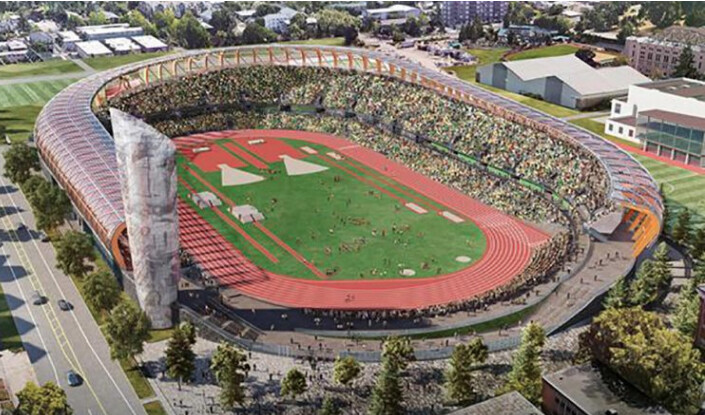
Track and field athletics, though, remains the No.1 sport at the greatest show on earth. World Athletics president Seb Coe says it is not based on anecdotal evidence either but pure stats.
“We had the highest number of broadcast viewing hours in Tokyo by some distance ahead of any other Olympic sports with some 2.2 million hours,” he said on Friday during an end-of-year interview.
“Athletics had the largest number of media articles written about it – some 10,000 – compared to other sports,” he added. “We had the highest number of shared articles across social media, which was roughly about 700 million, and that led to over 62 million conversations on social media around athletics, plus the highest number of video views across the IOC and the Tokyo Olympic Games websites and app of more than half a million.”
These Games-time findings are related to the study commissioned by the IOC to Publicis Sport & Entertainment (PSE), an independent agency that collected and consolidated the sport and event data from a variety of third-party sources across a number of pre-established territories from all continents.
Coe admits he enjoys rubbing this in when he is in IOC circles or mingling with people from other sporting governing bodies. But he refuses to get complacent.
When asked if he feels athletics has been in danger of losing its pole position in recent years, or whether it might stumble in future, he replies: “Look, it’s actually not a bad trait in life to be slightly paranoid about everything. While I’m president of World Athletics it’s my intention to make sure that our sport becomes stronger, more globally representative and that every time we leave a championship we’ve got data to reflect on.
“I say this with pride that we are the No.1 Olympic sport, but that’s only one metric because there are other sports such as basketball, which is an Olympic sport but if you see it in its professional manifestation (it is huge).
“So we have to recognise that there are other sports out there and there are other sports that we may not even be thinking about at the moment. I read a very interesting piece recently which was looking slightly into the future about the fact there are AI algorithms that are actually at this moment trying to figure out what the next sport might look like.”
Coe says World Athletics plan to work on improving the sport’s popularity in 2022 and have a brilliant opportunity to leave “an indelible footprint” at the World Championships in Eugene, Oregon.
The global governing body plan to do this via social media but without neglecting the role of television. “We can’t underestimate the power of TV,” says Coe.
There are also, he reveals, discussions to produce a Netflix-type documentary series about athletics in a similar style to the Drive to Survive programmes about Formula 1 and The Last Dance about the Chicago Bulls basketball team during the Michael Jordan era.
“EBU (European Broadcasting Union) is talking about some quite creative stuff,” he says, “maybe even a documentary series around athletics – a similar kind of Netflix Drive to Survive documentary which would allow (cameras) to go behind the scenes and allow us to access new audiences which might not naturally gravitate to our sport in the same way that Formula 1 has been dramatically impacted by that. Similarly, European interest in basketball was sparked by The Last Dance. These are important vehicles and I think we should be utilising those.”
“We cannot rest on our laurels,” he continues. “And while it’s nice to be able to say we are the No.1 Olympic sport, it can’t just become an academic conversation because the biggest challenge we’ve got is probably not from sport. It’s from other areas of activity where young people have a shorter focus.
“What they consume in terms of content is much shorter (these days). If you speak to anybody in broadcast, they’ll tell you that the average length that most people would prefer to watch television programme is about 7-8 minutes. So it means that we’ve got to be very clear that our benchmark is not just sport.
“If our activity is sport, our business is entertainment – and we mustn’t forget that. And that’s not to jettison what we celebrate as our sport. But we have to just recognise we live in a very fast changing world and sport is only one element of that in the lives of young people. And for some young people, it’s less important than it’s ever been. And we need to make sure that we just move with those times.”
by Athletics Weekly
Login to leave a comment
Sebastian Coe states stand on vaccination of athletes
World Athletics will not force athletes to be vaccinated against Covid-19.
But the world track and field governing body’s President Seb Coe maintains that it would be prudent for the athletes to get the jab “for the greater good.”
In the last few days, world sport has felt the effects of the latest Omicron variant of the coronavirus with several English Premier League matches suspended to curb the spread of the virus.
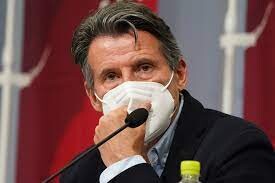
On Friday, agencies reported that Manchester City manager Pep Guardiola was forced to cancel a pre-match press conference after returning an inconclusive coronavirus test result.
AFP reported that Guardiola must now await the result of a follow-up PCR test before finding out if he will be able to lead the English champions for Sunday’s trip to Newcastle.
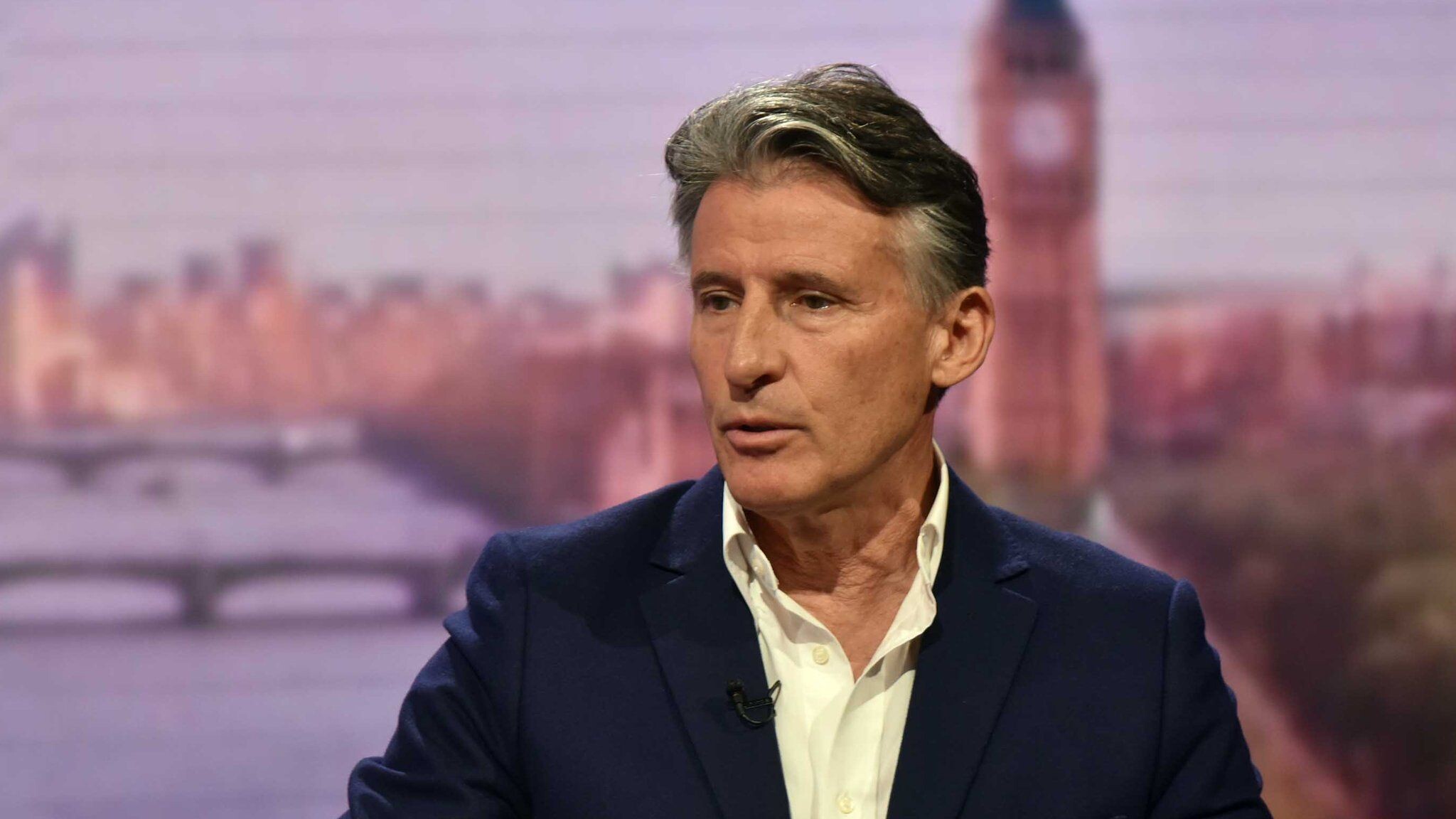
Also, the Confederation of African Football on Thursday announced that supporters attending matches at next month’s Africa Cup of Nations in Cameroon will be required to show proof of vaccination and present a negative Covid-19 test result.
In a Zoom interview with Nation Sport on Friday, Coe said World Athletics was studying the situation but would not force athletes to get the vaccinations.
Coe said he had just held discussions with Stephane Bermont, World Athletics’ director of health and science department, about the challenges athletics will be confronted with in a few months.
“We don’t understand yet as much as we need to about Omicron, and it will be a few weeks before we understand, through the data, the full impact,” Coe responded to a Nation Sport question.
“But we have to assume that for the moment, and for the next few weeks, there are going to be some difficulties. My personal view — and I’m not really speaking on behalf of World Athletics, but I guess it’s inevitable that I do — is that I’m always aware about personal liberties,” Coe explained regarding vaccination.
“I’m not comfortable about telling athletes they have to be vaccinated — there may be good reasons why they choose not to be, and there may be health reasons why they choose not to be…
“But all I’d say, if they have the ability or potential to be vaccinated, I think it’s a sensible approach (to be vaccinated).
Coe noted that while he’s not forcing athletes to be vaccinated, individual countries are going to be more demanding about everybody, and vaccination may be inevitable.
“My advice to athletes is if you have the ability to get the vaccine, it is probably a sensible thing to do, but I’m not yet at that point where I need to be mandating or telling athletes that they have to do that.”
Coe noted that the vaccination debate is more than an athletics issue, stressing that communities around the sport must also be kept safe.
“We don’t want (to host) events that are super spreaders. We have to be mindful of those communities that we join, and which host our events because we don’t want to leave them with rising numbers – it’s not just the welfare of athletes but also the welfare of communities that host our events.”
by Elias Makori
Login to leave a comment
Sebastian Coe optimistic of great year ahead despite Covid-19 threats
World Athletics (WA) President Seb Coe is confident the global athletics governing body is well equipped and informed to continue organising top level competitions while tackling the challenges posed by Covid-19.
Eugene, in Oregon State, will host the 2022 World Championships at the brand new Hayward Field Stadium in the heart of the University of Oregon from July 15 to 28.
“It’s absolutely vital that whenever we have a World Championships, we do everything we possibly can to have our seats absolutely full,” Lord Coe said.
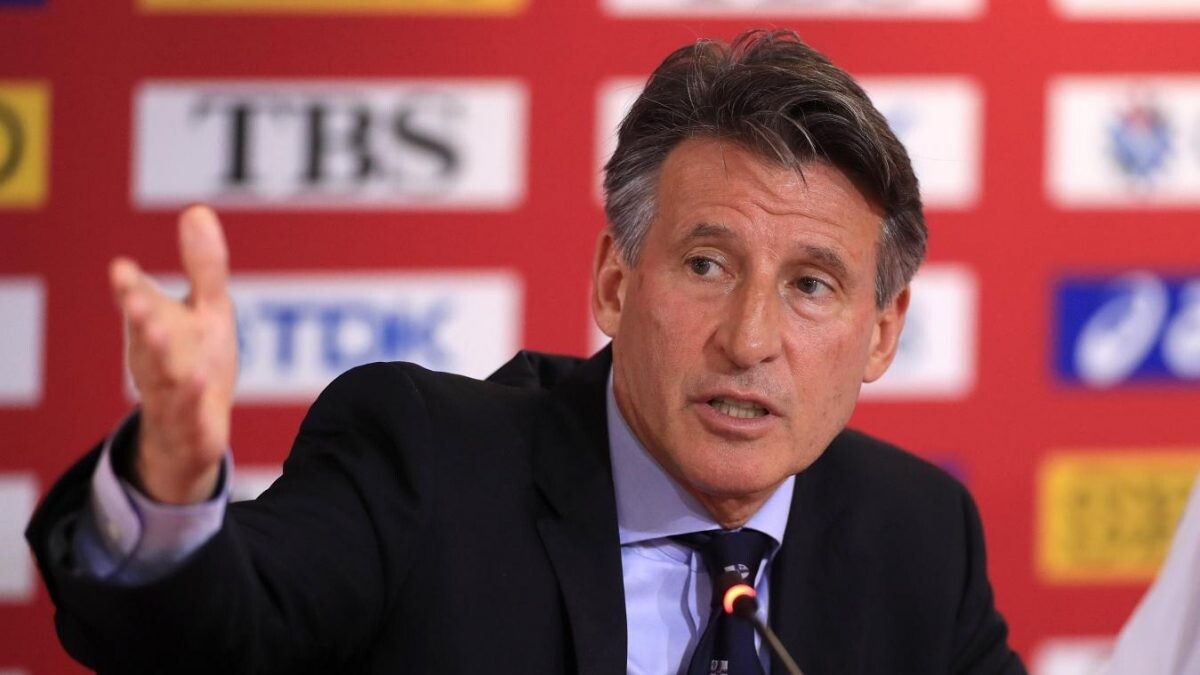
“And that’s not just the work of the LOC (Local Organising Committee). That’s also the work we need to do at World Athletics to make sure that we have all the right initiatives in place to help sell tickets.”
He acknowledged the fact that with more insights on Covid-19 and with sports having developed protocols to guard against the spread of the coronavirus at competitions, it will be easier to navigate through the virus.
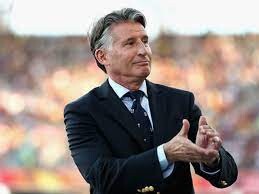
But he conceded that with the unpredictable nature of the virus, nothing could be cast in stone on the programme.
“We know a great deal more about the management of Covid-19, both medically and within our own stadiums.
“Our health and science teams have probably led the world in making sure that we stage events that are safe and secure to protect the athletes and crucially to protect those communities that are hosting our events.
“But the world is an uncertain place at the moment. We will have all the protocols and processes in place, but we can’t at this moment guarantee our borders remaining open if the pandemic suddenly takes a turn for the worse.
“We don’t have enough data to know if this variant (omicron) is more transmittable but not causing more illness… all that, I’m afraid, we have to wait for scientists and governments to decide on the direction forward.
“But we will do everything we possibly can to ensure that the stadium in Oregon is full and that people are able to travel, but we can’t obviously open borders that are closed by governments. That remains a challenge to us.”
The WA President said next year - and the next four seasons - will be crucial to the sport, and is excited that USA has finally come round to organising a global competition as they hold a special place as the world’s biggest sports market.
The last major global athletics events hosted by USA were the 2014 World Junior (under-20) Championships in Eugene and 1992 World Cross Country Championships in Boston along with the 2016 World Indoor Championships in Portland.
“We have four major athletics events and also the European Championships (next year).
“We have a global championship every year for the next four years and that will mean working very closely with all our organizing committees.
“The United States is very important for us, to help grow the sport. It’s the largest sports market in the world, and it’s also an opportunity for your athletes to have more competitive outlets and to grow their profile in a very important market."
“But the world is an uncertain place at the moment. We will have all the protocols and processes in place, but we can’t at this moment guarantee our borders remaining open if the pandemic suddenly takes a turn for the worse.
“We don’t have enough data to know if this variant (omicron) is more transmittable but not causing more illness… all that, I’m afraid, we have to wait for scientists and governments to decide on the direction forward.
“But we will do everything we possibly can to ensure that the stadium in Oregon is full and that people are able to travel, but we can’t obviously open borders that are closed by governments. That remains a challenge to us.”
The WA President said next year - and the next four seasons - will be crucial to the sport, and is excited that USA has finally come round to organising a global competition as they hold a special place as the world’s biggest sports market.
The last major global athletics events hosted by USA were the 2014 World Junior (under-20) Championships in Eugene and 1992 World Cross Country Championships in Boston along with the 2016 World Indoor Championships in Portland.
“We have four major athletics events and also the European Championships (next year).
“We have a global championship every year for the next four years and that will mean working very closely with all our organizing committees.
“The United States is very important for us, to help grow the sport. It’s the largest sports market in the world, and it’s also an opportunity for your athletes to have more competitive outlets and to grow their profile in a very important market."
“We also have Cali (Colombia) Under-20 World Championships, hot on the heels of Oregon 2022, and the following year we are back to the World Under-20 Championships in Lima, Peru."
“This is a great opportunity to make gains not just in US, but in South America too.”
Coe also highlighted the successes of athletics in 2021 saying the sport remains in really good shape, highlighted by both athletes’ performances and commercial success at the Tokyo Olympic Games.
“We leave 2021 as a sport in really good shape. We needed to stay focused in order to deliver the championships that we did, and create a platform for the athletes, which we did, and the Tokyo Olympic Games particularly for African athletes was a really important platform… and, my goodness!, they grabbed that platform in a really, really good way!”
“We also maintained, at the same time, all our competitions, and we maintained the work streams that we feel are really important in growing our sport.”
The former Olympic champion and middle distance world record holder noted that WA also revamped their competition calendar and drove further interest in the second tier Continental Tour one-day meeting series.
“I’m very grateful to the Kenyan federation particularly for their help in extending that footprint in Africa for us,” he noted, appreciating the success of the September 18 Kip Keino Classic at Kasarani which was the final stop of the 2021 WA Continental Tour circuit.
“Our strategic partnerships – and these were really important: In broadcast, we extended broadcast arrangements with NBC and, crucially for Africa, with the European Broadcast Union, not just with our broadcast arrangements with Europe, but also extends into Africa and that’s very, very important.
“Both contracts have been secured until 2029 with a healthy uplift.”
Coe mentioned the importance of the World Athletics World Plan, describing it as an important roadmap which will create the pathway for the next years.
“It sets up 19 objectives and 67 different actions. It builds on the four-year strategic plan, whose four pillars are: More people; More participation; More partnership; Broadening fan base.
"The top lines from that will help us, particularly given the global focus driven by Covid-19 around healthy communities is driving kids’ athletics, not only as a way of encouraging more young people into our sport, but also as a way of helping in that drive to make our communities fitter and healthier – as athletics is the most accessible to communities globally.”
by Elias Makori
Login to leave a comment
Ban on cannabis, should be reviewed says World Athletics president Seb Coe
The rules on the use of cannabis by athletes should be reviewed, World Athletics President Sebastian Coe has said in the wake of the case that meant Sha'Carri Richardson, winner of the women’s 100 meters at the US Olympic trials, missing Tokyo 2020.
Richardson accepted a 30-day ban, and the qualifying results she achieved were annulled, after she tested positive for the banned recreational drug during the trials.
The 21-year-old said she had been under emotional stress after learning of the recent death of her biological mother.
In response to questions on the issue, Coe has said a review is now sensible and "it should be" done, Reuters reports.
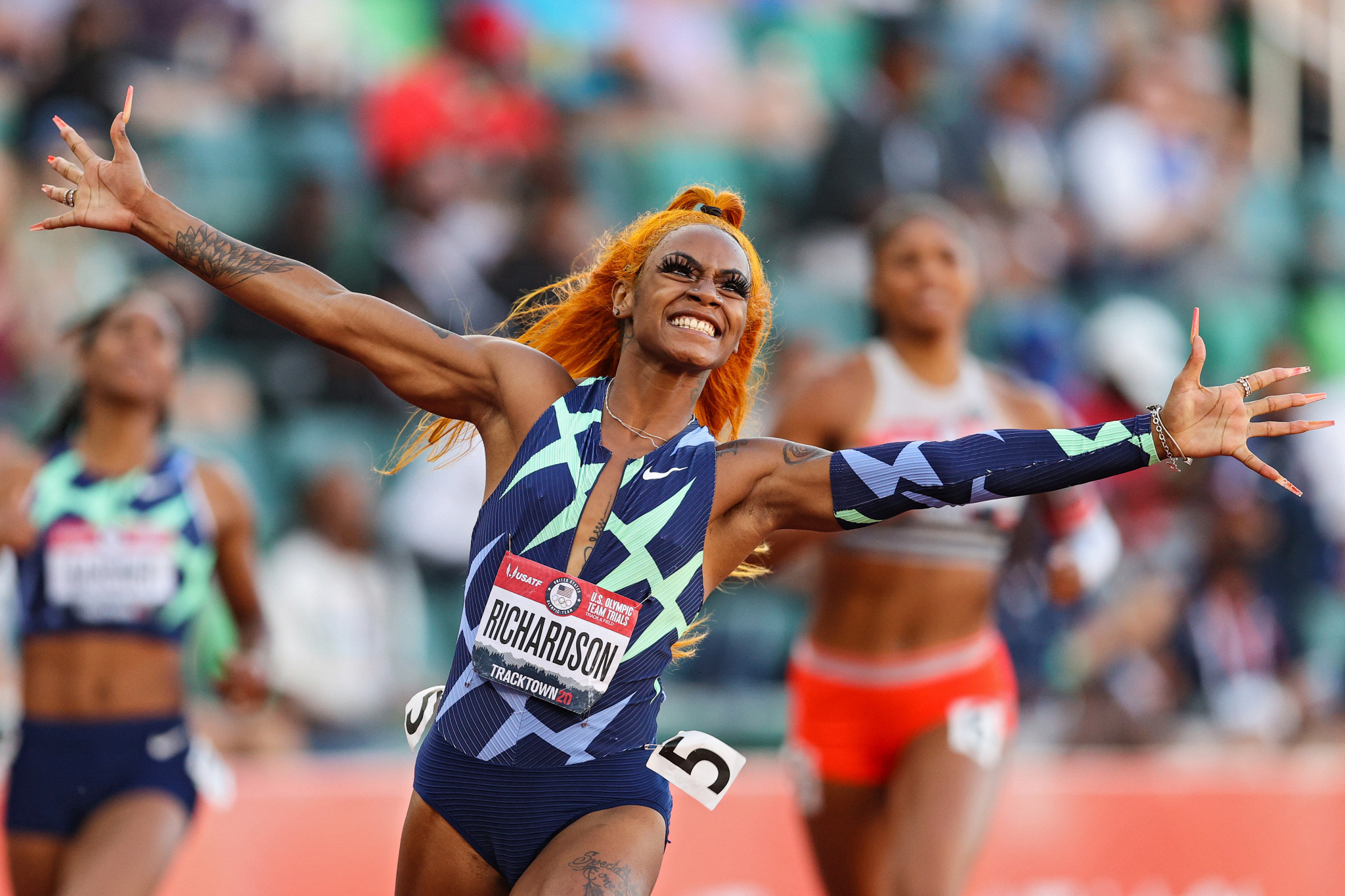
Coe added: "I am sorry for her that we have lost an outstanding talent [from the Olympic Games]", but said that existing rules were interpreted correctly.
The World Athletics President said he had asked the independent Athletics Integrity Unit (AIU) to work with the World Anti-Doping Agency (WADA) on reassessing marijuana’s place on the prohibited list.
Coe, who believes the matter is a question for experts at the AIU and the WADA to determine, said Richardson’s absence was "a loss to the competition" but predicted "she will bounce back".
The 2021 World Anti-Doping Code classifies tetrahydrocannabinol (THC), the main psychoactive constituent of cannabis, marijuana, and hashish, as a "Substance of Abuse".
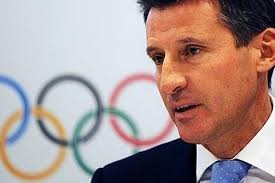
Athletes found to use it outside of competition face a three-month ban, although in this case the United States Anti-Doping Agency banned Richardson for 30 days as long as she also undertook a treatment programme.
Discussion on this matter is not expected to take place during the World Athletics Council’s two-day meeting that starts tomorrow before the Olympic track and field programme begins on Friday (July 30) - at least officially.
What will be under consideration is a determination of the hosts for the 2023 World Athletics Relays, held this year in Poland, the newly-established 2023 World Road Running Championships, and next year’s World Race Walking Team Championships, where a replacement is being sought for original host Minsk.
World Athletics cited "uncertainties around diplomatic relations and international travel restrictions with regard to Belarus" when stripping Minsk of hosting rights earlier this year, with protests continuing after the controversial re-election Alexander Lukashenko as the country’s President last August and many nations imposing sanctions on Belarus.
There will also be a report from World Athletics' Russia Taskforce at the Council meeting.
Day two of the meeting is understood to involve commission and working group reports.
by Mike Rowbottom
Login to leave a comment
Ron Hill turned the art of marathon running into a science and wrote the playbook for generations to come wrote Seb Coe
A tribute to Ron Hill. World Athletics is deeply saddened to hear that Britain’s Ron Hill, the 1969 European marathon champion, died on Sunday May 23 at the age of 82.
Aside from his major championship medals and four world records, Hill is best known for his dedication to athletics. He laid claim to the longest unbroken streak of running every day, a stretch that lasted 52 years and 39 days, from 1964 to 2017.
Born in Accrington in the north-west of England in September 1938, Hill first came to prominence in the early 1960s and made his international debut at the 1962 European Championships in Belgrade. He failed to finish the marathon there, however, and fared only slightly better at the 1964 Olympic Games in Tokyo, finishing a distant 18th in the 10,000m and 19th in the marathon.
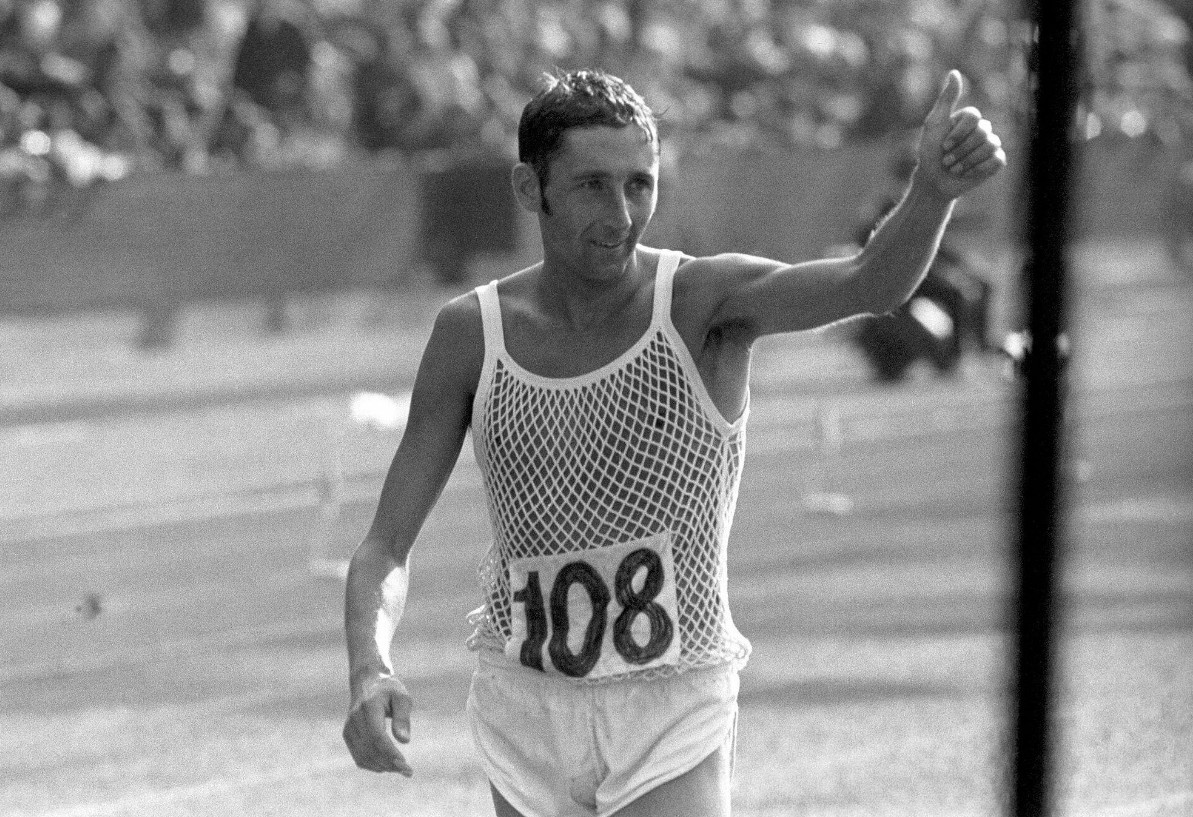
Hill rebounded one year later, though, and set the first world record of his career. Competing at the Leverhulme Park track in Bolton, Hill broke two of Emil Zatopek’s long-standing world records in one fell swoop, clocking 1:15:22.6 for 25,000m and passing through 15 miles en route in 1:12:48.2.
His championship performances started to improve in the late 1960s as he placed 12th in the marathon at the 1966 European Championships and seventh in the 10,000m at the 1968 Olympics, having been controversially overlooked for a place on the marathon team.
He set two more world records in 1968, both at 10 miles. In April he clocked 47:02.2 in Leicester to break Ron Clark’s record, passing through 10,000m in 29:09.4 and 15,000m in 43:54, an unofficial world best time.
Later that year, one month after his Olympic appearance, Hill attempted to break Gaston Roelants’ one hour world record of 20,784m. He fell slightly short of that target, covering 20,471m, but passed through 10 miles in a world record time of 46:44.0.
Though that was to be the last world record of his career, Hill became a big-time performer from that point onwards, winning big city marathons and landing major medals.
He won the European marathon title in Athens in 1969, then in 1970 he became the first British runner to win the Boston Marathon, smashing the course record by three minutes with 2:10:30. A few months later, at the Commonwealth Games in Edinburgh, he came the second man to break the 2:10 barrier for the marathon, winning gold in a European record of 2:09:28, having covered the final 10km in 29:24 (2:04 marathon pace).
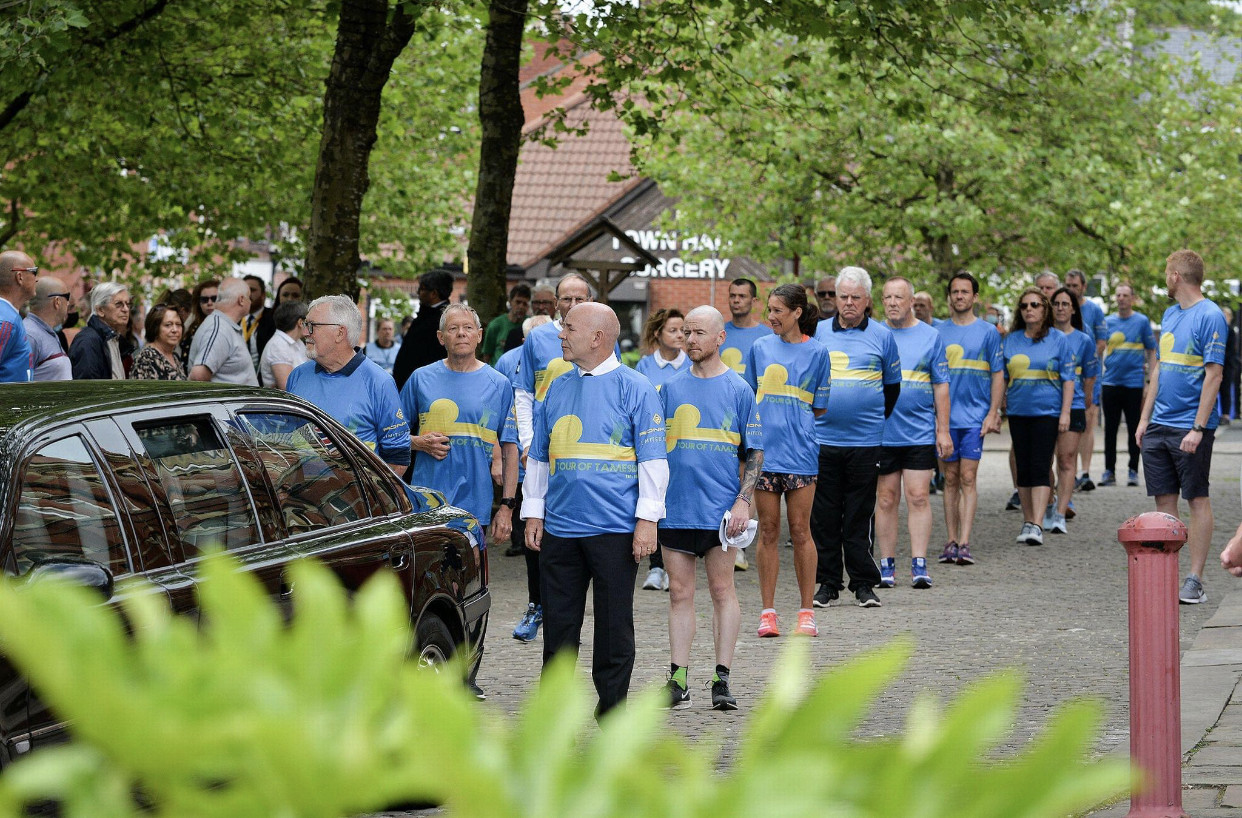
He went on to take bronze in the marathon at the 1971 European Championships before making his final Olympic appearance in 1972, placing sixth in the marathon – his highest ever finish at the Games.
Hill continued to produce world-class marathon times through the 1970s, including a 2:12:35 victory at the Debno Marathon in 1975 at the age of 36, ranking him eighth in the world that year. He finished fourth at the 1976 Olympic Trials, but went on to represent Britain at various masters championships.
Hill was ahead of his time with regards to training and he was one of the first elite athletes to use the Saltin-Hermansson diet – better known as the glycogen depletion diet or ‘carb-loading’ – which he credited as playing a big part in his success at the 1969 European Championships. Ever since, it has been adopted by millions of runners as a key part of marathon preparation.
Hill, who had a PhD in textile chemistry, often raced in breathable mesh vests to help keep cool. Towards the end of his elite career, he founded Ron Hill Sports and produced top-of-the-line running clothes. He also created the Ronhill and Hilly brands, both of which are still going strong today.
Hill’s streak of consecutive daily runs – which he defined as completing a distance of at least one mile at any pace – began on 20 December 1964 and lasted for more than 52 years. He even managed workouts after a car crash in 1993 when he broke his sternum, and after bunion surgery.
In December 2013 when his streak entered its 50th year, Hill’s total logged lifetime mileage stood at 158,628 miles. His streak ended on 30 January 2017 when he experienced chest pains during a run.
“I did everything I could to be the best in the world,” he said in 2019 in an interview with Inside The Games. “I couldn't train full-time, couldn't train at altitude, couldn't afford back-up support – I only ever had two massages in my life – and when I was injured I just had to run through it. I never made any money at it, but you can't take away the gold medals.”
World Athletics President Sebastian Coe paid tribute to Hill.
"Ron Hill turned the art of marathon running into a science and wrote the playbook for generations to come," said Coe. "He was a one-off. His contribution to the classic distance is immense."
by Sebastian Coe (World Athletics)
Login to leave a comment
British sprinter Dina Asher-Smith lays down Tokyo marker with 200m win
Seb Coe, who knows a thing or two about winning Olympic titles, is convinced that Dina Asher-Smith will be Team GB’s poster girl in Tokyo. Her rivals in the 100m and 200m will have something to say about that, but there were encouraging signs as Asher-Smith blitzed her way to victory in her first outdoor race of the season in Savona.
Asher-Smith has not competed in the 200m since winning world championship gold in Doha in October 2019. But in a low-key meeting in Italy all her familiar traits – including a lightning start and a bend so exquisite that the Italian commentator shouted “mamma mia!” as she powered round it – were evident as she came home in 22.56sec.
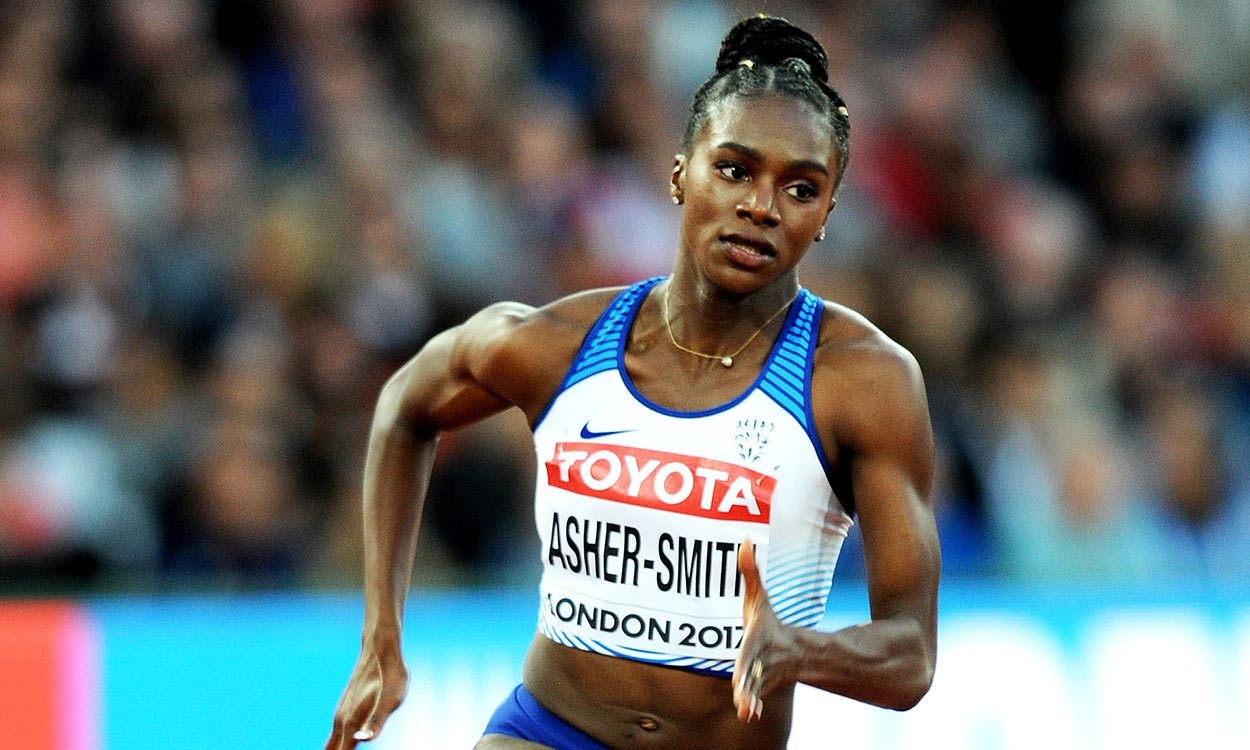
The 25-year-old would have perhaps wanted to go a touch faster, given the Olympics are scheduled to start in 10 weeks. But her dominance was clear with her closest challenger, Britain’s Beth Dobbin, more than half a second back at 23.06sec.
“It’s good to be back on track and it’s good to be back doing the 200m,” Asher-Smith said. “It has been a year-and-a-half since the world championships in Qatar and since I was doing my last 200m, so it’s nice to be back over that distance again.”
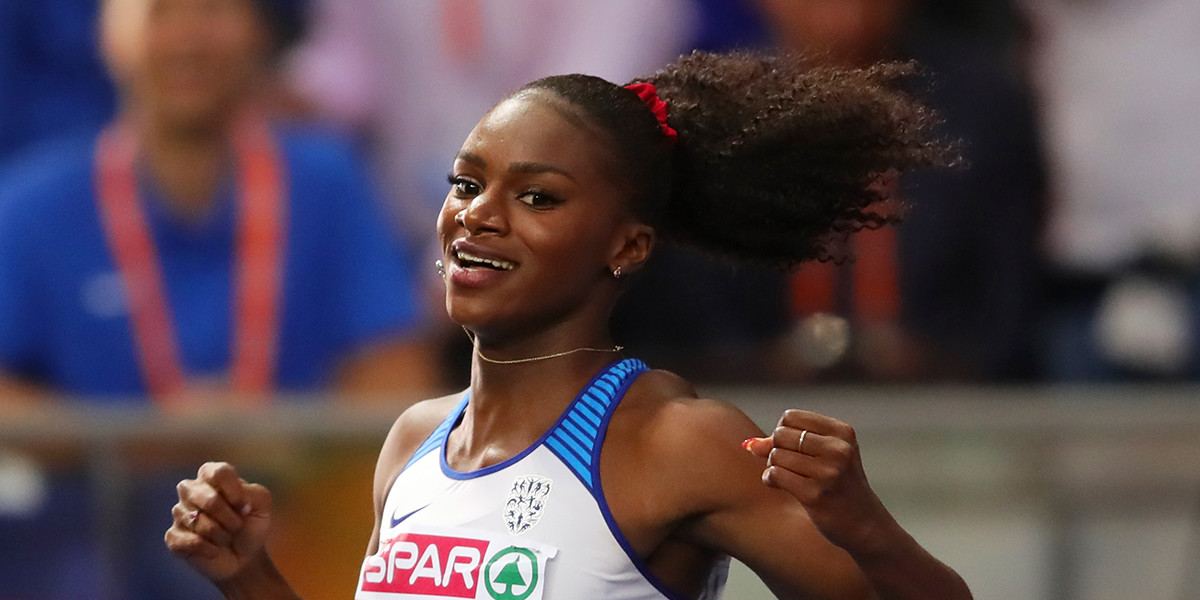
However she knows bigger tests await, starting in 10 days when she races in Gateshead against the reigning 200m Olympic champion, Elaine Thompson-Herah, the double Olympic 100m champion Shelly-Ann Fraser-Pryce, and the new American sensation Sha’Carri Richardson. “My next race is the Diamond League in Gateshead,” said Asher-Smith. “I am really excited to be running at home. It will be nice.”
Another Briton, Andrew Pozzi, opened his summer with victory in the 110m hurdles with 13.42sec. But the performance of the night came from the Italian Marcell Jacobs, who set the national record in the 100m with a storming 9.95sec run.
by Sean Ingle
Login to leave a comment
Tokyo 2020 Olympic Games
Fifty-six years after having organized the Olympic Games, the Japanese capital will be hosting a Summer edition for the second time, originally scheduled from July 24 to August 9, 2020, the games were postponed due to coronavirus outbreak, the postponed Tokyo Olympics will be held from July 23 to August 8 in 2021, according to the International Olympic Committee decision. ...
more...IOC has removed 4 x 400m from 2024 Olympics
World Athletics was shocked to learn that the International Olympic Committee has cut the popular relay event to make room for math-based competitions.
In a disappointing and unexpected change to the Paris 2024 Summer Games program, the International Olympic Committee (IOC) has announced that the men’s and women’s 4 x 400m relay races will be cut to make room for “mathletics.”
The decision to add math-based events to the Games was made by the IOC and the Paris Organizing Committee (POC), and World Athletics (WA) was reportedly left out of discussions entirely.
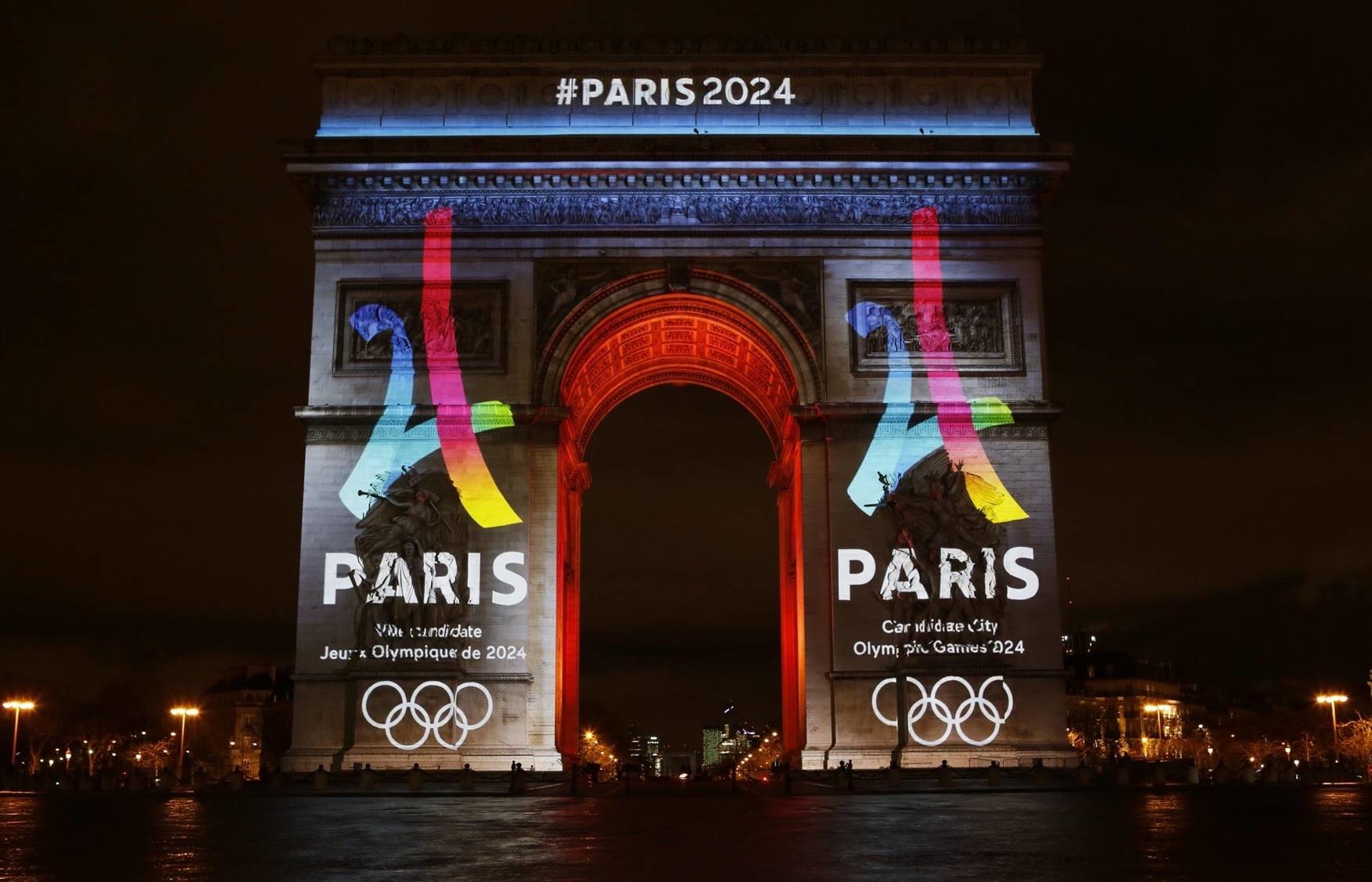
At a press conference announcing the program change on Thursday, IOC president Thomas Bach said how thrilled he is to usher in “the next era” of the Olympic Games.
“I was never good at math as a kid,” Bach said. “So I’m proud to know that I’m playing a part in inspiring the next generation of Olympians to not just work hard at math, but to enjoy it, too.” An official from the POC also spoke, echoing Bach’s words.
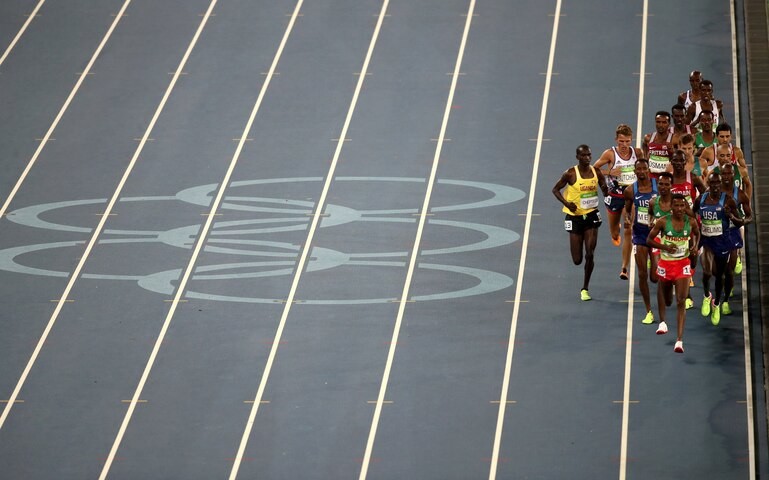
“In France, we rank somewhere around 25th in the world when it comes to youth math scores,” the official said. “We want to change that, and we sincerely believe that hosting an Olympic mathletics event in our country will inspire our children.”
When asked whether he believes the elimination of the 4 x 400m will hurt athletics in France, the POC official said he thinks “France has enough runners already,” pointing out that “kids everywhere run all the time. At recess, in after-school sports. They’re always moving. We need more mathletes, not runners.”
While the IOC and POC are excited by this program change, some people are upset — most notably WA president Seb Coe. “I get that math is important, I do,” Coe said, speaking after the IOC press conference. “But why are they cutting the 4 x 400m relay? How can the IOC think that’s a good idea?”
Coe spoke heatedly, clearly annoyed, and he apologized after a seven-minute rant about long division (which he said he “could never wrap [his] head around”), explaining that he’s not against promoting math, but that he was simply caught off-guard. “Thomas [Bach] and the IOC didn’t contact me about this change. I learned about it on Twitter, just like everyone else.”
Coe continued, saying that he plans to fight the IOC on this change. It appears to be a battle he and WA are destined to lose, though, as shortly after Coe’s speech, Bach released the tentative lineup of mathletics events he hopes to see in 2024.
“We’re planning to hold multiplication races, abacus events and so much more,” Bach tweeted. “Athletics have been in the Games for over a century, but math has been around forever. It’s time we show mathletes the respect they deserve.”
Bach has also reportedly considered dropping equestrian events from the 2024 Games to allow room for a new blackjack competition, but nothing has been made official.
by Ben Snider-McGrath
Login to leave a comment
Paris 2024 Olympic Games
For this historic event, the City of Light is thinking big! Visitors will be able to watch events at top sporting venues in Paris and the Paris region, as well as at emblematic monuments in the capital visited by several millions of tourists each year. The promise of exceptional moments to experience in an exceptional setting! A great way to...
more...Seb Coe relaxed over game-changing shoe technology in athletics
Seb Coe says he is not about to push for the banning of the controversial track spikes worn by Mo Farah’s biggest Olympic rival.
Joshua Cheptegei, who is due to go head-to-head with reigning champion Farah in the 10,000m in Tokyo, recently obliterated the world record both for that distance and the 5,000m.
He did so wearing the new Nike ZoomX Dragonfly shoes which contain a carbon plate and a unique foam and have been billed as the “fastest shoes ever”.
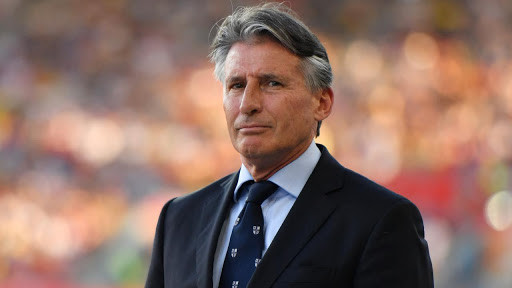
Coe, president of World Athletics, is aware that former British star Tim Hutchings believes the latest shoe technology merits a new classification of world records.
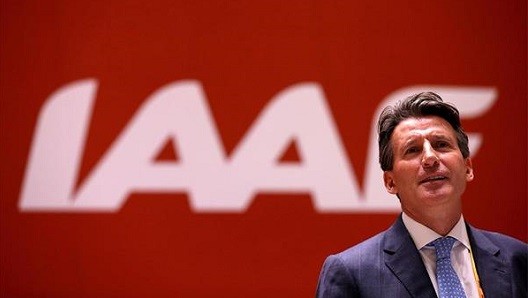
The Olympic legend insists world records “do matter”, need to be “cherished” and recognised the world over as a “benchmark of a suffusion of skill, talent, hard work and great coaching”.
But he says: “We shouldn't be in the business of trying to suffocate innovation. I don't think we've reached that point where world records are being handed out like confetti.”
Coe has seen shoe technology change the face of road running, with Eliud Kipchoge becoming the first human to clock a sub two-hour marathon, wearing Nike’s revolutionary Alphafly shoe.
But he plays down fears for the track record book being rewritten, claiming there are now more control mechanisms in place.
But Hutchings is unconvinced, telling insidethegames : "It's clear that performances in these shoes, both road and track, should be in a separate category, or at least asterisked.
"To compare performances in the shoes, with those not in the shoes, is grossly unfair to the athletes in the latter category.”
Seb Coe says he is not about to push for the banning of the controversial track spikes worn by Mo Farah’s b
by Alex Spink
Login to leave a comment
Seb Coe warns it will be harder than ever to cheat at Tokyo Olympics
Sebastian Coe has warned the biggest names in track and field that being “high profile no longer protects you from the investigative powers of the sport” – and predicted it will be harder than ever to get away with taking banned drugs at the Tokyo Olympics.
There has long been a suspicion that some countries have not done everything in their powers to catch their stars who cheat. However Coe, the World Athletics president, insisted things had now fundamentally changed and that drugs cheats would now be “fearlessly and ruthlessly weeded out” by the independent Athletics Integrity Unit (AIU).
Athletes need to understand why Russia is so important to the IOC
While Coe readily conceded it was not a good thing for the sport that its fastest man, the world 100m champion Christian Coleman, was serving a doping ban for missing tests, he said it showed the system was working.
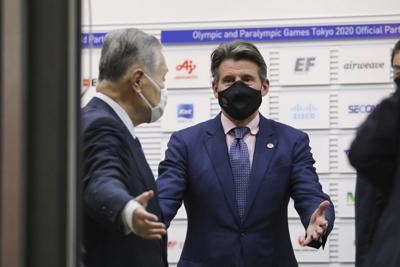
“The AIU was a centrepiece in the reforms and that’s exactly why I pushed for that independent, dispassionate organisation that could remove the decision making from any undue political interference,” he said. “I like to think that it has shown the athletes that we’re not respecters or fearful of reputation. Where there is an infraction we’re not fearful of sitting there going: ‘Oh well that’s quite a big name.’
“The AIU is not always going to be on everybody’s Christmas card list, nor should they be. But I do think that it has restored some confidence among the athletes that we’ve got an organisation out there that will fearlessly and ruthlessly weed out the cheats when and where they surface.”
Coe said athletics now did more intelligence-led testing than any other sport – a fact that made him hopeful it will be harder than ever to cheat at the Tokyo Olympics.
Those comments will raise eyebrows in some quarters, given he also predicted before the London 2012 Olympics that it would be “the cleanest in history”. But Coe said he was confident that was the case. “Technology has improved, significantly even since 2012. Now, we’ve become much more sophisticated in the way testing takes place. It’s much more intelligence-led. And we’ve also got the AIU and that’s now 20-odd people with a good chunk of those people are sophisticated international investigators as well.
“I feel that I will be taking World Athletics as a federation to Tokyo with better systems in place than any other federation. I’m proud to be able to say that. And what I can say is if athletes do cheat there is a greater chance of them being caught in Tokyo than probably any previous Games.”
Coe also dismissed suggestions that the whereabouts system, under which athletes receive a two-year ban if they miss three drug tests in a 12-month period, was unduly harsh.
by Sean Ingle
Login to leave a comment
Tokyo 2020 Olympic Games
Fifty-six years after having organized the Olympic Games, the Japanese capital will be hosting a Summer edition for the second time, originally scheduled from July 24 to August 9, 2020, the games were postponed due to coronavirus outbreak, the postponed Tokyo Olympics will be held from July 23 to August 8 in 2021, according to the International Olympic Committee decision. ...
more...Sebastian Coe predicts bright future for athletics amid virus concerns
World Athletics (WA) has endured a turbulent year, but the global athletics governing body's president Seb Coe is confident the challenges have made his organisation, and the sport, "more resilient."
Having piloted the Monaco-based WA through the turbulence, Coe believes his international federation is on cruise control and that the prospects of 2021 are mouth-watering.
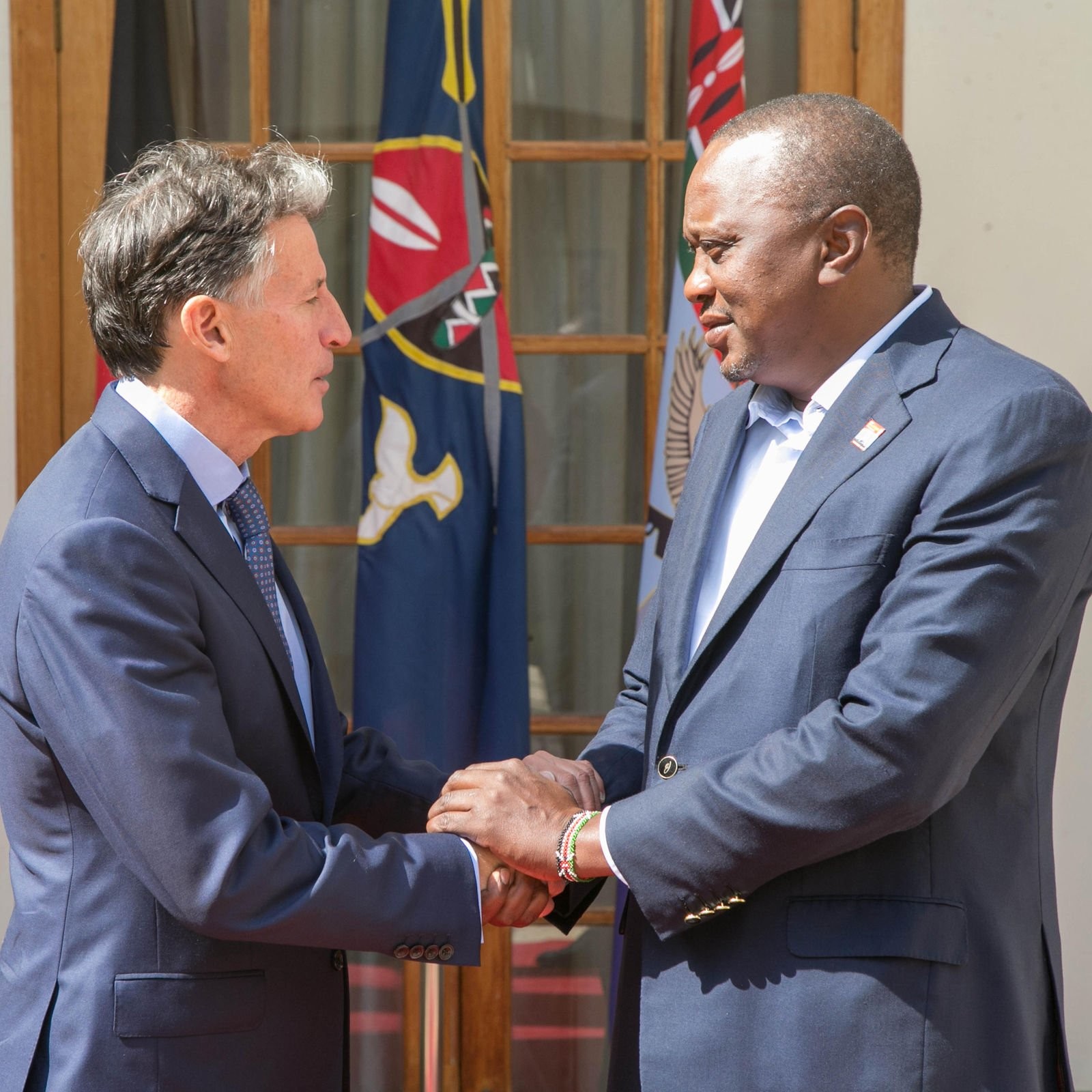
In an end-of-year interview with leading African sports desks, including Nation Sport, earlier this week, Coe reflected on a difficult, coronavirus-ravaged season that also saw WA wriggle out of negative vibe coming out of the organisation's former president Lamine Diack's trial for corruption in Paris.
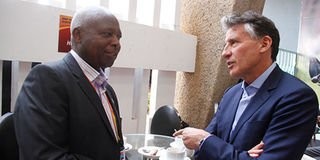
In September, Diack, 87, a former Mayor of Dakar, was found guilty by a Paris court of covering up doping cases by Russia and was handed a four-year jail sentence, two of these years suspended.
The man who had led the global track and field body for 16 years was also fined 500,000 Euros (about Sh6 million) by presiding judge Rose-Marie Hunault who ruled that Diack's actions "caused serious damage to the fight against doping."
Having been first elected at the organisation's sixth president in August, 2015, Coe set out to streamline operations in Monaco, cutting down on unnecessary expenditure and moving to shore up WA's finances.
Globalising athletics
His focus on globalising athletics saw Nairobi win the rights to host the 2017 World Under-18 Championships and also the 2020 (now 2021) World Under-20 Championships along with a leg of the World Athletics Continental Tour, what was then named the "Kip Keino Classic."
Commissions and working groups at World Athletics were whittled down from over 30 to just half a dozen and virtual conferences preferred to expensive trips to the principality for working meetings.
Diack was notorious for his extravagance that saw his friends, their spouses and girlfriends from Dakar on the global body's tab for junkets to the affluent Monte Carlo for the annual IAAF Gala, with half of the time spent on shopping sprees rather than track and field business.
Youssour N'dour and "Mama Africa" Miriam Makeba formed part of the high profile ensemble that entertained Diack's administration at the Gala, usually as the climax of a six-course, black jacket dinner ceremony, mostly at the Monte Carlo Bay Hotel whose current room price per night is up to Sh280,000, bed and breakfast!
Coe drastically cut down on this extravagance.
The Briton's administration whittled down the grandeur by organising a pocket-friendly, theatre-style gala with just cocktails and bitings in place of the sumptuous Diack dinners that notoriously sampled Monte Carlo Bay's culinary delights such as caramelized back of salmon with honey, or "Black Tiger" prawns, virgin sauce with basil, pushed down the throats of excited guests by three scoops of home made ice-creams and sorbets, with the best selection of bottomless wine from the French Riviera's wineries and vineyards to boot.
Besides the financial matters, getting athletes back into training after the coronavirus outbreak and juggling around the global athletics calendar were other priorities.
"Going back to March when, clearly, life became very much more complicated because of Covid, for all of us anywhere in the world, with sudden travel restrictions and bans and pressures on athletes, the first objective we set ourselves - which was an understandable one because we are an athlete-centred organisation - was to do everything we possibly could to get the athletes back in training and then into competition," Coe looked back.
Coe is happy that WA was not only focusing on solving problems, but also "identifying the right problems to solve."
"Look, we went through the school of hard knocks for four years from 2015 on-wards... I don't need to retrace my steps through there, that was a very global level of scrutiny for our sport."
"We came through it stronger and I think that bravery, that strength, that resilience allowed us through the pandemic year to continue to remain balanced and to continue to do all the things that we wanted to do in the sport, and to make brave decisions in our sport and that bravery has served us well in the past and I think it will serve us well next year."
by Elias Makori
Login to leave a comment
Seb Coe says that athletes must take their place in the queue for the COVID-19 vaccine
Healthy Athletes should take their place in the COVID-19 vaccine queue behind people with more pressing needs despite events such as next year’s Olympics looking set to be highly dependent on competitors arriving free from the virus, the head of world athletics Seb Coe said on Friday.
Most athletes in their 20s and 30s, across all sports, would be just about last in line in most countries when it comes to handing out the vaccine but the pressure to create a COVID-safe environment at sporting events has raised the question of whether they should be treated as a special case.
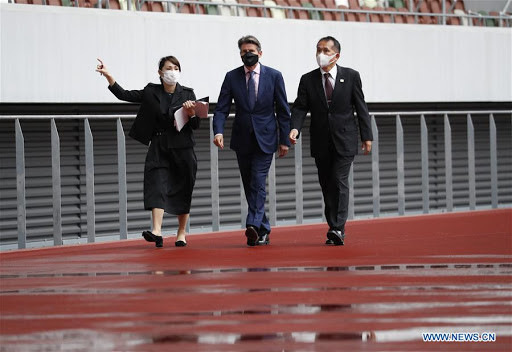
Coe trod a careful line when asked about the issue at a media conference on Friday. “We have to be sensitive here - there are many claims on that priority,” he said.
“Most of us are dependent on our front line workers and our emergency services and we also recognize that there are vulnerable people in the community and we want to make sure that we look after them as much as possible.
“I’m not sure that it is for sport to be pressing the case for fit young people. I would like, on the other hand, that when the vaccine does become available and that the athletes have the opportunity to make use of it that they do.
“I’m not mandating it and I don’t think it’s my job to tell people what they should or shouldn’t do in that area - I think that has to be a very personal and individualistic view.
“I hope they do avail themselves of it, I certainly would if I had the opportunity in the lead up to a Games like that, but it’s very much a personal decision.”
Coe, who won double Olympic gold over 1,500 meters and was the driving force behind Britain’s hosting of the 2012 Games, was confident next year’s Tokyo event, postponed from 2020, would go ahead, and said that if any country could respond to the challenge of a re-arranged Olympics it was Japan.
“I think the Games will go ahead. I was in Tokyo a week ago and spent 48 very intensive hours talking to the organizing committee and the government,” he said.
by Mitch Phillips
Login to leave a comment
Tokyo 2020 Olympic Games
Fifty-six years after having organized the Olympic Games, the Japanese capital will be hosting a Summer edition for the second time, originally scheduled from July 24 to August 9, 2020, the games were postponed due to coronavirus outbreak, the postponed Tokyo Olympics will be held from July 23 to August 8 in 2021, according to the International Olympic Committee decision. ...
more...Seb Coe believes Daniel Rowden, Jake Wightman and others are on the right track to succeed at the highest level
Ever since the 1990s Seb Coe has regularly been invited to meet various 800m prodigies who have been touted as his successor. He has usually obliged and passed on some of the wisdom gained from a career that included a world and still-standing British record of 1:41.73. In turn, he has listened to them and has often been slightly disheartened with their approach.
When it comes to the current crop, though, Coe is impressed. The president of World Athletics says they are making all the right noises and he is optimistic they can build on what has been a vintage year for the two-lap event in the UK.
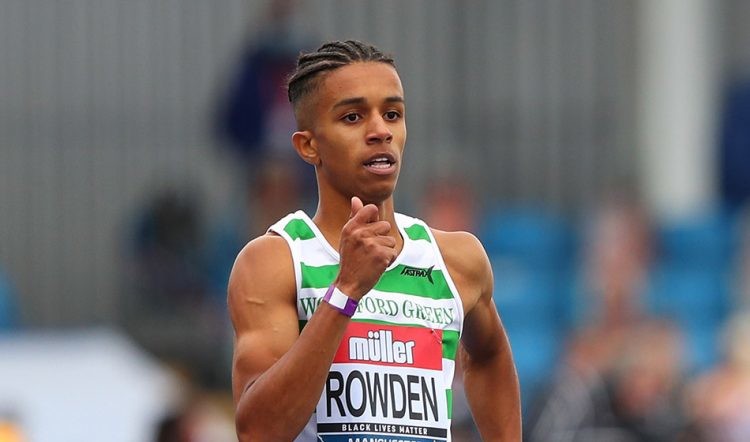
Daniel Rowden, Elliot Giles, Jake Wightman, Kyle Langford and teenager Max Burgin have all run 1:44 in 2020. One race in Zagreb saw Rowden, Giles and Wightman finishing one-two-three and Coe says he enjoyed a one-hour conversation on Zoom with Rowden recently to talk about his training and approach to athletics.
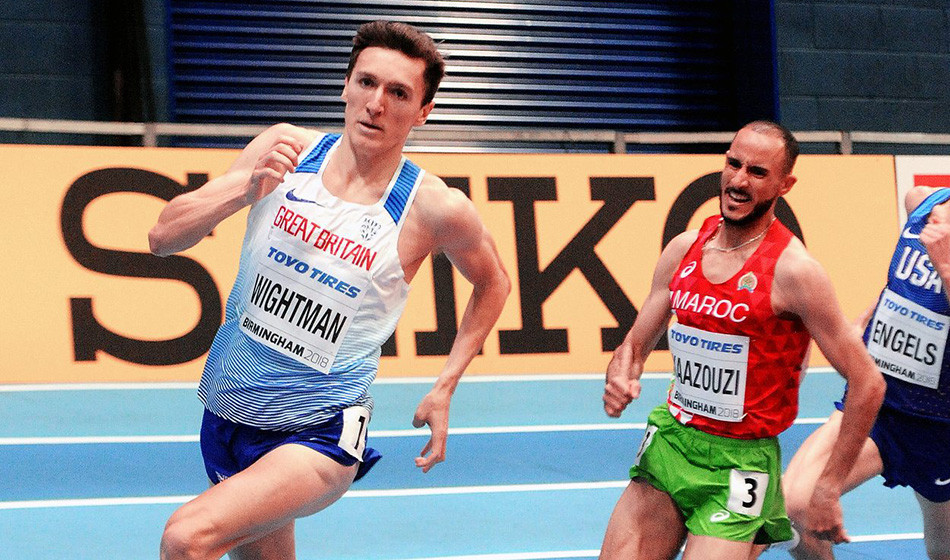
“I’m pleased (with the current crop),” says Coe, “because I’ve always kept quite close and every few years I’ve often been asked to sit down with 800m or 1500m runners – even going back to Frank Dick’s time – and sometimes I’ve left slightly with my head in my hands with regards the way they’ve thought about the event and the types of things they’ve done in training in order to get to the top.”
But Coe adds: “This is the first generation where I can really put my hand on my heart and say that they really are doing the right things.
“On the basis that I think they’re doing the right things, it’s hardly a surprise that they’re performing the way they are.”
Rowden’s best of 1:44.09 equalled the best time of Coe’s big rival – the Olympic 800m champion Steve Ovett – and it ranked the 23-year-old third in the world rankings in 2020.
“I had a very good chat with Daniel the other day,” says Coe. “I’m not the font of all knowledge when it comes to 800m running and I certainly wouldn’t tell them how to run 800m finals. They’d be better off speaking to Steve Ovett or Joaquim Cruz about that!
“But I do know what it takes to get to the top of 800m running and what I’m pleased about is that they’re wanting to learn, wanting to understand and reaching out and the very fact that I’m sitting down with Daniel, who is keen to understand the nature of the event, is a really good sign.”
by Jason Henderson
Login to leave a comment
Sebastian Coe says that World Half 2020 nearly did not happen due to coronavirus-related restrictions
Recent Gdynia event almost fell foul of coronavirus-related restrictions, weather problems and a fire in one of the technical buildings
World Athletics president Seb Coe has applauded the return of competition during the latter months of 2020 but reveals the World Half Marathon Championships in Gdynia in October was almost cancelled due to the coronavirus, bad weather and a fire in the timing area.
“It was one of the tougher championships that we’ve had to deliver,” said Coe, who was speaking after the latest World Athletics Council meeting. “Had it been held a couple of days or even 24 hours later it probably wouldn’t have taken place because Gydnia moved into the red zone Covid-wise in Poland.”
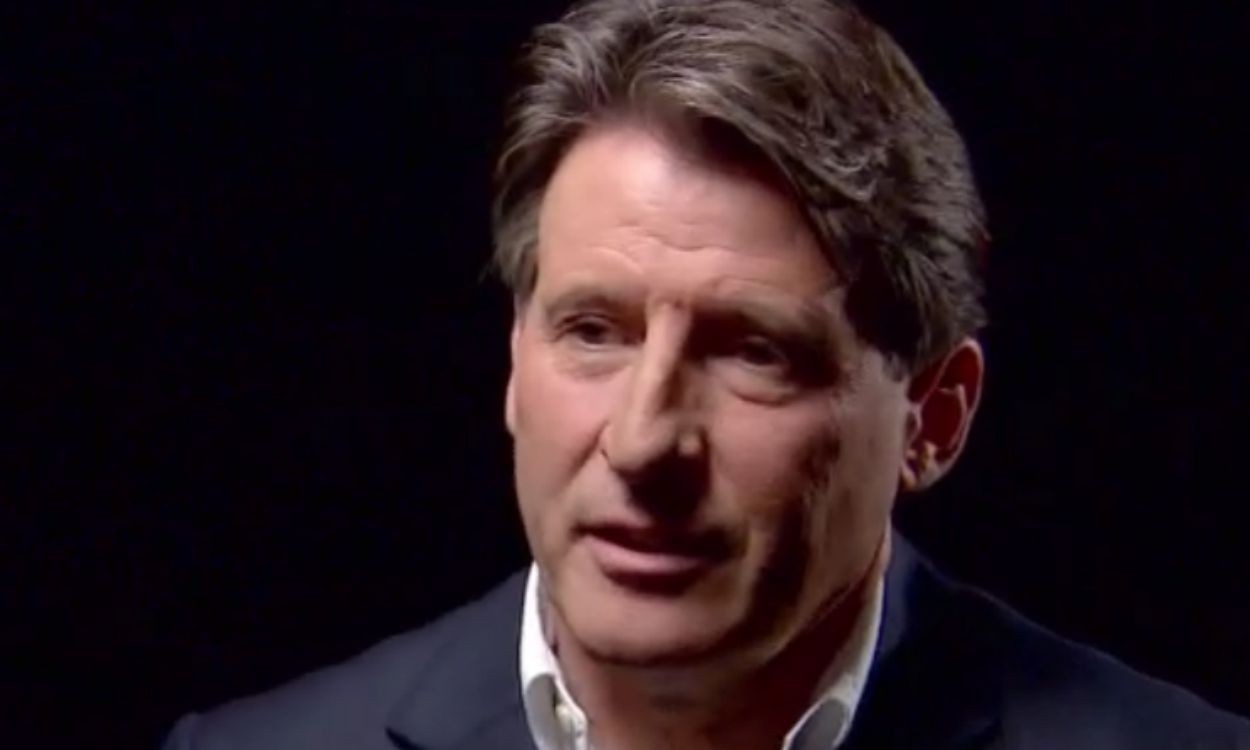
He added: “Two days before that the city was hit by monstrous storms and winds. And on the night before the championships we had a fire in the Seiko timings and results hut that very nearly rendered us without any timing or results equipment at all.
“It was at point I was waiting for a plague of locusts to arrive,” he joked. “But the athletes who punched through in the end and at that extraordinary event we had a world record, area records and 22 national records.”
Ultimately, Coe said, the event was a “synthesis of fantastic resilient relationships”.
Coe added: “It has been the athletes who have driven the latter part of our season and kept us front and centre. Since our last Council meeting we’ve delivered a world championships, six Diamond League meetings, seven Continental Tour Gold meetings, four Continental Tour Silver and twelve Continental Tour Bronze meetings.”
Given this Coe said there had been enough action in the second half of the year to merit holding the annual World Athletics Awards – and they will be streamed live on Saturday December 5.
Elsewhere dates for the 2022 World Cross Country Championships in Bathurst (February 19) and World Indoor Championships in Belgrade (March 18-19) were confirmed.
It was also confirmed that World Athletics has asked for a mixed team cross-country relay and the women’s 50km race walk to be included in the 2024 Olympics.
by Jason Henderson
Login to leave a comment
In a recent IOC Sustainability Session, Seb Coe discussed the importance of having a "the collaboration of sport and science"
Climate change and sustainability are a couple of the most talked about issues in the world today. No matter where you are, this conversation is relevant, and the matter was recently covered in a virtual meeting featuring the International Olympic Committee (IOC) and a number of international sporting federations. World Athletics (WA) was among the federations present on the call, and organization president Seb Coe delivered the day’s closing remarks.
In a WA article recapping the “IOC Sustainability Session,” Coe touched on how important it is for all international sporting federations to join the fight against climate change, noting that “sustainability does really have to sit at the heart of pretty much everything that we do” as organizations.
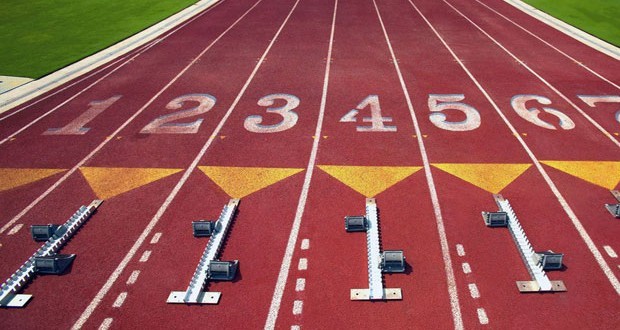
“We are witnessing around us irreversible changes,” Coe said on the call. “The only way that those changes can be addressed through our own portfolio [as sport federations] is the collaboration of sport and science.” Coe discussed the World Athletics Sustainability Strategy, which was released in April. This is a 10-year plan that aligns with the Sustainable Development Goals (SDGs) of the United Nations (UN). The UN introduced these 17 SDGs to its member states in 2015, announcing the organization’s hopes to accomplish each one by the year 2030.
The SDGs focus on humanitarian issues, matters of equality and climate action, and both the IOC and WA have pledged to join in the push toward reaching these goals. The WA Sustainability Strategy states that the federation will work to “Establish itself as a sustainability leader in sport,” with a focus “across six dimensions.” Included in these dimensions is climate change and WA’s plan to decrease its yearly carbon output by 10 per cent each year over the next decade. This would mean that WA would become carbon neutral as an entire federation (which includes all WA events and member organizations) by 2030.
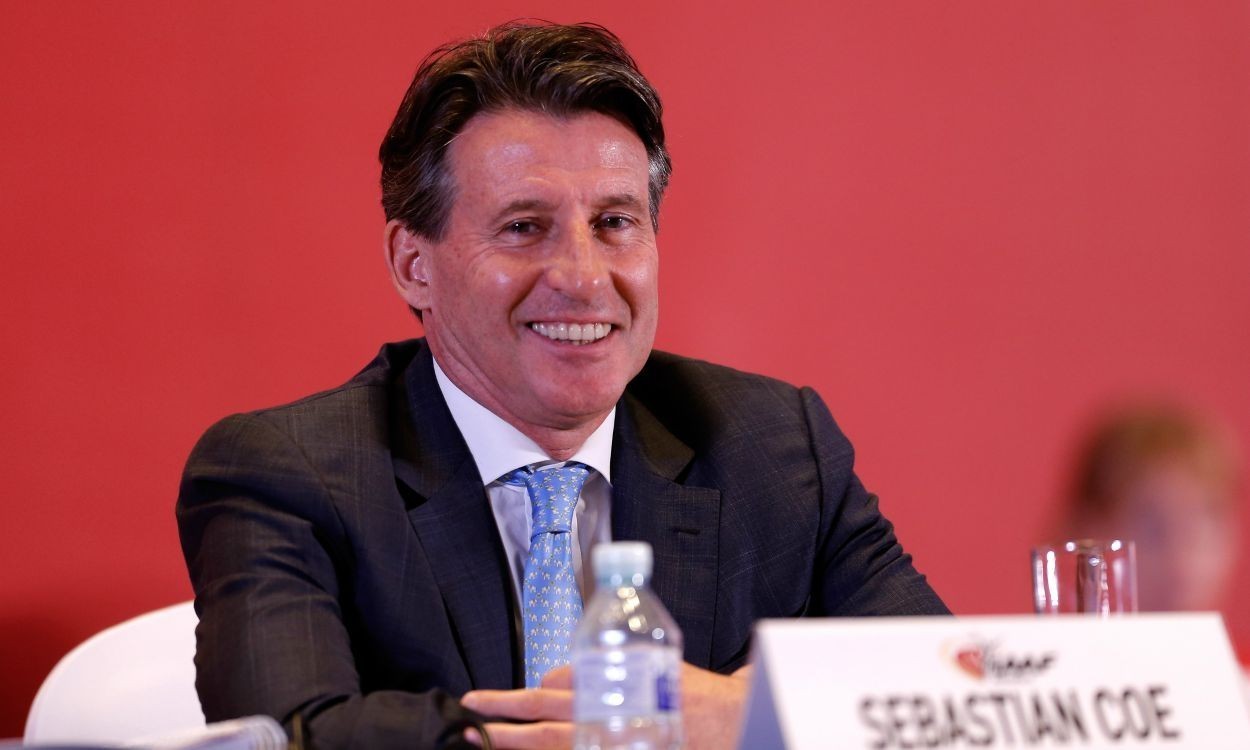
“We really want to do this to push forward on the United Nations Sustainable Development Goals,” Coe said in his speech to other sport federation representatives. “We think we can make a real difference here, both in awareness of the issues, but also in recognizing some of our own fragilities across our supply chains, particularly in the delivery of our events.”
Coe added that he and the WA team are aware that this “will be an ambitious journey, but at the end of that we want to be best in class in the delivery of sustainable events — because that is what the world is now going to demand of us.”
by Ben Snider-McGrath
Login to leave a comment
Run with Paula Radcliffe in the fast 10k virtually
The World Athletics Half Marathon Championships are just a couple of weeks away, and race organizers in Gdynia, Poland, have provided one last challenge ahead of the free virtual mass participation race.
The Fast 10k with Paula Radcliffe is the final test of fitness for participants who plan to run the half-marathon, and they can do it (virtually) alongside one of the best marathoners in history, after whom the challenge is named.
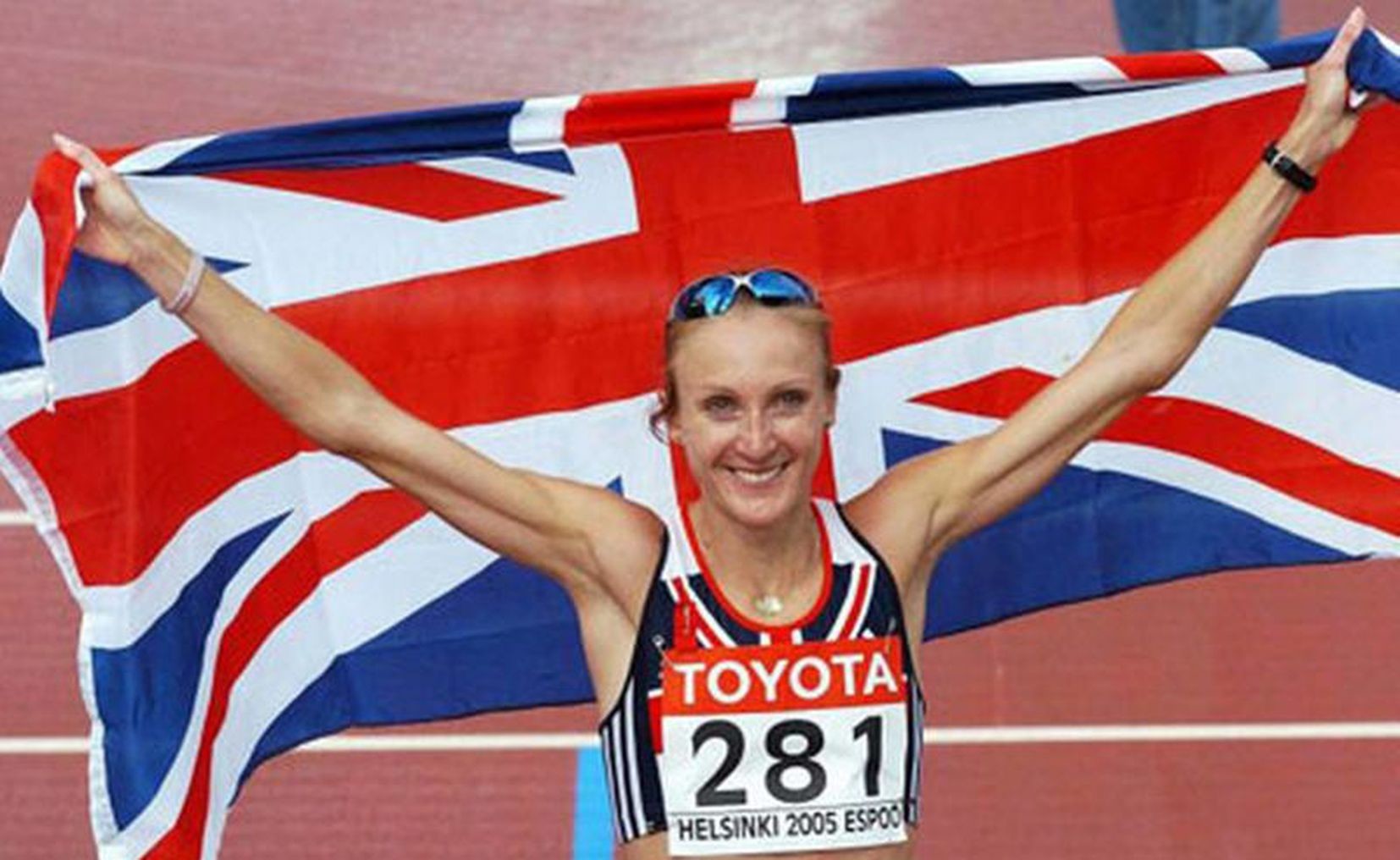
Radcliffe is an Olympian, a British and European record-holder many times over and the former women’s marathon world record-holder. Her marathon best was only recently beaten by Brigid Kosgei, who lowered Radcliffe’s longstanding record of 2:15:25 at the Chicago Marathon in 2019. In a promotional video for the Gdynia event and her virtual challenge, Radcliffe says the “World Half Marathon Championships have a very special place in my heart.
It was my first world title. I won three World Half Marathon Championships and all of them were extremely special to me.” She won the world half-marathon titles in 2000, 2001 and 2003, the same year she set her marathon world record.
This is the last of the virtual “warmup events” that have been organized for competitors by the Gdynia 2020 team. There was also a one-mile run with World Athletics head Seb Coe and a 5K with British Olympian Eilish McColgan, among other events. It’s easy to participate. Simply head to the event website, download the Gdynia 2020 tracking app and head off on your 10K challenge in preparation for your virtual half-marathon.
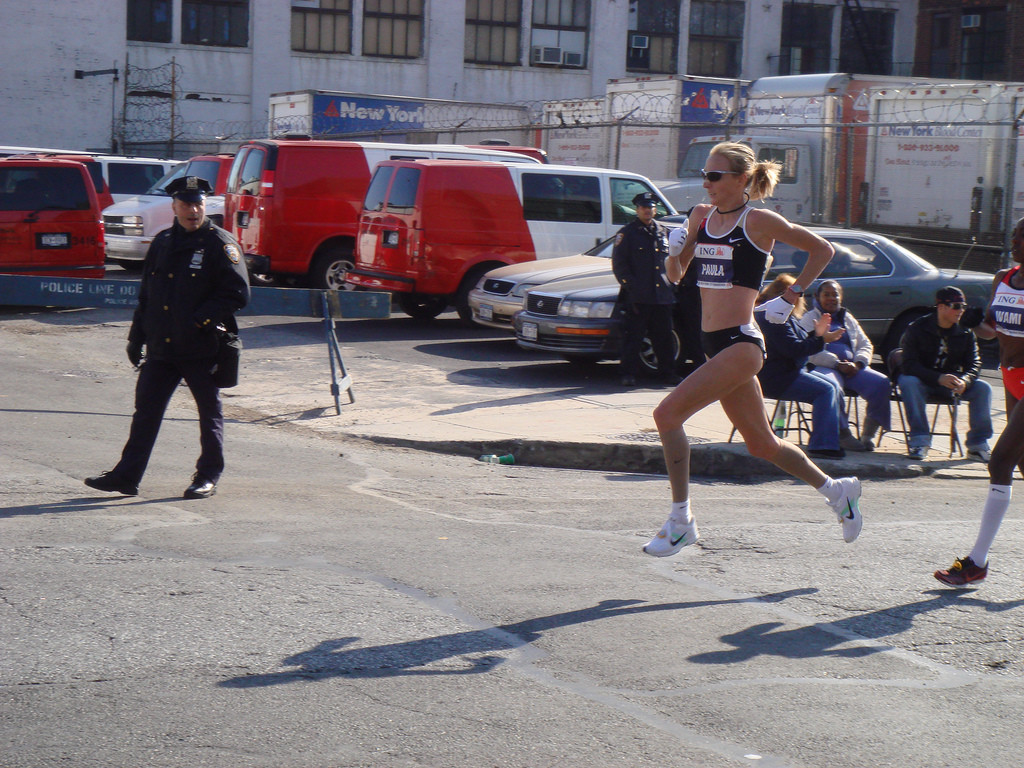
The mass participation race was cancelled and changed to a virtual format for 2020 due to COVID-19, but the elite race is still set to go ahead. The race has a number of big names ready to run, and it should be an exciting one to watch.
Newly-minted 5,000m world record-holder Joshua Cheptegei will be debuting at the distance in Gdynia, and he will be lining up alongside a strong Canadian team that’s made up of Trevor Hofbauer, Justin Kent, Phil Parrot-Migas, Benjamin Preisner and Thomas Toth. The lone woman heading to Poland to represent Canada is former national half and full marathon record-holder Rachel Cliff.
For anyone interested in participating in either the The Fast 10k with Paula Radcliffe challenge or the virtual half-marathon, it’s not too late to sign up.
by Ben Snider-McGrath
Login to leave a comment
World Half Marathon Championships
The Chinese city of Yangzhou will host the 2022 World Athletics Half Marathon Championships. China, one of the fastest-growing markets in road running, had 24 World Athletics Label road races in 2019, more than any other country. It hosted the World Half Marathon Championships in 2010 in Nanning and will stage the World Athletics Indoor Championships in Nanjing in 2021. ...
more...World 1,500m champion Cheruiyot rues missed chance to break record
World 1,500m champion Timothy Cheruiyot has said he had high hopes of peaking at the right time this season to make a serious attempt on the world record.
"When the year started, I had two items I wanted to accomplish - winning Olympic gold and breaking the world record. At the moment, the Olympic dream is gone, moved to 2021 and the dream chance of running at the higher level at full throttle looks bleak," he said on Sunday.
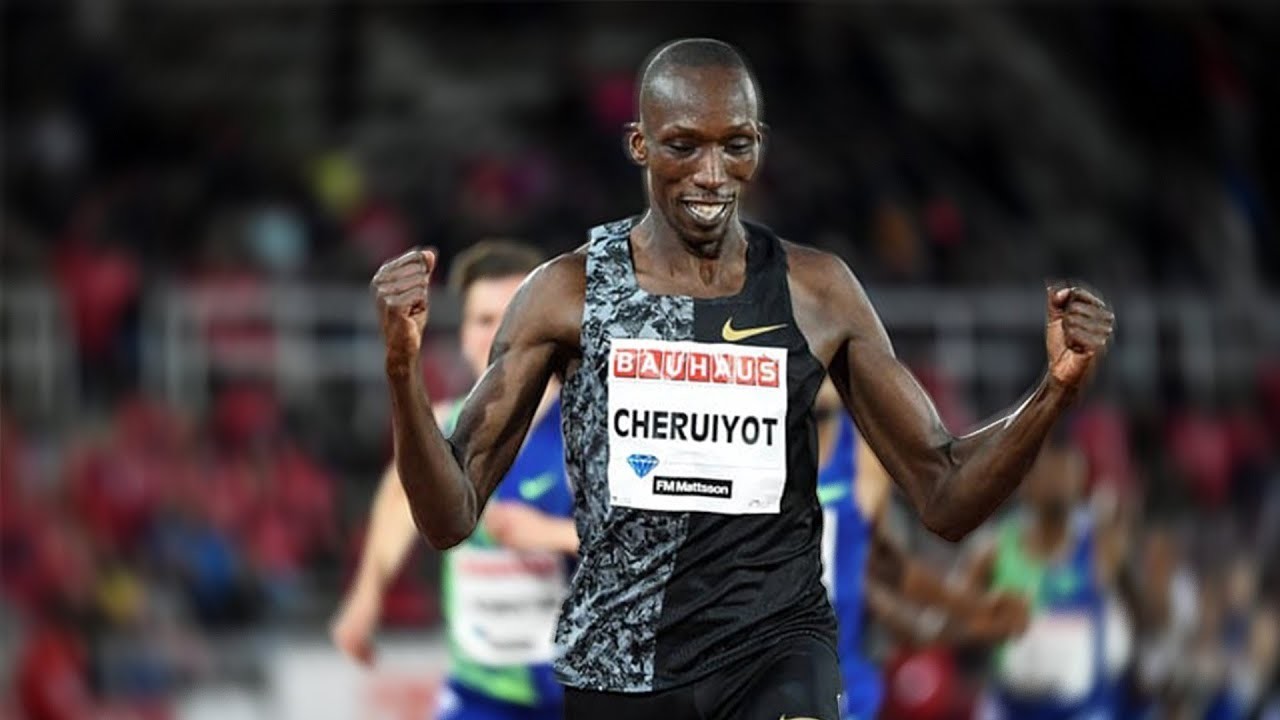
Hicham El Guerrouj's record of 3:26.00 has stood the test of time for over two decades and Cheruiyot, who has seen his rise from obscurity to blossom as a world champion feels he was the man to finally shatter the record.
However, the coronavirus pandemic has nipped in the bud his dream as he has no idea when he will return to action.
Cheruiyot is worried many athletes will struggle to regain fitness and sharpness in competition whenever the ban on sports competition is lifted.
With the shutdown of all training camps in Kenya, Cheruiyot, like many other athletes is facing the prospect of lazing at home in 2020 after the Covid-19 global pandemic wrecked the sports calendar.
Cheruiyot now has turned his focus on staying safe and forgotten his hope of chasing records.
His best time on the miler is 3:28.41, which he posted in Monaco in 2018.
"People break records when they run regularly and competitively at the highest level. So clearly from where we stand that is not going to be the case this year," he added.
Meanwhile, Olympic 5,000m silver medalist Hellen Obiri has urged fellow athletes to follow social distancing and practice good hygiene standards.
Obiri, the world 5,000m champion, who has been forced to amend her training program, says she only has one session in the morning to train.
She believes, like other sectors, sports will have to suffer initially before order is restored. However, she believes she will emerge out of the self-quarantine stronger and ready to battle her way to the top to win the only medal missing in her collection, Olympic gold.
"I have to train alone and it is difficult. It requires a lot of discipline and focus because distractions are many," Obiri said on Monday in Nairobi.
"These are difficult times, which call for special measures. As athletes and role models we must sensitise the need to keep safe and follow government directives. We must be very careful, that is why I can only afford to train once a day."
With no Diamond League meetings and the World Athletics Continental Tour having been postponed, Obiri has had to be careful not to peak too soon.
"There will be time for action and the important thing now is to remain safe and healthy. When everything is done and there is no coronavirus, we will train as a team and compete at the highest stage again," she said.
World Athletics President Seb Coe has said it will be a lot harder to stage all competitions in 2020 when the situation allows and athletes will have to select which events to take part in after Covid-19 is defeated.
Login to leave a comment
41-year-old athlete Edwin Kirwa won the Innovative Covid-19 Half Marathon in Iten Kenya
41-year-old athlete Edwin Kirwa won a one-of-its-kind half marathon that was held over the weekend dubbed the CoronaRun Half Marathon.
Kirwa, who is based in Embu, clocked a commendable 1 hour, 1 minute and 52 seconds for the 21km event.
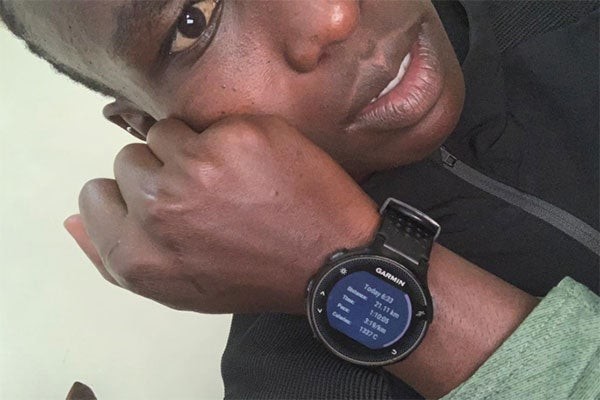
Felix Kandie (1:03:31), who was running along the Iten-Kaptagat road came in second.
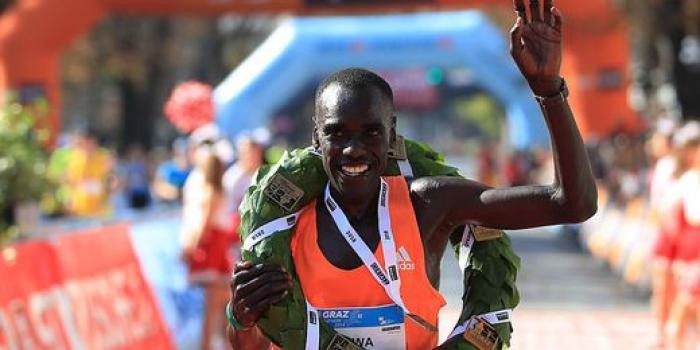
“This race has enabled me to know if I was on the right training schedule towards Boston Marathon which was to take place on April 20,” observed Kandie.
The unique race concept was developed by Dutch elite athlete management company Volare sports and involved over two dozen runners, Daily Nation reported.
Kicking off countrywide at 8 a.m. on April 4, each athlete raced around their home or compound of their choice in compliance with the social distancing directive, vital in combating the spread of Covid-19.
The athletes were then required to time themselves, and via GPS system, their finishing times were clocked at the Volae sports headquarters in Voorthuizen, Netherlands.
The women's race was won by Fancy Chemutai from Kericho who clocked 1:10:05, with Margaret Wanjiru (1:15:28) declared the 1st runners up.
Hanna Biwott-van de Veen, Athletes Representative at Volare Sports, revealed that the innovative race concept was taken up by the enthusiastic athletes the moment it was pitched to them.
"On March 21, we informed the athletes of the idea and most of them responded very positively. As a management, we wanted to stimulate the athletes to keep training and keep their focus after all races having being cancelled,
All of them were disappointed and even frustrated that the coronavirus is spoiling their chances of winning races and running personal best times," she explained.
The virtual race has been hailed by the athletes as an innovative option to beat the Covid-19 lockdown and was a welcome relief for the elite athletes who had been starved of any competition following the outbreak of the deadly virus.
World Athletics President Seb Coe recently challenged stakeholders in the athletics world by announcing that the only way forward for the sport, post-coronavirus, was innovation.
by Eddy Mwanza
Login to leave a comment
Irish marathon runner Kevin Seaward believes Olympics probably won't happen
Irish marathon runner Kevin Seaward feels there is "every likelihood" this year's Olympics will not take place because of the coronavirus crisis.
Seaward ran the distance for Ireland at the Rio Games and set a new Northern Ireland marathon record of 2:10.09 last month to seemingly book his Tokyo spot.
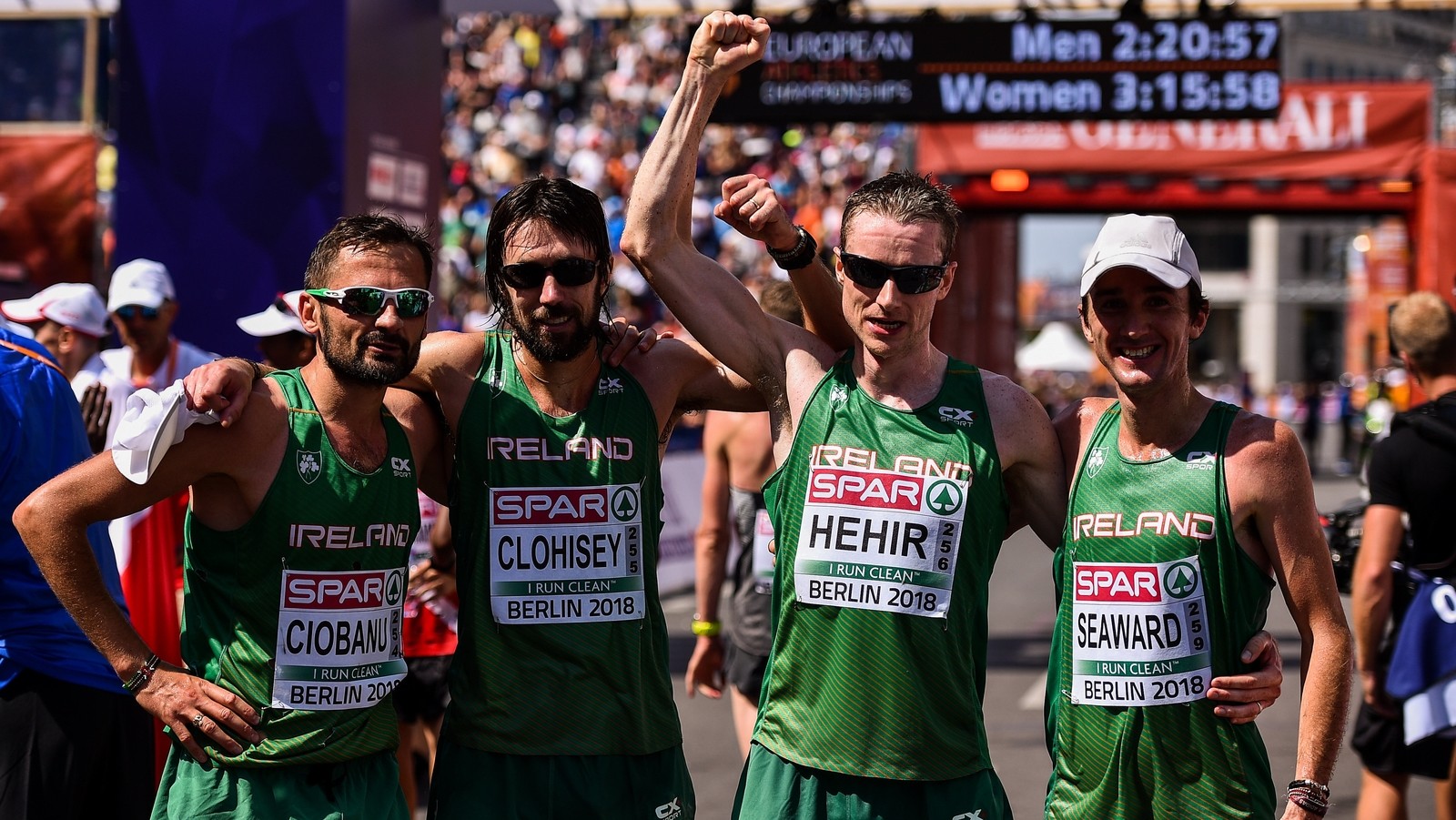
"The Olympics symbolize something more than a Games at the moment," he said.
"It would be a beacon of hope for people. But I honestly don't think they are going to happen."
The International Olympic Committee (IOC) is continuing to insist the Games could still begin on 24 July despite the pandemic but several high profile athletes including British heptathlete Katarina Johnson-Thompson have criticized this stance.
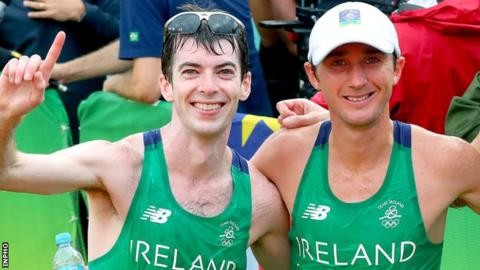
World champion Johnson-Thompson says training has become "impossible" because of the restrictions around coronavirus and has had to move back home from her normal base in France after the country was put on lockdown.
As a distance runner who does most of his workouts alone and rarely uses a track, Seaward says his training is not being hindered to the same extent as the Englishwoman, but nevertheless feels the IOC will have to at least move the Games to a later date if not cancel altogether.
Seaward, 36, is an assistant head teacher at a Leicestershire secondary school and has been working flat out with his colleagues to make arrangements for the children of key workers who will remain in school in the coming weeks after the British Government's school closures announcement on Wednesday.
"It's challenging times. School has been pretty crazy the last three or four days but we've got a little bit of clarity now," the Northern Irishman told BBC Sport Northern Ireland.
"You don't know that the Olympics are going to happen. I've come to the conclusion that there's every likelihood of them not happening. We've certainly got bigger things to worry about globally at the minute."
Seaward believes the postponement and cancellation of numerous Olympic qualifiers and other events which would have offered the opportunity to book Tokyo berths is another reason why the Games are unlikely to happen - certainly in the summer.
"I read an article today where Seb Coe said it was too early to make a decision (on the Games) and I kind of agree it's too early to definitively say yes or no.
"Aside from the fact that what we're experiencing now may not have cleared by then, people still have to qualify. There's a lot of thought that would have to go into making the process fair for everyone.
"From a marathoner's perspective, we have three Irish qualifiers (Seaward, Paul Pollock and Stephen Scullion) but we also know there are multiple other guys (Sean Tobin, Hugh Armstrong and Mick Clohisey) who were training hard and who were determined to give it a go to qualify but their marathons were cancelled."
by John Haughey
Login to leave a comment
Tokyo 2020 Olympic Games
Fifty-six years after having organized the Olympic Games, the Japanese capital will be hosting a Summer edition for the second time, originally scheduled from July 24 to August 9, 2020, the games were postponed due to coronavirus outbreak, the postponed Tokyo Olympics will be held from July 23 to August 8 in 2021, according to the International Olympic Committee decision. ...
more...The runner’s guide to parenting
GB distance runner Jo Wilkinson reflects on sharing her passion for athletics with her son, knowing when to support and advise and knowing the difference between being a coach and being a parent
Like all parenting – whether it’s about restrictions on TV or eating broccoli – it’s easy to have pre-conceived ideas about what makes a good parent. Then you have your own children and find out it’s not so easy in practice.
It’s no different in sport – especially when your children get involved in the sport that you love. After spending the weekend knee deep in mud watching my son at the Midlands Schools Cross Country, the long journey home gave me plenty of time to reflect on what makes a good parent in athletics – and whether I am one.
When you’ve been a runner for many years you think you know a thing or two about it. It’s even worse if you’re also a qualified coach. Even if you’re not, I’m pretty sure we all indulge in glorious fantasies about coaching our child to their first Olympic Gold.
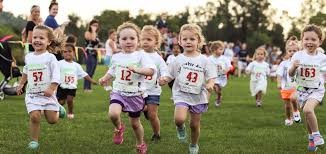
There are some very famous parent-coaches – Peter and Seb Coe, Liz and Eilish McColgan and now the Ingebrigtsen family. But for most children and parents it just doesn’t work. I’ll happily share my knowledge and experience of athletics with my son – when asked.
There’s got to be some advantage to having a parent who’s been a successful athlete. However, I’ve realised when it comes to my son’s running, my job is to be his mum and let his coach do the coaching.
Which brings me onto the second most favourite runner-parent fantasy – the one where they storm away to victory in each and every race. Here’s where the reality check is even more important. Even as a pretty good runner, the races I won were far out-numbered by those I didn’t.
Sport is competitive and winning is amazing. But I know that my enjoyment and sense of achievement from running has been based on far more than just winning. As a former elite athlete I know what it’s like to feel pressure. Pressure can be positive and bring out the best in you.
Too many times though, I’ve seen how too much pressure from over-competitive parents, even well-intentioned ones, sucks all the fun out of competition. So contrary to expectations, much as I love the fantasy, as long as my son does his best, runs well and is proud of himself, winning isn’t everything.
However, it’s the nerves that have surprised me the most as a runner-parent. I always got incredibly nervous before my races but found constructive ways to manage them. The gut-wrenching nervous anticipation as a parent is far worse than it ever was as an athlete. What’s more, I can’t let my son see how nervous I am. I’m there to make him feel better not the other way round. All the more reason to let his coach do the coaching while I go off somewhere else and get rid of my nervous energy out of sight.
I now look back with hindsight at my own parents and realise how fortunate I was. At the time I didn’t realise just how immensely proud they were of what I achieved. But equally they never put made me feel that their enjoyment and pride was dependent on whether I won. I only ever remember them being cross with me after one race. However, their disappointment was with my sulky, rude behaviour not my poor performance.
They were always unfailingly encouraging and supportive. And in the case of my Dad – very vocally supportive. You could hear him enthusiastically calling for me on from the other side of the track. But it wasn’t just for me. He shouted on everyone – my competitors and teammates alike.
Petty parental rivalry was not for them. They talked to anyone and everyone. Years later, many of my childhood rivals still warmly remember my Dad shouting them on as they ran. It was a great example of how to get it right. And that’s how I would like to be as a running parent too.
If you’re an athlete, you really hope that your child will take up the sport that you love and rarely consider the challenge it presents – the terrible nerves, the need to be a parent not a coach, reigning in your competitiveness, accepting the difference between fantasy and reality and the miles spent driving them all over the place. I will do my best to be a good parent because it’s worth it all to see my son grow to love the sport too.
by Fast Running
Login to leave a comment
Migrant workers and children to pad out crowd for World Championships
Ticket sales for the World Athletics Championships in Doha are far more sluggish than expected, making it highly likely that large numbers of free tickets will be given away to migrant workers and children who will be bused in by organisers, informed sources have told the Guardian.
Organizers are already blanking off the top section of the 40,000-seater Khalifa International Stadium to make the event, which starts on Friday, look better on TV. However, even with a reduced capacity and reasonable ticket prices starting at 60 Qatari rial (£13), seats are still readily available.
Sources have told the Guardian that 50,000 tickets have been sold across the 10 days of action – and that migrant workers and children will be bused in to stop the stadium appearing more than half-empty on TV. That is a far cry from the optimism displayed when tickets went on sale, with organisers promising that there had been “registrations of interest from literally all corners of the world”.
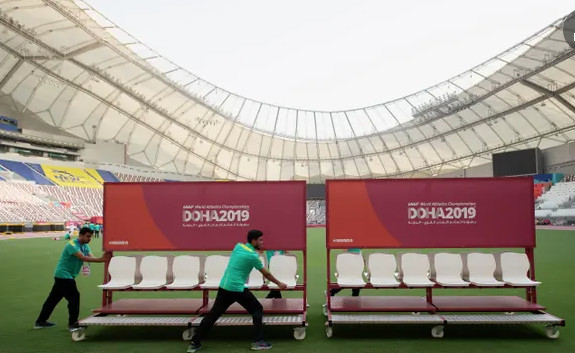
An IAAF spokesperson accepted ticket sales had been “challenging” but said nobody could have foreseen the boycott of Qatar by other gulf states, making it impossible for some fans in the region to watch the championships.
When asked about the possibility of tickets being given away, the spokesperson added: “Surely it is a good thing that communities across Qatar will be getting tickets? We believe it will inspire a whole new generation of fans into the sport.”
More than 1,800 athletes from around 150 countries are expected to take part in the world championships, which will be held in the Middle East for the first time.
However, Doha is not one of the traditional hotbeds of the sport and the event takes place at a time of year when the season is usually over. Nonetheless, the IAAF president, Seb Coe, has insisted that the championships will help track and field expand into new territories.
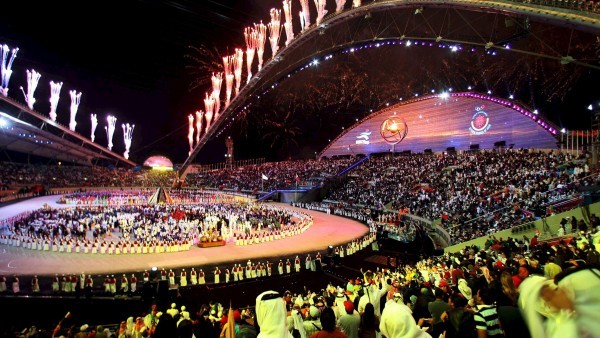
Organisers have promised a raft of innovations for the event, including two miniature cameras in each starting block that will show the first pictures of athletes’ faces in the 100m moments before they hear the starting pistol, and capture the explosion of energy as the athletes leave the blocks.
Login to leave a comment
IAAF World Athletics Championships Doha
The seventeenth edition of the IAAF World Championships is scheduled to be held between 27 September and 6 October 2019 in Doha, Qatar at the renovated multi-purpose Khalifa International Stadium. Doha overcame bids from Eugene, USA, and Barcelona, Spain to be granted the rights to host the 2019 IAAF World Championships in Athletics. Having hosted the IAAF Diamond League, formerly...
more...The IAAF is going to rebrand as World Athletics
The IAAF Council has approved proposals to change the name of the governing body to ‘World Athletics’ and to introduce a new logo.
The Council said the rebrand is designed to more clearly communicate the organisation’s mission and attract a younger audience for the sport. The new identity will be introduced in October after one last edition of the World Championships under the IAAF banner.
The organisation was founded as the International Amateur Athletic Federation in 1912 but changed its name to the International Association of Athletics Federations in 2001 as the sport became more professionalised.“The hope is that our new brand will help attract and engage a new generation of young people to athletics,” said IAAF president Seb Coe. “We have now created a brand that can come to life in the digital world while reflecting the changing nature of the sport. And at the same time bring into focus the athletes, the heroes of our sport.”
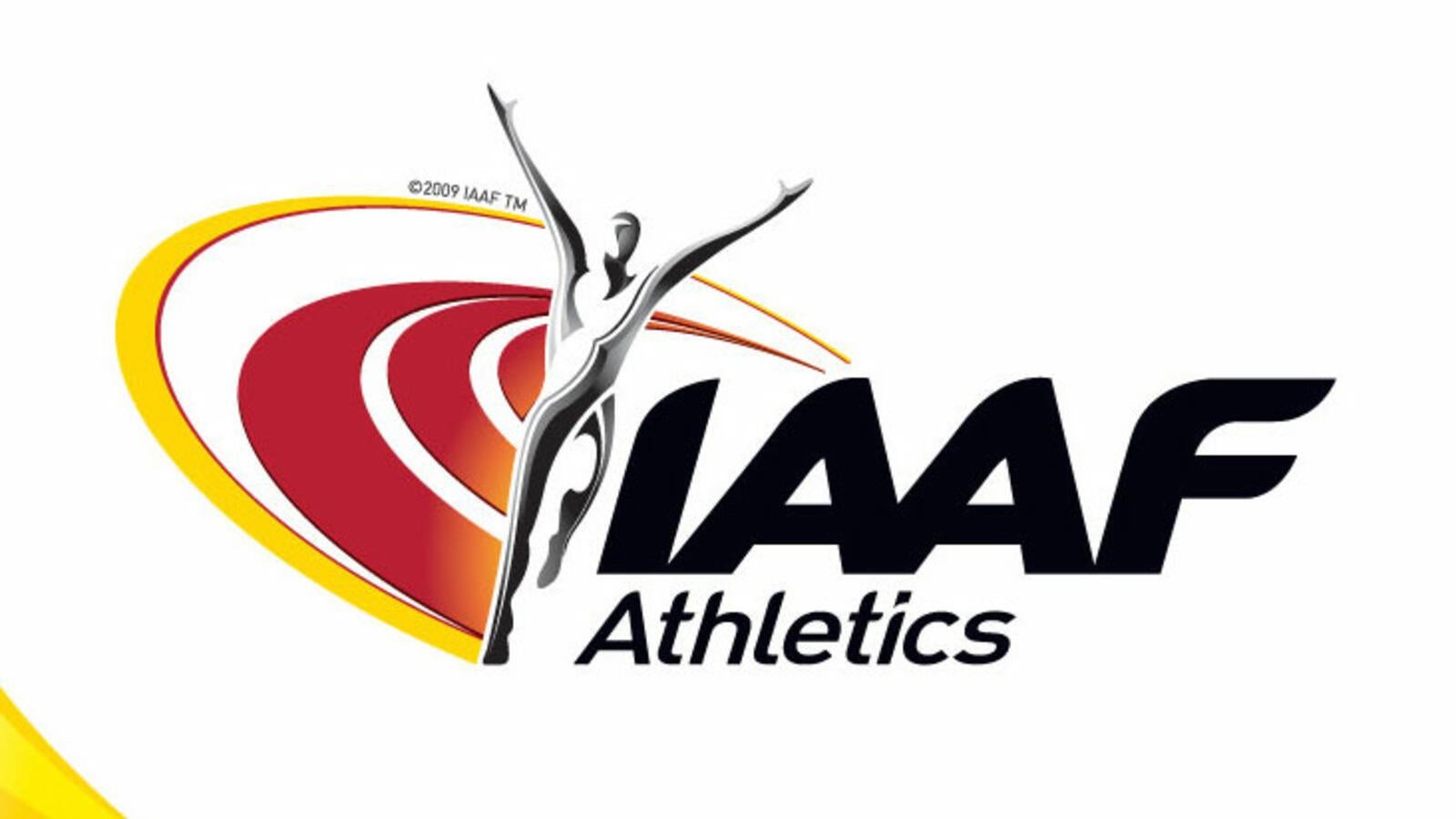
The rebrand comes at a time when IAAF is seeking to draw a line under a wide array of doping and corruption scandals. In May, French prosecutors requested that Lamine Diack, the former president of the organisation stand trial over allegations of corruption linked to the Russian doping scandal.
It was also announced at the IAAF Council Meeting in Monaco that Russia’s ban from international meetings had been extended over ongoing doping concerns.
Russia has been suspended from the sport since 2015, though many athletes have since been allowed to compete as neutrals.
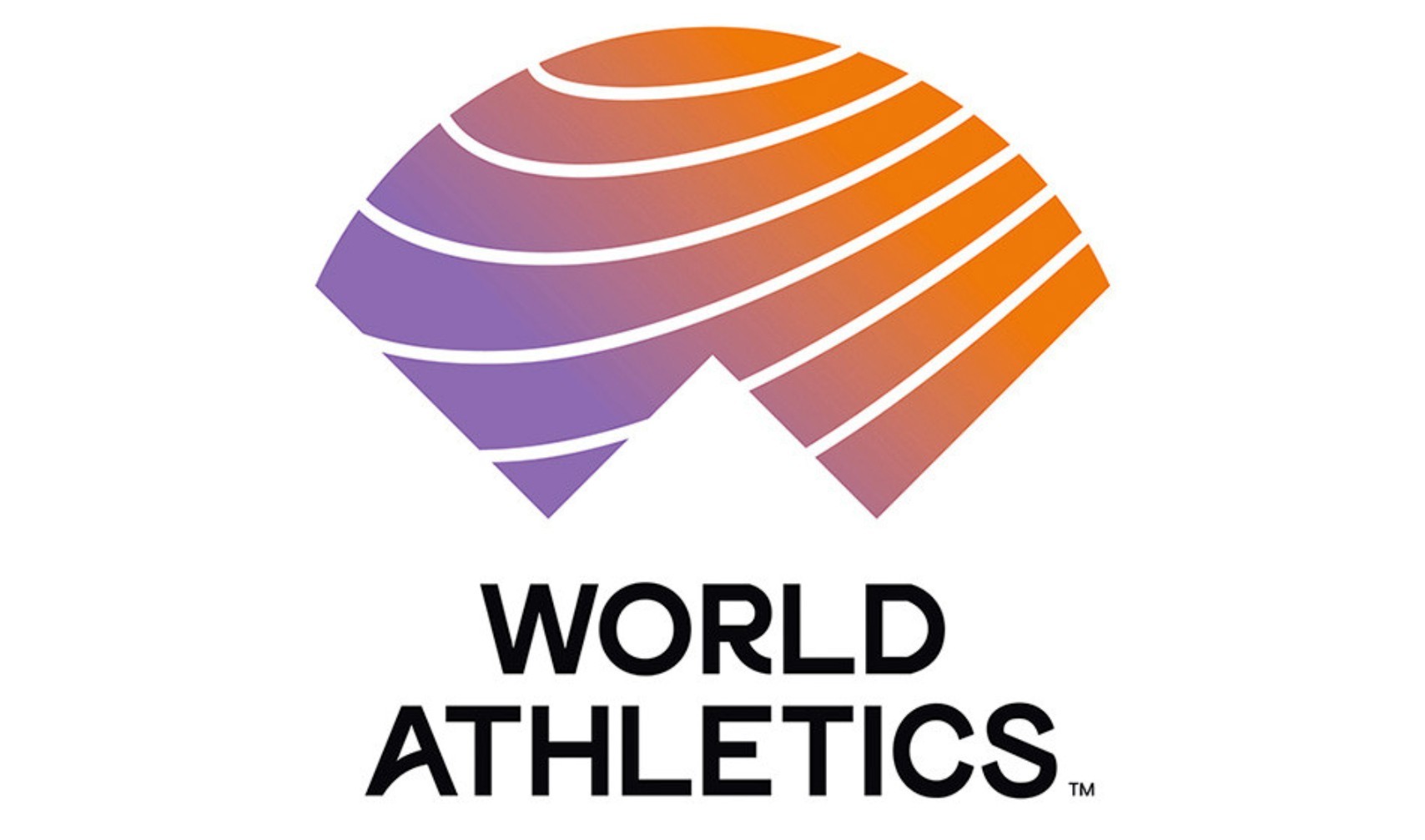
The next vote on the issue is likely to be taken at an IAAF Council meeting on September 23 – just five days before the start of the World Championships in Doha.
Login to leave a comment
IAAF World Athletics Championships Doha
The seventeenth edition of the IAAF World Championships is scheduled to be held between 27 September and 6 October 2019 in Doha, Qatar at the renovated multi-purpose Khalifa International Stadium. Doha overcame bids from Eugene, USA, and Barcelona, Spain to be granted the rights to host the 2019 IAAF World Championships in Athletics. Having hosted the IAAF Diamond League, formerly...
more...The Crown Prince of Denmark is so excited about the upcoming world cross-country championships that he decided to run it
This Saturday is the World Cross-Country Championships in Aarhus, Denmark. Many of the world’s best athletes will be competing, including world half-marathon champion and world 10,000m gold medallist Geoffrey Kamworor in the senior men’s race.
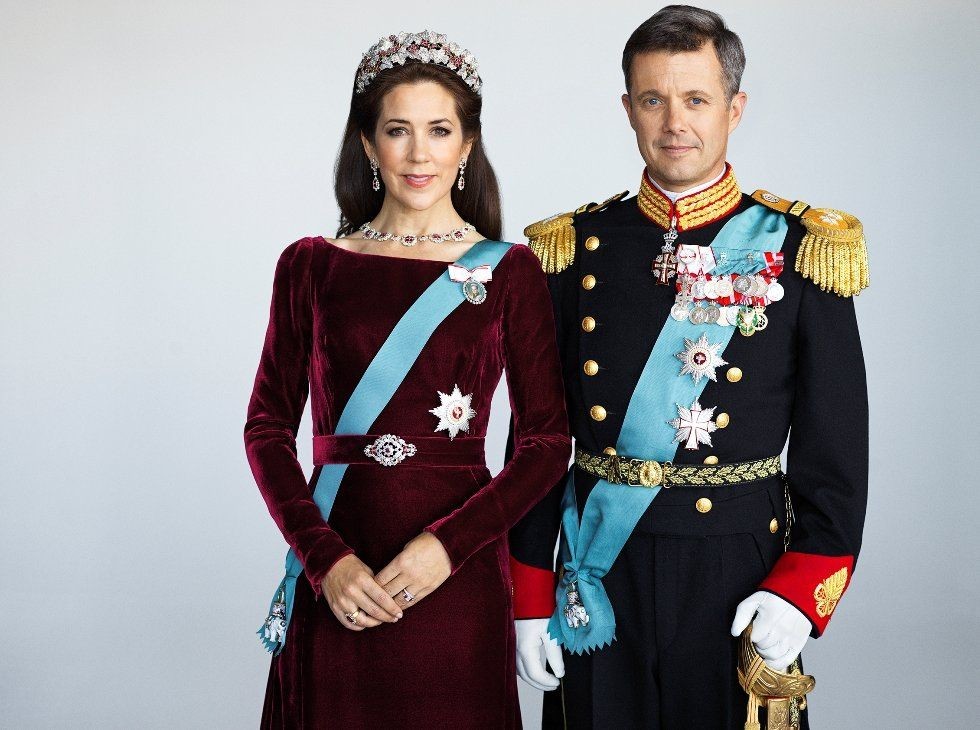
Also running is distance stud Jakob Ingebrigtsen in the U20 men’s race, 5,000m world champion Hellen Obiri in the senior women’s race and world juinor 5,000m champion Beatrice Chebet in the U20 women’s event.
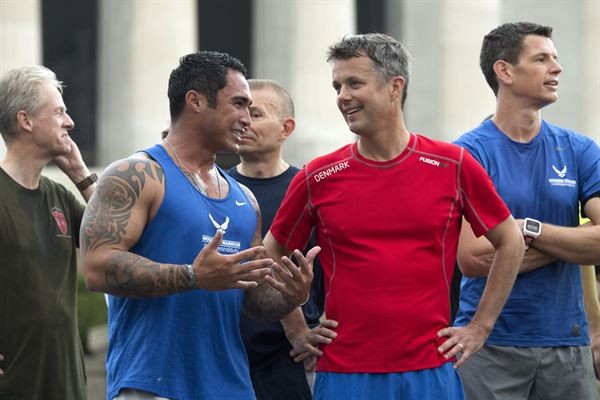
The IAAF president and former Olympic medallist Seb Coe and Frederik, Crown Prince of Denmark, are taking part in the 8K event.
The Crown Prince is an avid runner.
Login to leave a comment
World Athletics Cross Country
Athletes from across the globe will descend on Australia for the World Athletics Cross Country Championships Bathurst 2021. Mount Panorama is better known as the home of Australia’s premier endurance motor race, but in one year from now, it will welcome the world’s best endurance runners for what will be Australia’s first World Athletics Series event in...
more...Should Caster Semenya be forced to lower Testosterone levels to compete in Tokyo?
Caster Semenya is very much in the news lately. We have already published two stories about the new IAAF rule which will require Caster to take testosterone-lowering medication in order to compete on an international level.
Per the report: "The IAAF, will reportedly announce the creation of a new female classification to be known as Athletes with Differences of Sexual Development, which includes those with Hyperandrogenism, such as Semenya.
"From November 1, 2018, athletes who fit into that classification will be forced to undergo testosterone-lowering treatment."
Caster was born with this medical condition. Caster is a South African middle-distance runner and a gold medalist and for sure could easily pass for a man on the outside.
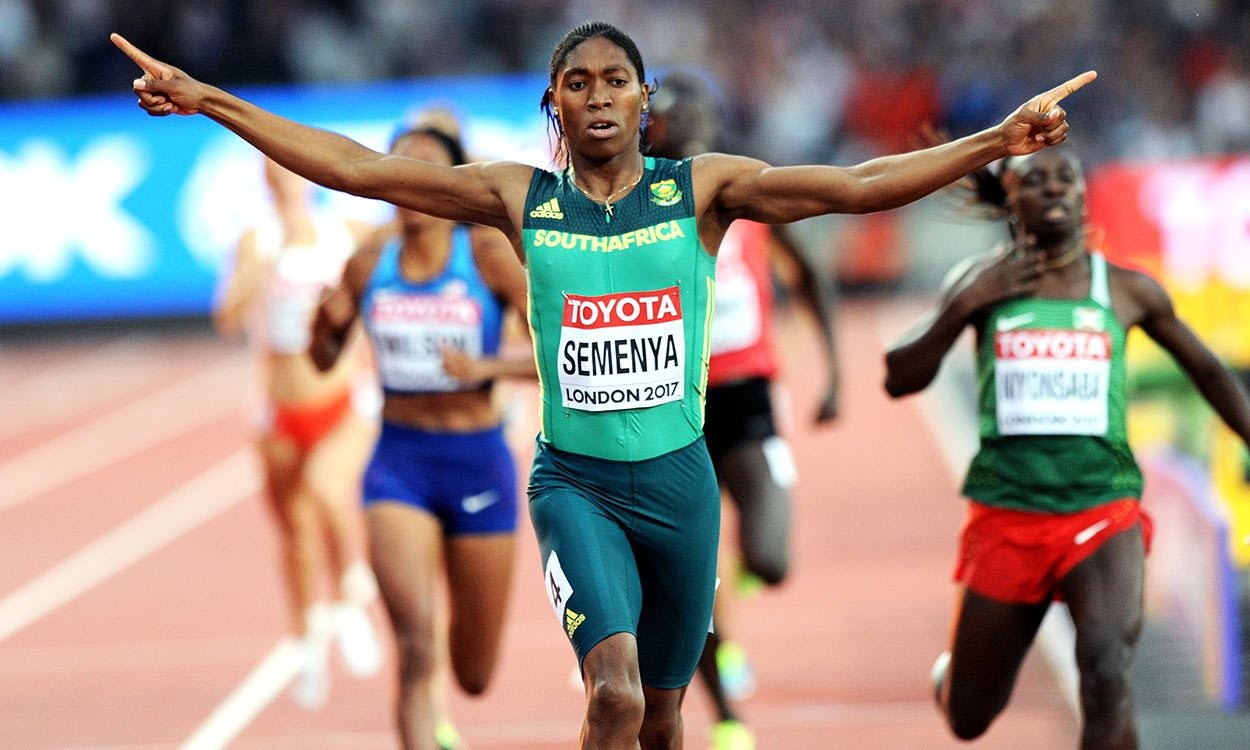
Last August Caster shared this story about her love story with her wife Violet Raseboya in a TV interview. "We met in a restroom in 2007. She was a runner and was being escorted by doping officials.
She thought I was a boy and said 'What is a boy doing in here?'" "I'm not a boy. You think I'm lost? You think I can just walk in here?" It took a while for them to start dating and Caster said it was her that told Violet about her feelings for her.
"We were in denial. She had a past. She had a boyfriend. (She) was trying to deny being in love with a woman" They got married in 2017.
This is a tough situation for the IAAF. Seb Coe just wants the competition to be fair. However, this is a medical condition a person is born with. Penalizing an athlete for a natural trait of her body does not seem right.
by Bob Anderson
Login to leave a comment
Seb Coe may need to make tough decisions that don’t favor Nike, then What?
“No conflict of interest as far as I'm concerned,” says Carla van Kampen in response to Nike naming a building in Seb Coe’s name. “Coe was one of the greatest runners of all time (800/1500),” Carla continued.
“If Coe shows any favoritism towards Nike in the future, well then that's something else. I met Coe a couple of years ago while he was in Rome for the World Race Walking Championships before the Rio Olympics, and he was a class act, so engaged and friendly.”
Bob Anderson, the founder and publisher of Runner’s World for 18 years (1966-1984) and now MBR answered, “I agree, Lord Seb Coe is a class act. But if he needs to make some decisions on matters that does not favor Nike, he needs to be able to do this without Nike retaliating.
"Many years ago when we published that, at the time, Brooks made a better shoe in our shoe issue, Nike retaliated by not attacking RW (since everyone loved our magazine) but Nike attacked me.
"They sent out a press release to all their dealers questioning my integrity and then pulled out one million dollars of advertising.
"They were our largest advertiser but we published the shoe ranking results in the order as our Penn State lab presented them to us. (Nike's action caused the FTC to do an investigation. After a year or so they announced no company was favored unfairly.) What is important now is that the IAAF runs our sport not Nike. However, Nike’s support (just like their support of RW from 1966 to 1980) is very valuable to our sport. It is a fine line.” Bob says.
by Bob Anderson
Login to leave a comment
Sea Coe says the IAAF takes the fight against doping very seriously
Login to leave a comment
Roger Bannister’s achievement transcended sport, let alone athletics says Seb Coe
Login to leave a comment
Seb Coe Hopes Cross Country Will be Added to 2024 Olympics
"The 2024 Olympic Games in Paris would be a fitting time to see the return of cross country to the Olympic programme,” said IAAF President Sebastian Coe, who attended and participated in Sunday’s Cross de Italica in Seville.
Organisers of the IAAF World Cross Country Championships 2019 to be held in Aarhus, Denmark scheduled for 30 March 2019, says they have already promised initiatives to help guide the Championships into new territory. More news about the course will be announced soon.
Login to leave a comment


